





“The day of the shoot with Ben Bowler was very beautiful,” says photographer Julian Kingma. “It was as if all the Buddhist moons had aligned for that very moment.”

Positive thinking is the order of the day. But, according to comedian and broadcaster Arthur Smith, “you’re often better o with a healthy scepticism about the world”.

“The universe isn’t for an educated elite —it can be enjoyed by everyone,” claims broadcaster Mark Thompson. “Simple facts can inspire and wow all ages.”
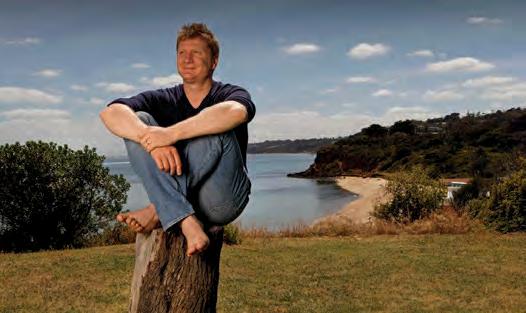


To James Brown, one of our regular columnists, it’s the moment when the biscuit-tin lid is perfectly aligned with the base, and emits a satisfying “phutt” as you press it down. To me, it’s the smell of fresh basil and coriander. Yours?





Such tiny moments of happiness are easily overlooked in favour of the more obvious (flash cars, expensive holidays, big houses, et al), but from my experience the people who get the most out of life have really learned to appreciate the smaller pleasures. So to help get 2013 o to an uplifting start, our health special (p50) includes a roundup of some of the little things that make you smile— as well as some brilliant health secrets that everyone should know. Happy New Year, all! (Unless you’re Arthur Smith, that is, who thinks it’s probably better to be a bit of an Eeyore. Find out why on p90...)








Send us your stories, jokes and letters—if we publish, we pay!
£50 for the star letter, £30 for regular letters and £15 for short extracts.
Ensure submissions are not previously published. Include your name, email, address and daytime phone number with all correspondence. We may edit letters and use them in all print and electronic media. Contributions used become world copyright of Vivat Direct Ltd (t/a Reader’s Digest).
Email readersletters@ readersdigest.co.uk or write to Readers’ Letters, Reader’s Digest, 157 Edgware Road, London W2 2HR £70 for the true stories, anecdotes, jokes in Laugh! and You Couldn’t Make It Up…, and contributions to end-of-article fillers, Travel and Gardening.
Email excerpts@ readersdigest.co.uk or write to Excerpts, Reader’s Digest, 157 Edgware Road, London W2 2HR
We cannot acknowledge or return unpublished items or unsolicited article-length manuscripts. Do not send SAEs. Article-length stories, poetry and cartoons are not requested.


Visit readersdigest.co.uk or write to Reader’s Digest, PO Box 444, Douglas, Isle of Man IM99 3ZF. UK: £42 a year. Republic of Ireland: €74.39 a year. Europe: £50 a year. Rest of the world: £60 a year. Prices include delivery. For Gift Subscriptions contact Customer Services below “I’d
Contact Customer Services for renewals, gifts, address changes, payments, account information and all other enquiries. Phone: 0871 351 1000* Email: customer_ service@readersdigest.co. uk Minicom: 0870 600 1153

Reader’s Digest is available in a talking edition for blind and partially sighted people for £16. For details, phone: 01435 866 102; email: info@tnauk.org.uk, website: tnauk.org.uk. twitter.com/rdigest facebook.com/ readersdigestuk
































Maxed out your credit card during the festive season? Don’t worry, our money expert Jasmine Birtles has some great advice on how to economise again. Listen to her podcast at readersdigest.co.uk/magazine PLUS
There’s still time to enter our 100-Word Story competition (but be quick, the closing date is January 31). All you have to do is write a short story in just 100 words and you could win £1,000. Go to readersdigest.co.uk/magazine for details of how to enter and full terms and conditions.


CHECK OUT our fabulous apps, too!
Go to the iTunes music store, Google Play Store and Amazon to download our magazine app. You’ll also find our ebooks in the iBookstore and Kobo.
Visit our online shop for over 1,000 great books, gifts, jewellery, bargains and more!

ADVERTISING








£30 FOR EACH PUBLISHED LETTER, £15 FOR SHORTER EXTRACTS, £50 FOR THE LETTER OF THE MONTH!
SEE P4 FOR MORE DETAILS

I agree with Ian Price in “The Maverick” that a fourday week leads to the perfect work-life balance. As a teacher who works four days, I think the pupils benefit from a teacher who has time to recharge, even though I have to share my classes.
I recently had to work five days for a few weeks, and I was more tired, more stressed and less productive as a result. I’ve seen similar increases in stress levels from colleagues who normally job-share and have increased their hours temporarily. As for the reduction in pay, I simply live within my means —I’d rather have a smaller house and fewer foreign holidays or things I don’t need in order to enjoy time with family and friends.
However, if the four-day week became the norm, it wouldn’t have to mean lower pay—I’m sure lots of people would prefer to do four longer days rather than five shorter ones. The benefits it brings are excellent, so don’t knock it until you’ve tried it!
Mary Lees, LanarkshireI worked a ten-hour, four-day week when I first went to the US. The advantages were clear —I was less tired at the end of the week and I had more time with my kids. The sta didn’t need time o to go to the doctor or dentist, and if one of them called in sick, they truly were sick!
As a result, the o ce ran smoothly and we all worked well together. Four days a week also cut down on the cost of travel and the time spent commuting.
Anne Gosling, Cornwall
I wanted to back up James Brown’s account of the Rye bonfire procession in “Reasons to Be Cheerful, Part 24”—it’s a truly wonderful spectacle! But he didn’t mention how much money these processions raise for local charities. As a member of the Rotherfield and Mark Cross Bonfire Society, I know how much goes into organising such events, and how much they cost to put on (fund-raising goes on all year).
I’d urge all Sussex residents to support your local societies and safeguard this tradition for future generations.
And, James, Rotherfield
►


Carnival is the best! So put the first Saturday of October in your diary for next year.
Lisa Page, East Sussex
I wholeheartedly agree with Phil Redmond’s comments on education in “If I Ruled the World”. So much time is wasted trying to teach some kids subjects they’ll never grasp or use. Schools should concentrate on functional skills instead of worrying about meeting targets.
Bernadette Smith, Northampton
I wish Phil Redmond did rule the world! I’m totally behind his thoughts on enforcing a single agreed fee on any loan. Borrowers should know what they’re supposed to be paying

without being charged far more than they borrowed in the first place.
I’m currently paying £10,000 for a £2,800 gas boiler. I know I was naive when I took out the loan, but if I’d been told the exact repayment figure I’d never have gone ahead.
Rick Harding, Cambridgeshire
Eben Alexander’s account of his near-death experience in your Books Section was intriguing. The fact that he’s a neurosurgeon adds a lot of credibility to his account, and it’s nice to believe that there’s a theory between either God or complete nonexistence. I look forward to reading his book.
John Edlington, South Yorkshire

● “…When the day broke, my uncle realised my aunt wore her nightdress upside-down and begun laughing at her. But my aunt also noticed my uncle’s fry was on the behind…”
● “…Charity bags are great—we use them as bin liners. Now that’s recycling!…”
● “…Is it time David Cameron took out his nutcracker and smashed red tape and regulation for our industry?…”
● “…My mum bought Ecuadorian bananas. Should I be mad?…”
● “…Every time I hear that foul, disgusting word ‘exercise’, I wash my mouth out with chocolate…”
● “…Is this the first sign of an invasion by the inhabitants of Planet Zog, who begin by stealing and destroying our language, as a prelude to taking over our brains, and ultimately the whole world?…”

Jasmine Birtles’ Money item about the e ect of the EU Gender Directive on insurance premiums was excellent. I always thought that risk assessment took into consideration all material and behavioural factors—this has worked very well over the years. But now, it seems, market forces will no longer apply. Sadly, any premium adjustment will only take an upward direction, and result in more tax revenue.
Gaston Dezart, DevonI have to take issue with your reference to the Screen Machine in “Best of British: Cinemas”. You say, “It’s got
88 comfy seats and air con (would you need that in the Highlands?).” Yes, of course you would! it’s a misconception that air con only cools—as the name implies, it conditions the air and provides heating as well as cooling.
Keith Sutton, Buckinghamshire

I loved your “I Remember” article on Alice Cooper. I really admire the work he’s done for charity, and how he’s substituted golf for his problems with alcohol. Indeed, inspired by this, I’m using exercise to alleviate depression, and it’s working. We need more celebrities like him.
I’m such a fan that I recently went to a fancy-dress party dressed as Alice, although he’d probably sue me if he saw the above photograph!
Joanne Campbell, County Antrim
Kim Willis @LunacyOfInk
Thank you @jamesjamesbrown’s son for the sweet gift idea in @rdigest—framed list of all things parents love. Genius. And free!

Professor Julian Savulescu’s Maverick article about “designer babies”
● As a 72-year-old Christian, my opinion probably wouldn’t count anyway, but isn’t it dangerous to “play God”? And what happened to freedom of choice?
Elizabeth Moore, Devon
● Julian Savulescu describes his vision as “voluntary”, but also a “moral obligation”, then follows up with the rather chilling claim that this “doesn’t necessarily imply that people should be coerced”. That’s OK then!
Tim Coles, Bedfordshire
● When we think we’ve overcome one hurdle, we often find ourselves confronted with a dozen more threatening ones. The professor clearly doesn’t know what he’s getting us into!
Mark
Taylor,Kent



Author and BBC2 Review
Show critic
Natalie Haynes on the new releases
Quartet Most first-time directors would struggle to marshal a cast including Tom Courtenay, Maggie Smith, Michael Gambon and Billy Connolly (see our interview on page 36). But then most first-time directors aren’t Dustin Ho man.
Set in a home for ageing musicians, Quartet is a warm, superannuated version of getting the band back together.
Seasoned thesps belt it out in Quartet

can the old gang put their di erences aside for the fundraising gala?
YOUR SHORT, SHARP GUIDE TO JANUARY way to do it.
If you’re looking for gritty realism about the latter years of life, this film won’t provide it. But if you want to start the year feeling happy not sad, I can’t think of a more musical way to do it.
Reggie (Courtenay) is appalled when his ex-wife Jean (Maggie Smith) moves in. But

Django Unchained

(Inglourious and I’ve been waiting
It’s almost four years since the last Tarantino film Inglourious Basterds), and I’ve been waiting for this one pretty much constantly since then.
The former bad boy of cinema is now almost 50, but shows no sign of losing his youthful edge.
Jamie Foxx stars as Django, a slaveturned-bounty hunter who must rescue his wife from a vicious plantation owner. Leonardo DiCaprio, Samuel L Jackson and Christoph Waltz make up the mesmerising ensemble cast, and it wouldn’t be a Tarantino film without an ageing

film star getting a career reboot: this time, it’s Don Johnson.
Dredd Fun and violent comicbook adaptation. Looper Clever, time-travelling treat with Joseph Gordon-Levitt.
iRobot Roomba 660, £419

Technology expert and Answer Me This! podcaster Olly Mann reveals the latest must-haves
According to The Jetsons, we should all have robot maids by now. Well, this one won’t serve you dinner, but it does vacuum —under sofas, along skirting boards, around corners— and even docks itself to charge, all while you’re sipping a margarita with your feet up. Sadly it’s not smart enough to replace your humanoperated Hoover entirely (it misses bits and gets caught on wires), but it’s always ready to do additional housework, which is more than you can say for me.
Samsung Galaxy Camera, £399.95
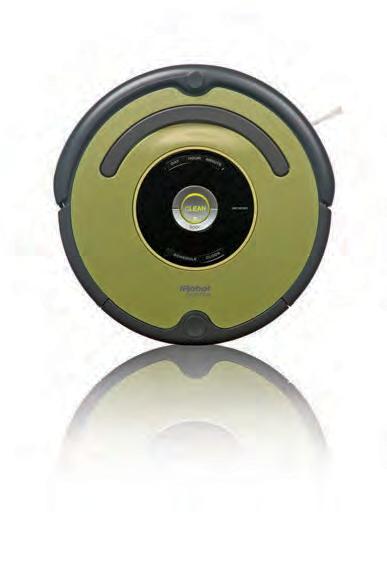
It’s not a phone that looks like a camera— it’s a camera that looks like a phone that looks likes a camera. Got it? For casual snappers, it’s a winning combination: a more robust lens than you’ll find on any smartphone (21x optical zoom) combined with smartphone-esque features you don’t normally get on a camera (4G, voice control, upload to Facebook). Takes a while to master, but gives great pics.
OUT… Kindle
Paperwhite, from £109 The latest incarnation of Amazon’s mighty e-reader fits comfortably in one hand, is backlit for bedtime reading, and the battery lasts an age. Superb. Beurer Monogram Underblanket, £89.99 My girlfriend likes being toasty in bed; I like sticking my feet out from under the covers. This solution works perfectly: a double blanket featuring four di erent heat zones.



Think the only half-decent rock opera. Updated. The term “guilty pleasures” is a hateful one that implies certain music is too light or shallow for one’s lofty tastes, while mumbling middle-aged rock bores are to be venerated.
But the 1978 original of Je Wayne’s The War of the Worlds, two hours of joyous sci-fi bombast, was enjoyed in secret in many a hipster’s bedroom. Liam Neeson reprises the Richard Burton role, and the dreaded Gary Barlow is also in evidence. But you may still get a frisson of pleasure from the sheer silliness of it all and a clutch of show-stopping tunes.
Adam Ant is the Blueblack Hussar in Marrying the Gunner’s Daughter by Adam Ant.
Think a darker dandy highwayman.

Over the last few years, Britain seems to have realised what a “national treasure” (oh dear) the former Stuart Goddard is. His 1980s output sounds more wonderful with hindsight, and his candour over his mental illness has been admirable. This crazy, brilliant, unwieldily titled comeback is long overdue, and marries his vintage swagger with a contemporary edge.


Holy Fire by Foals Think Radiohead, Muse and Bloc Party having a frat-party dust-up. There’s an awful lot of speccy Home Counties guitar rock these days, mostly concerned with the Afghan war or the financial crisis rather than booze and football. Very successful it can be too, as Alt J have shown. Foals have been ploughing this furrow longer than most, but their new record sees them adding a very welcome punch and beefiness to their cerebral sound. Put simply, it rocks.

Australian Open, Melbourne
January 14–27 After finally breaking his long-overcooked duck in the US Open, Andy Murray will be looking to pancake that duck with the plum sauce of a second major title. Federer, at 31, is raging majestically against the dying of his sporting light, as if he can’t abide the thought of the universe being deprived of the planet-stopping beauty of his tennis. Last year’s champ Djokovic remains Murray’s biggest obstacle.
In the women’s draw, if Serena Williams is fit, the rest might as well save themselves a fortnight of running around in the Australian heat and go to a museum instead, or learn to play the kazoo, or do some scientific research

Susannah Harrison, 36, doctor
WATCHING:
ESPNcricinfo cricket blogger, broadcaster and stand-up Andy Zaltzman previews the best of the month’s action


into the number of whales who have attempted to mate with nuclear submarines.
Maxifuel Super Sixes indoor hockey finals, Wembley Arena, January 27
When I was a boy, playing hockey indoors was a heinous crime punishable by being sent to bed early. In my house, at least. Now, the authorities seem to be actively encouraging it. The Maxifuel Super Sixes prove hauntingly how morality is a fluid and subjective concept.
January 10 London Tube’s 150th anniversary.
January 26–27 RSPB Big Garden Birdwatch.
January 28 Bubble Wrap Appreciation Day (see “Life’s Little Pleasures”, p58)
Peppa Pig. I have two small kids, so I watch what they watch. Peppa loves muddy puddles, and so do they. She’s a bad influence!
LISTENING: International Velvet, Catatonia. One from my student days. My housemates were convinced we lived in the same street as the guitarist.
ONLINE: coolest-birthdaycakes.com
It once helped me make an In the Night Garden gazebo, using sticks of rock for pillars.
READING:
Signal Boy by Robert Adams. The autobiography of a Second World War navy veteran. He has a vivid memory. ■










¶ Studying one of our wedding photos, my sixyear-old asked, “Did you marry Dad because he was good looking?”
“Not really,” I replied.
“Did you marry him for his money?”
“Definitely not,” I said. “He didn’t have any.”
My son pondered for a few minutes before asking, “Did you just feel sorry for him?”
Linda Watson, Edinburgh
¶ I recently turned 40, which has prompted me to wade through a list of great books I either haven’t read or was forced to read too young.
One such novel is Anna Karenina. “You know,” I said to my wife, “I thought I’d be in over my head, but I’m really enjoying Tolstoy.”
She gave me puzzled nod. I later found out that she thought I’d said, “Toy Story.”
Cli
Jones, Maidenhead¶ The post o ce I’ve used for five years has always had a really grumpy counter assistant. One day, I said
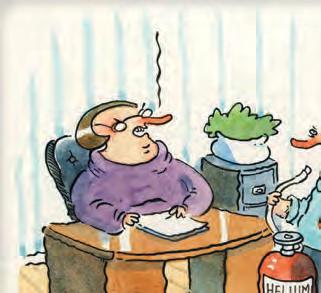









“How dare you raise your voice to me!”

¶ I WAS DRIVING ALONG THE NORTH-DEVON LINK ROAD when I noticed flashing blue lights behind me. “I clocked your vehicle at 64mph,” the polite young police o cer told me after I’d pulled over.
“I’m so sorry,” I said. “It’s just that the road seemed clear. The visibility was good. I think I probably…”
“And how would you have reacted, sir, if Mister Fog had suddenly appeared?” interrupted the o cer.
Annoyed at his patronising manner, I replied, “I suppose I would’ve applied Mr Brake and summoned up Mr and Mrs Headlight, together if necessary with Ms Foglight.”
Enunciating very clearly—and managing to keep a straight face—the o cer repeated, “How would you have reacted if mist…or…fog had suddenly appeared?”
Peter Melville, Cornwall
hello as usual when returning a parcel, but he ignored me. In irritation, I turned to his friendly colleague while his back was turned, and vented my anger.
“I sometimes drive to the post o ce on the other side of town to avoid seeing his face,” I moaned. “Wouldn’t it be awful to be married to him?”
“I am,” said the lady. “He’s my husband.”
Joanna Reilly, Blackpool
¶ I got home to find a note from my postman: “Sorry we missed you. Your Amazon delivery is in a safe place.”
It was under the doormat.
Tauheed Butt, London
¶ We’ve had a lot of campers on our island this year, and I was explaining to my grandson that the letters on their number plates indicated their country of origin.
When a car turned up at the campsite with NL on its plate,
¶ A FRIEND OF MINE teaches in a secondary school, and in one lesson he had to introduce a rather troublesome class to Shakespeare’s sonnets.
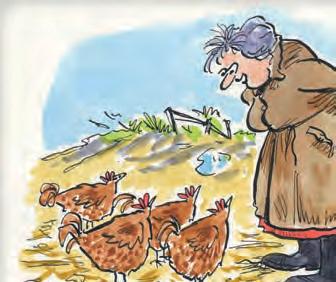

“Which of you would like to be on MasterChef

I pointed out to him, “They’re from the Netherlands.”
As the new arrivals were pitching their tent, my grandson wandered over to them and said, “You must know Peter Pan. Does he live near you?”
excerpts@ readers digest.co.uk OR
facebook. com/readers digestuk
Tom Mannix, Isle of Eriskay
¶ On reaching work one day, my sister-in-law couldn’t remember if she’d unplugged the iron. So she rang my laid-back brother. “Could you unplug the iron if I left it plugged in?” she said. “Sure,” he replied. Then he asked, “What does it look like?”
June Lambert, Lancashire
With some di culty, he managed to set them a task: discussing a poem in small groups. Amid the indi erence, he noticed a couple of lads at the back in animated conversation.
“Sir, could you settle this for us?” one of the boys asked when he approached.
“Of course,” he replied. “What is it?”
“Sir, what do you think would come out on top in a fight between a Jack Russell and a monkey?”
Roll on the bell.
David Watson, Lanarkshire ■



12 shelfmark n A dirty shelf B book-location device C bookend


As the world marks the 400th anniversary of the death of Sir Thomas Bodley, founder of the Bodleian Library in Oxford, on January 28, we’re testing your familiarity with all things bookrelated. Answer A, B or C below.
1 octavo n A library
shelf B small book size
C noise in library
2 Boolean (boo-lee-uhn) adj A related to searching for books B specialised
C computerised
3 monograph n A lost volume B very long book
C book on a single subject
4 periodical n
A regularly published magazine B occasional article C out-of-print book
5 carrel n

13 bibliography n book obsession history of books

A reading cubicle B monk librarian C library door
6 thesaurus n A silence
notice B library accountant
C book of related words
7 abstract n A page turner B book summary
C broken book spine
8 folio n A library
assistant B big book size
C illustrated book
9 ISBN n A Irregular Sorting Book Nomination
B International Standard
Book Number C Individual
Sort of Book Notion
10 microfiche n
A turned-down corner
B tiny book C collection of photographed pages
11 glossary n A library
stairs
B valuable book
C list of specialised words
C list of books consulted in writing a book
14 quarto n
A mid-sized book library safe librarian’s desk
15 Dewey n
A book mould B library
classification system
C leather binding
From the abbreviation
LOL—meaning “laugh out loud”—plus libertarian. The word is used to describe someone whose libertarian views are so extreme that they’re ludicrous.
RD Rating Useful? 4/10
Likeable? 7/10

9–11 getting there 12–13 impressive 14–15 word-power wizard!
1 octavo B
small book size. “Octavo books are made by folding a page three times to produce eight pages.” Latin octavus (eighth).
2 Boolean A describes a way of searching for books. Named after George Boole, a 19th-century British mathematician.

3 monograph C book on a single subject. “Monographs are short.” Greek monos (only) and graphein (write).
4 periodical—A regularly published magazine. Greek periodos (orbit).
5 carrel A reading cubicle. “The library is lined with carrels.” Medieval Latin carola.
6 thesaurus—C book of related words. Greek thesauros (treasure).
7 abstract B book summary. Latin abstractus (drawn).
8 folio B
big book size. “Folio books are made from folding a leaf of paper once to make two pages.” Latin folium (leaf).


Dynamo comes from the ancient Greek dynamis, meaning “force” or “power”. In the 19th century, it was adapted to produce the word dynamo, an abbreviation of dynamo-electric machine—a contraption that converts mechanical energy into electric energy, as in a bicycle dynamo. Later that same century, the word was transferred to the human world, so that dynamo came to mean a particularly energetic person.
9 ISBN B International Standard Book Number. “Every book has a unique ISBN.”
10 microfiche—C collection of photographed pages. Greek micros (small) and French fiche (slip of paper).
11 glossary C list of specialised words. Latin glossarium.
12 shelfmark—B book-location device. “The shelfmark is usually
Play WP online: go to readersdigest. co.uk/wordpower
found at the bottom of the book’s spine.”
13 bibliography C list of books consulted in writing a book. Latin bibliographia
14 quarto A mid-sized book. “Quarto books are made by folding a sheet twice to produce four pages.” Latin quartus (fourth).
15 Dewey B library classification system. “Dewey is a decimal system.” Named after Melville Dewey, the American inventor of the system. n

Life may feel busier than ever, but with Reader’s Digest car insurance all you have to do is pick up the phone to one of our UK based advisors to get things moving. The times have changed, but we haven’t forgotten that simple is sometimes better.
our customers on an ever changing world for decades.
...there’ll be water for all, says Gary Rimmer



The Search for ExtraTerrestrial Genomes (SET-G) is a Nasasupported initiative to equip unmanned space missions with instruments that can test for alien DNA in soil. But while researchers hope to see such equipment on the next Mars mission in 2018, one of the (many) challenges is to ensure that samples from space are uncontaminated.
Bio-entrepreneur Craig Venter, an investor in SET-G who believes alien genomes exist, speculates that alien DNA could be brought back sheathed in a “biological teleporter” of man-made synthetic cells for study and cloning.


“Lifelogging” is a growing internet phenomenon whereby you record every moment of your life. You can use memoto, a new lapel camera that twice a minute records a “geotagged” image of where you are and what you’re doing. But more obviously valuable is Body 2.0, based on the idea that good health can be maintained by providing a continuous feedback of our vital signs through a datalink to our doctors. By 2040, our heart rate, blood pressure, hormone levels and more might routinely be transmitted by personalised online medical implants.


The UN estimates that, by 2030, demand for fresh water will exceed supply by 30%. Drinking and washing aside, the world consumes vast amounts of “virtual water”: ten litres to make a sheet of A4 paper; 650 for a bottle of wine; 7,000 for a pound of mince. Conventional sea-water desalination is ine cient— energy-intensive and, due to the salt, highly polluting. But new wonder material graphene may be the answer. Researchers think these one-atom-thick sheets of carbon could be fabricated with nanopores small enough to allow water molecules through but not salt—a harmless filter for use anywhere. ■

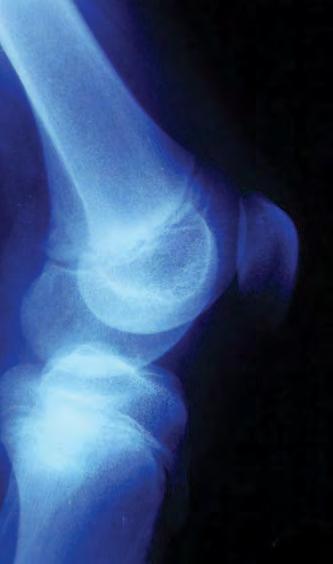






Small ship discovery cruising is a wonderful way to see some of the great cities and monuments of the world as your ship is small enough to reach out-of-the-way ports yet large enough to make light work of crossing oceans. On a river cruise, you’ll experience a holiday which allows you to enjoy elegant surroundings as you sail right through the heart of a destination and disembark daily to explore historic towns and landmarks. For a full range of enticing cruise holiday ideas and plenty of inspiration visit readersdigest.co.uk/holidays
All cruises now available with special savings.
Cruises start from £849 per person. To save up to £240 on a Voyages of Discovery cruise aboard MV Voyager call 0843 316 1665


River cruises start from £1139 per person. To save up to £80 per couple on a river cruise with Travelsphere call 0844 318 8142
Cruises start from £1495 per person. To save up to £330 on a Swan Hellenic cruise aboard MV Minerva call
0843 316 1701

With protest groups unfurling their banners and headlines screaming blue murder, why is corporation tax stirring up such debate?
It’s the tax paid by companies on their net profits. The tax was first introduced by the Finance Act of 1965—before then, companies were charged income tax.
The tax is payable by any company—small, medium-sized, or multinational. The current rate is 24 per cent for companies with profits over £1.5m, and 20 per cent for companies with profits no greater than £300,000. For companies with profits in between those two levels, there’s a sliding tax scale known as marginal relief. All payments go into the central tax pot for public spending, or to pay o the national debt.
Because so many massively successful companies are paying so little corporation tax. There’s no suggestion that they’re behaving illegally but, through corporation-taxavoidance schemes, they’re paying sums dwarfed by their massive income.
Facebook, the social-network company, earned £175m in the UK in 2011, but only paid £238,000 in corporation tax. Its avoidance scheme is a widespread one—it diverted its British earnings to its European base in Ireland, where company taxes are that much lower.
Google paid £6m corporation tax on a turnover of £395m in the same period. It also diverts its profits through Ireland. The Irish route was used by Apple as well, which paid less than two per cent tax on all its overseas earnings—£445m on an income of more than £23bn.


Starbucks*, the co ee company, has paid only £8m in corporation tax in the last 14 years, despite receiving £3bn in sales. It has cut its corporation tax through clever-but-legal accounting, which has seen the company report continued losses. Because corporation tax is only levied on profits, the Starbucks tax bill is extremely low.
Also on the list are three of Britain’s largest water companies. In their latest financial reports, Anglian Water and Thames Water paid no corporation tax after making a combined operating profit of over £1.1bn. This year, Yorkshire Water made an operating profit of £303m, but only paid £2.9m in corporation tax.
* At time of going to press Starbucks said it was reviewing its tax approach in the UK





Are there no laws preventing this sort of behaviour?
Not at the moment. The Finance Acts of 2004 and 2005 closed a number of tax loopholes and demanded that those promoting some tax-avoidance schemes must disclose those schemes. But there’s little to stop companies juggling their profits and losses in di erent countries in order to minimise the amount of corporation tax paid.


Vodafone feels the heat of protest group UK Uncut
£70bn
The amount that tax avoidance is estimated to cost
the UK economy each year
Is there nothing that can be done to increase the corporation tax paid by companies like these?
The chancellor George Osborne has said he’s keen to make the tax
more e ective, but little has happened so far. The di culty is making a global company pay its taxes in your own country; if you set them too high, they’ll shift operations to a country with a lower tax regime. Some in the EU have floated a “common consolidated tax base”, which would see member states tax an agreed share of a global company’s profits. But both Britain and Germany have been reluctant to introduce such an idea.

Other suggestions include legislation demanding that profits should be directly related to sales in individual countries, rather than shifting profits and losses across borders to countries with more beneficial tax structures. But nothing concrete has been decided upon. ■
Charlie Mullins is founder of the UK’s biggest independent plumbing company Pimlico Plumbers. He’s known for his regular TV appearances, celebrity clients, and outspoken belief that young people should be given a chance to develop their skills. He’s also a patron of the Prince’s Trust. as catching a train. All this
I’d change the banking system. Bankers are crooks in suits. I’d stop them ripping people o while pocketing big bonuses. I’d make them accountable to their customers and, if they took liberties with other people’s money, they’d be sacked and prosecuted.
I’ve never met my bank manager and I don’t intend to. I say, “The only thing you can do for my business is to lower your charges.” But does he ever do it? No, of course not.
I’d license all tradespeople. They’d have to wear a uniform, ensure their vehicles had company information on the sides, and also carry ID. A tidy tradesperson equals a tidy job. It would mean any tradesperson would have to invest in the business and raise




standards across the board. It would also eliminate the cowboys who are killing our economy. And anyone paying or accepting cash should be fined—it’s no better than shoplifting.

I’d make it easier to catch a flight. It should be as simple as catching a train. All this nonsense about arriving two or three hours before you take o , standing in queues for hours and then finding out the flight is delayed but, don’t worry, here’s a £5 voucher for a hamburger —well, it’s not a practical system for the world we live in today. We need security, but how di cult is it to walk through a machine?
If I were to treat my customers the way the airlines treat their passengers, I wouldn’t have any left.
I’d put all school and college leavers into apprenticeships. The government would pay for them using money put aside for benefits. After three years, everyone’s a winner: the apprentice is in qualified work and starts paying taxes, while the employer has got the right person. It would get rid of
youth unemployment and you’d have bundles of dosh saved because you wouldn’t be spending it on cutting crime or on borstal and prison—it’s the lack of a job that makes youngsters cause trouble. If the government brought in that financially viable scheme, I’d take on another 20 apprentices tomorrow. My apprenticeship was the best thing I ever did. I was told, “You’ll never be out of work and you’ll earn lots of money,” and at least one of those is true—I’ve still got a job!
I’d eliminate prejudice. We need to take people as they are—who cares about their background? When we employ people, we aren’t bothered about their age, gender or religion. We’re concerned about whether they can do the job. My PA is about 75—he had to retire from his previous job when he was 66, but when he sent in his CV, I thought, He’s got a bit going for him—and his age didn’t come into it. And we employed a chap called Buster to wash our vans when he was 97. He’s just passed away, aged 104. If someone can do the job and you’re happy with that, and they’re happy, then that’s it—you keep it going.

The problem with common sense is that it ain’t that common ‘‘ ’’
I’d make university worthwhile. We’ve had people apply to us with degrees in windsurfing! I’d make a degree entitled “Common Sense”. The problem with common sense is that it ain’t that common. I like someone to tell me what they want and how much it’s going to cost me. That way, I can have a yes or no for them in 30 seconds.
I’d ban Alan Sugar from the telly. He sends a load of halfwits out onto the streets to do stupid tasks, and then humiliates them. It’s got nothing to do with the real workplace. It’s a terrible message for youngsters, and makes them fearful of employment. They need to know that work is rewarding and that you can have a laugh.
Charlie features in new series
Peter Jones Meets, airing on BBC Two this month
I’d knock down council estates and build proper housing. Houses weren’t supposed to go up in the sky; they should be on the ground. Not much good comes out of council estates; they breed discontent and crime. I grew up in one, and it was the worst time of my life. I couldn’t wait to get away—but a lot of people only leave there in a box. And that’s just cruel. ■
As told to Caroline Hutton
Why are we in such a hurry, asks James Brown, when there’s so much adventure to be had in slow travel?
There are an awful lot of things I only know anything about because of what I’ve seen in films. Sleeper trains are one of them.
When I was a reckless, impatient 21-year-old music writer, helicopters were another. I’d frequently abuse my NME Amex card to get from New York’s JFK to Manhattan by chopper, imagining I was in Apocalypse Now.
But nowadays I’d rather find a sleeper train. Back then, I wanted to get everywhere faster; now I’m happy to slow down. Which is how I ended up on the Caledonian Sleeper on a Friday night travelling to a wedding in Angus, east Scotland.
If you believe in movies—which I do—sleeper trains are one of the great locations. Fights, chases, romances and high-stakes poker games are all started on them. Mysterious, attractive women invite you to sit in panelled dining cars, drawing you into adventures and plots that carry you across the land.
If you’re a lady, handsome-butflustered male strangers step into
your carriage uninvited and put their fingers to their lips to request silence as heavy-set henchmen stamp by in the corridor. According to Hollywood, the world of the sleeper is unpredictable, daring and sophisticated.
Unpredictable, yes. Ten minutes north of Euston, London, the engine blew, and I spent the first hour with my cabin illuminated by the platform light of an overground Tube station. It gave me time to explore—toilets at one end of the carriage, lounge at the other. But the wait wasn’t any longer than the wait between “Boarding” and “Last call” at a departure lounge. Short-haul flights have become such a pain in the backside: 60 minutes in the air bookended by hours trapped in a shopping centre.
The sleeper train, by comparison, has an air of mystery about it. At Euston station it really felt like the train was going on a big journey. My carriage wasn’t big enough for Bond and a baddie to have a fight, or Paul Newman and Robert Shaw to play cards. But it was the movement that was important. Once they’d replaced the engine, the train passed out of London and up to Preston, Glasgow and beyond. I fell asleep knowing I’d wake up in a place where any tiny strip of grass between railway
and sea could be called a golf course, and mountains weren’t molehills with publicists.
At breakfast time, the no-nonsense ladies who run the line tapped on my door and woke me with tea, and I lumbered into the dining car to catch the fantastic view of Lunan Bay, which announced our arrival at Montrose.
This is the ultimate appeal. The sleeper takes you to a place miles



from the noise and clutter of the city. It transports you from one environment to another while you’re flat out. People do a lot of strenuous things to change the way they feel, but here I was trading traffic, litter and dirt for truly spectacular beauty. While I was asleep.


For the wedding, I stayed 20 minutes out of Montrose at a large mansion house, The Burn in Glenesk, set in majestic grounds with a salmon river charging through it and red squirrels darting around the trees. Like a child at Christmas, it was difficult to know where to start: with the woods; the walks; the putting green; the mountains; or the castles? Run by two helpful former British Army officers, The Burn is part of Goodenough College. (It’s not a hotel, but it didn’t scream
PRIVATE: GET OFF OUR LAND either.)
Back on the tracks, anyone can take the Caledonian Sleeper— they do great bargains if you can book three months in advance—and the experience does feel other-worldly without being packaged as retro. The train is functional ►
The journey is romantic because there’s an air of excitement among those travelling ‘‘ ’’
(mostly), but the journey is romantic because there’s an air of excitement among those travelling, and a sense of pride in those working on it.
At 80 miles an hour, you’re spared the shocking, shuddering impact that occurs when high-speed trains pass. There’s enough journey after dawn to suck in the outstanding scenery. And you really can go from London to Scotland and back and have a good time in just a weekend.
On my return I looked out into the last field in Hertfordshire at a foal breathlessly racing around, the steward delivered my morning tea on time, and I began to wonder if I could circumnavigate the whole world by train. n
James, founder of Loaded magazine, now edits Sabotage Times—an online magazine with the motto: “We can’t concentrate, why should you?” You can follow James on Twitter @jamesjamesbrown.
At 91, Ernest Witt has the distinction of being our oldest ever 100-word-story contributor! His tale was one of thousands submitted to last year’s contest. We’ll be featuring a commended story in the magazine every month. Visit readersdigest.co.uk/ magazine for details of this year’s contest.

Submitted by Ernest Witt, Leeds
Running for shelter from German bombs during dockland air-raids. His 21st birthday spent guarding the troopship in Durban harbour. Stung on the chest by a black scorpion, believed—wrongly, thank goodness—to be fatal. The sight of his future parents-in-law at his first meeting collecting his escaped fishing maggots from their new deep-pile carpet. The frustration of losing, after a long battle, his first salmon. Winning the cruise ship’s darts tournament —the other three competitors did not benefit from the ship’s instability.
Despite all these memories, he could not come up with a plot for a 100-word story.
Ernest says: “I started writing 80 years ago at school, and only recently started again at a creative writing group, which coincided with your competition. Unless, that is, you count my wartime letters from the Middle East during the war to a friend in the Women’s Auxiliary Air Force. In one of them, I warned her not to expect it to be a longterm relationship (we were married for 61 years).”
Ernest will receive a cheque for £70

Three million copies sold – available on the iPad for the first time ever

DIGEST DIY MANUAL is the book you need for every
It’s the tradesman’s bible. The READER’S DIGEST DIY MANUAL is the book you need for every DIY task about the home. Now it’s the only book of its kind available on the iBookstore.
• Expert trade secrets revealed
• Straightforward instructions
• Step-by-step illustrations
• Zoom in on the details you need
• Pick just the volume you want





As your introduction to the Reader’s Digest DIY MANUAL on iPad





































nothing could be further from the truth
Billy Connolly o ers two descriptions of his singing voice. The first is “like a goose farting in the fog”, an epithet he’s borrowed from Tom Waits’ own selfdescription. His second, this time his own, is “like a nun yodelling with her mouth full of dominoes”.
As Billy’s speaking voice is a treacly Glaswegian growl, it makes him probably the least well-suited man in history to sing Verdi. But that was his job for his new film Quartet. It’s set in a home for retired opera singers, and Billy forms part of a group—including Pauline Collins and Tom Courtenay—who have In new film Quartet, Billy Connolly plays a performer who’s past his best. But
BY BENJI WILSONto welcome a now-retired-but-onceexalted Maggie Smith into their annual performance of Rigoletto.
Billy also had the small task of acting alongside some of Britain’s greatest living players. In fact, the film’s director, a little-known first-timer called Dustin Hoffman, wanted someone else for the role.
“Dustin was at one of my concerts in LA and he said, ‘I’ve got this film in mind and I want you for it.’ Then he shocked the life out of me by saying, ‘I wanted Albert Finney, but he’s not very well at the moment.’ What? To go from Albert Finney to Billy Connolly, you know? Then he told me Maggie Smith was in it and I was beginning to get scared. And then he told me about everybody else that was in it, and I thought, Oh, holy s**t, it’s a bit too close to owning-up time for me.”
“I’d love to do more. I signed an autograph for…who’s the wee boy with the glasses who does magic? Harry Potter. I signed a Harry Potter poster. I said to the guy, ‘You realise I’m not in Harry Potter?’

National treasures: Billy Connolly with (from left) Tom Courtenay, Andrew Sachs and Pauline Collins in Quartet
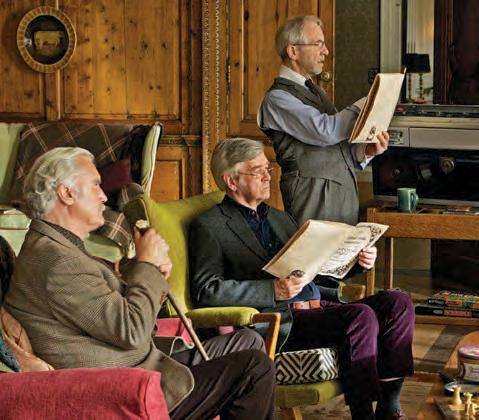
Billy, as this suggests, loves acting but thinks of himself as “a comedian who acts”. Although he was Bafta-nominated for his performance opposite Judi Dench’s Queen Victoria in 1997’s Mrs Brown, he says he doesn’t get offered many films.
He said, ‘Aren’t you?’ I just went ahead and put ‘Billy Connolly’ anyway.”
With his gorse bush of grey hair and Van Dyke beard, Billy does look the part of a sage Dumbledorian eccentric.
“I must admit, when Richard Harris
ONE
Shave your nostrils.

TWO
When you’re eating, try not to put your tongue out when the spoon is halfway to your face.
THREE
Don’t even think about how you dress and you’ll be fine. I don’t.
FOUR
To keep the brain active, do crosswords and puzzles. My favourite is The Times’ Word Wheel. If I don’t get it quickly, it takes me ages—sometimes until the following day.
died, my agent tried to get me that part. But they got someone else.”
I remind him that the “someone else” was Michael Gambon—who happens to be another of his co-stars in Quartet.
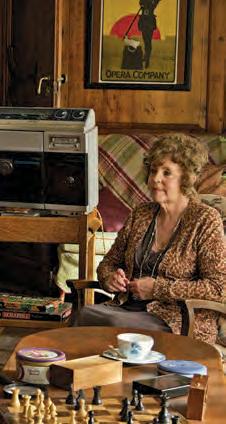
“Ha! God, I love him. Gambon made me roll with laughter. We’ve got the same taste in socks. Loud and vulgar.”
Today, Billy is wearing black cowboy boots and the black-T-shirt-andjeans combo we’ve come to know so well. I demand he reveal his socks. He complies. They are indeed loud and vulgar—pink-andred stripy.
“They’re good ones, these, because the stripes are different on both feet— they’re wider on that leg.”
So within ten minutes of me meeting Billy Connolly, we’ve covered geese afarting, nuns a-gargling, Verdi’s Rigoletto,

his enduring fame (from a film he wasn’t in), and his love of garish knitwear. It’s fair to say that, at 70, Billy’s mind burbles and delights as much as ever. Age is supposed to diminish us, leave us pining for former glories—that’s part of the story of Quartet, as it happens. But you won’t find Billy romanticising youth.
“I’ve always liked old people: I always wanted to be one. When I was a wee boy, I wanted to be an old guy. Because they always had knives! They all smoked that old black tobacco and played dominoes in the park and had stories about the First World War and the smell of pipe tobacco and cigarette cards. They talked to you and gave you sweeties, things that people would find deeply suspicious now. But elderly people always carried sweeties then—mint imperials and those glucose ones in cellophane paper.”
FIVE Exercise if you like. I recommend sit-ups. I do 365 a year: I sit up in the morning and I lie down at night.
Pensioners, he says, are too quick to be confined to homes in this country. “They’re getting less and less valued as people sell their houses and stick them in these places. I don’t think they’re kept in their own homes long enough; I don’t think they’re loved enough. My granddad lived alone and he was 96, 97. But he fell off a chair—he must have been fixing a picture or something—and hurt his elbow. The doctor insisted he went into sheltered housing…and he died. That was the last thing on earth he wanted, so he went to his bed and died. People should have [elderly relatives] at home because their grandchildren love them and they love their grandchildren—and they carry a lot of great recipes with them!”
Billy’s attitude to his own maturation is predictable. “I feel exactly the same as I did when I was 37. The numbers keep ►
changing: I don’t pay much attention. But I’m constantly reminded that I’m getting older. Newspapers? They’ve got a thing about it. I think it started with rock ’n’ roll. People, once they were 30, were ‘veterans’. So 40, 50, Keith Richards… what’s going on here?”
Getting older hasn’t changed his perspective on what’s funny, either. He still likes comedy that challenges and shocks. “When I look at other stand-ups, I get scared because they’re awfully good, but I don’t cringe at the material or anything. I think Frankie Boyle’s very funny. People do the humour that’s of its time, and that’s what they should be doing. If you don’t like it, move your thumb, press the other button on the remote, and he’s out of your life forever.”
Having been around long enough to see fashions come and go, Billy recognises the media narrative that builds up reputations and then demolishes them. He’s experienced it himself.
“I come in and out of favour with Scottish newspapers. They’ve had a go at me for years and now they seem to be on my side. Scotland’s a minefield. If you say anything against it, you’re officially attacked. During an interview in California, this woman asked, ‘How do you like living in Los Angeles?’ I said, ‘It’s great, you know, you could be in Falkirk,’ and she immediately sold it to a Falkirk newspaper! And they went apes**t, thinking I was running the place down. There’s nothing wrong with Falkirk, you know? I just mentioned it.”
I suggest that this kind of instant outrage might be because the internet has made the world a smaller place—a
Billy with Pamela Stephenson, his wife of 23 years

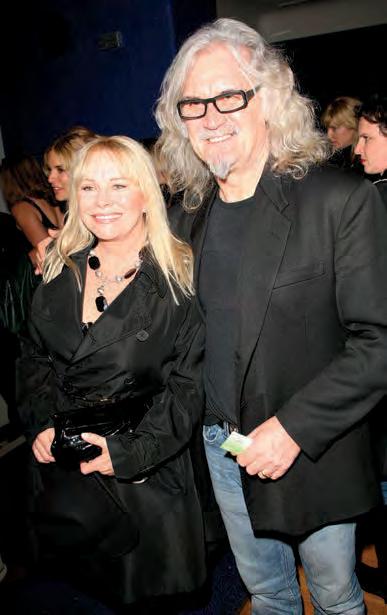
one-off comment in LA can be news in Falkirk mere minutes later.
“It’s got nothing to do with how fast it is,” says Billy. “I just think it’s bastard behaviour. It’s sneaky, it’s underhand, it’s greedy, it’s s**t. Sometimes with the press, it’s them and us, and I don’t know why the f*** that should be. And there’s a class system in the press when it comes to comedy. A toff can get away with a lot more than a working-class guy. A working-class guy would be hammered for using certain language. If a toff does it, it’s, ‘Isn’t he wild and brave?’ ”
But Billy himself has always been more hailed than hammered for speaking wildly and bravely. He’s admitted that when he was younger—in some
of his breakthrough performances on Parkinson, for example—he had so much confidence that he’d just say whatever he wanted and hang the consequences. Is that still the case?
“Sometimes I’ll think about it more and be aware of hurting people. Because I remember I said something terrible about Margaret Thatcher [at a 1991 gig]— a throwaway comment along ‘the bitch’ sort of line—and her daughter was in the audience. She stomped out in high dudgeon. I would have done the same if it was my mother. I remember I wasn’t sorry for saying it but, in my heart, I was kind of sorry for hurting her. In the earlier days, that would never have crossed my mind.”
But if Billy has mellowed, it’s much more to do with his wife, the comedian and psychologist Dr Pamela Stephenson Connolly, than the years passing. She’s
taught him to listen to other people as much as to perform himself.
“Years ago she said, ‘I don’t want you to stop being funny but, at dinner, you must remember you’re overwhelming people. They’ve got funny stories to tell too, but they’re scared because you’re a comedian. Do you know what would be good? To shut up now and again and let them tell their stories.’
“It was great advice. Because sometimes you get on a roll and they’re all laughing, but they’ve got lovely stories as well.”
The problem, I’d gamely suggest, is that no one else’s stories are as good as Billy Connolly’s. If you ever find yourself sitting next to him at dinner, do just let him speak. ■
» Quartet is released on January 3 and is reviewed on p13.
Untruths about the natural world aren’t rare—ever heard the one about mother birds abandoning eggs and

chicks if humans have touched them? Well, you can understand how that idea spread: animal-welfare groups say you shouldn’t help newly born creatures while they’re still learning, and a little white lie deters curious kids. But the myth about mice loving cheese is a bit more complicated. How did that catch on?
and, unlike flour or grain, it left clear teeth marks.

In days gone by, it could be that mice had fewer choices—cheese was one of the only foods stored for long periods,
in general has a lot Bunny aside,
stored for long periods,

So the link was made, and it’s persisted long after mice-catchers have realised that bacon, chocolate and even peanut butter are more e ective. Of course, Tom and Jerry cartoons haven’t helped, and animation in general has a lot to answer for. Bugs Bunny aside, rabbits aren’t very keen on carrots either.




Diver Nick Mevoli had managed a 299-foot US national record plunge at the Deja Blue III freediving event in Grand Cayman last May. But that was with flippers. Attempting a slower 289-foot dive in bare feet, he was heading back to the surface when he suddenly realised he couldn’t make it—with 92 feet still to go. His lungs were close to bursting, he panicked, blacked out, and began to float free. Rescue divers had just seconds to grab him and force him to the surface. Nick survived—but only after waking up spitting blood from a tear in his lungs.


Believe it or not, somewhere in that mangled wreck are a mother and her two children—and they’re all still alive. The emergency services faced a desperate race last January to try to reach 36-yearold teacher Kelli Lynn Groves, ten-yearold Sage and baby Milo before their car plunged o a bridge into a ravine below.


They asked for a forklift truck to support the BMW—which had been hit by a lorry—but were told it was 45 minutes away. Then, by an amazing stroke of luck, a Navy forklift passed by moments later and held the vehicle up until the family could be cut free. All three survived— albeit with a few broken bones. ►
If you’ve been jilted just before your wedding day and you’re only 22, life might not seem worth living. Last May, this young woman—identified only as Miss Li—certainly didn’t think she could go on, and attempted to leap 80 feet from an apartment building. Rescuers grabbed her and— after she dangled precariously for several seconds—managed to haul her in.

Stricken with fear by the roaring fire behind him and partially paralysed by a stroke, Peter Lui stands helplessly at his balcony railing, as neighbour Edwardo Martinez tries to coax him down.
“I can’t do it,” said Lui over and over as the flames drew nearer, until a fireman eventually hauled him to safety. The blaze, which the authorities blamed on “careless use of smoking materials”, gutted the Wisconsin flat last July.



When a gust of wind blew Maltese Terrier Bibi o Brighton pier, Melbourne, in August 2009, owner Sue Drummond could only look on in horror. Enter 20-year-old Raden Soemawinata—who, bizarrely, had been on the pier to scatter his grandmother’s ashes. The model stripped to his pants (it’s fine, he’s used to it) and leaped into the frigid water to save the stricken dog.

Firefighters lower a ladder into a 33-footdeep unfenced sewage well in southern China, to rescue the occupants of a crashed truck in August 2010. It ploughed into the hole while swerving to avoid another vehicle. Miraculously, both survivors climbed to safety from the wreck, with no more than a cut on the head between them. n

Give yourself a big-time boost with a little help from our new-year health special. Starting with...
The French peck on both cheeks is less likely to pass on a cold than the British handshake. The fingers of someone who has a cold are likely to be contaminated as a result of unconscious rubbing of the nose or eyes. It’s riskier to shake hands with such a person than be close to a serial sni er or even directly in the path of a giant sneeze—as long as any droplets stay away from your eyes and nose.

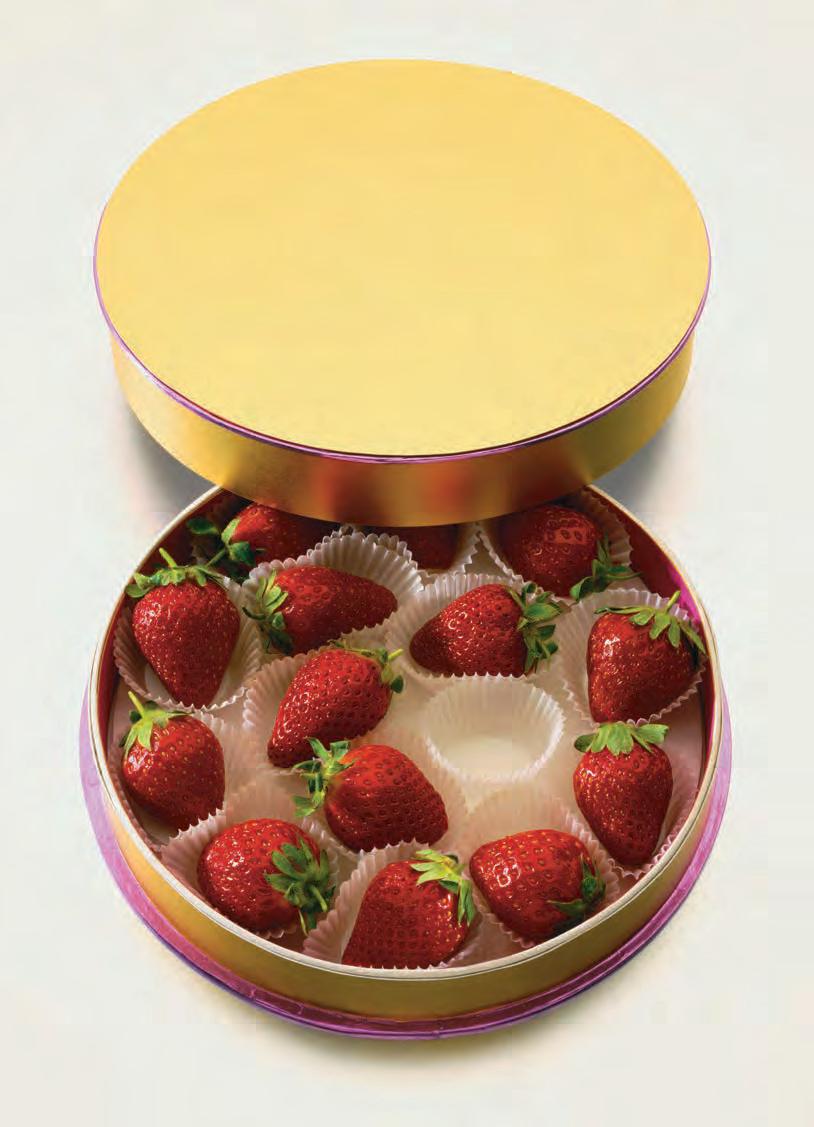
Strawberries can soothe a troubled stomach, new research suggests. They are thought to help prevent stomach ulcers by reducing damage done to the stomach’s mucous membrane. The findings are still unconfirmed, but you’ll do yourself no harm by enjoying this delicious preventative remedy throughout the summer months. Turmeric, cranberry juice and probiotic yogurt may also help heal the stomach lining, as will oily fish and plenty of darkgreen vegetables. ►
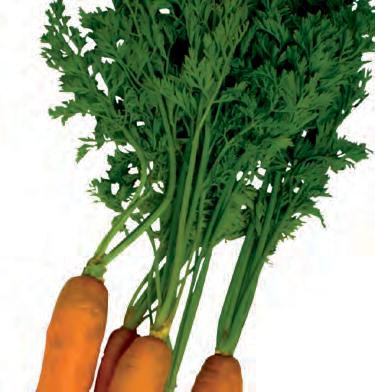

Cooking carrots with a little oil increases the available levels of the antioxidant beta-carotene, because this vitamin is soluble in fat. A 2011 study found that our bodies can absorb just 11 per cent of the beta-carotene from raw carrots, but this figure rises to 75 per cent when they’re stir-fried.
Eating a small portion of mushrooms each day could cut your breast-cancer risk by two-thirds.
A Chinese study found that women who ate at least 10g of fresh mushrooms a day were 64 per cent less likely to develop breast cancer than women who didn’t include them in their diet.
The rare reishi mushroom has been known in the Far East for more than 2,000 years for helping the immune system. It:
● Stimulates the production of T cells—white blood cells involved in protecting the body from infection.
● Increases the levels of substances that strengthen the immune response.
● Promotes sleep and reduces stress by suppressing the production of the stimulant hormone adrenalin.
Reishi essence—a good way to get the benefits—is available from health-food shops.
The best way to get a mental lift is to bend backwards

Bend over backwards to improve your mood. When researchers rated the mood-altering powers of di erent yoga poses—such as back bends, forward bends and standing poses— they concluded that the best way to get a mental lift is to bend backwards. Enrol at a local yoga class and look forward to raising your spirits with a back workout.
A simple headache-relief tip is to put your feet in a bowl of warm water. This, the theory goes, dilates the blood vessels in the feet and draws the blood away from your head, which may ease the pain.

It may sound eccentric, but getting into the habit of humming whenever you approach a loud noise without ear protection will help you hear better in later life. The inner ear has a mechanism to protect itself from noise damage by tensing muscles around the eardrum and reducing the volume of the sound that reaches the inner ear. You can boost this reflex by the simple measure of pressing your lips together and beginning to hum—a process that helps tighten these muscles, protecting your eardrums further.
When you’re listening to music, choose your headphones wisely. Small ones that fit inside your ears are bad for your hearing—sound leaks so badly that you’re more likely to turn the volume up to a dangerous level, risking hearing damage. Larger ones that fit over your ears are better, says Deafness Research UK.
Noxious indoor air pollution kills more people per year than outdoor air pollution, according to the World Health Organisation. Volatile organic compounds (VOCs), such as acetone, ammonia, benzene, formaldehyde and xylene, are given o by a huge variety of modern materials in homes, including carpets, furnishings, paints, treated woods, glues, cleaning products and air fresheners. VOCs are linked to many health problems, such as asthma, nasal congestion, headaches and even cancer. Wisely chosen houseplants reduce the risk by removing toxins from the air. Keep an areca palm, Boston fern, pot chrysanthemum, peace lily, bamboo palm or rubber plant.
including carpets, furnishings, treated cleaning products and air

Soya products such as tofu may help relieve troublesome menopausal symptoms—such as hot flushes— according to some (although not all) studies. Try a delicious hot-flush-beating snack of tofu chunks rolled in sesame seeds and fried in a little rapeseed oil.
If you su er from night cramps, drink a glass of tonic water before going to bed. Tonic water contains quinine and is a popular remedy that’s now been backed up by research. However, steer clear of quinine tablets, which can have unpleasant side e ects.
You can get lots of calcium from non-dairy foods, too. A dried fig contains 130mg of the bone-building mineral.
● Greens: broccoli, savoy
cabbage, spring greens and kale are packed with calcium. Just one cup of cooked kale contains about 200mg—around a quarter
of your daily requirement.
● 26g of almonds provides 60mg of calcium. Toast them and sprinkle on fruit compote, salads or cereals.

Chewing gum may help quell sweet cravings, suggests a US study. People who chewed sugar-free gum for 15 minutes an hour for three hours and then indulged in a variety of snacks reported feeling significantly less hungry and had fewer cravings for sweet foods than those who didn’t chew gum before snacking.

It can also help relieve stress, say Australian scientists. Their study put people through a variety of stress tests while chewing and not chewing gum. The results showed the gum chewers were more focused and relaxed, and better at complex tasks.

Mobile phones may boost circulation. An international study on the e ects of the electromagnetic waves emitted by mobile phones found that these machines could actually be good for the brain. The research, published in the American Journal of Alzheimer’s Disease, suggests that when exposed to electromagnetic waves, the brain warms up very slightly over a period of months, boosting blood flow and energy metabolism in the brain.
Despite the reassurances, many experts remain cautious, and “excessive” mobile use by children should be discouraged, says the UK’s Health Protection Authority.
















This delicious, starterfriendly vegetable is a rich source of oligofructose, a natural soluble fibre that can curb appetite and trigger the sensation of being full. Dutch scientists found that oligofructose triggers the release of gut hormones that govern appetite, and people who took it as a supplement ate 11 per cent fewer calories in just 13 days. Oligofructose is also found in bananas, onions, chicory, barley, wheat and tomatoes. See if eating these foods reduces your appetite.
You could actually build muscle by eating mustard. Scientists have found that homobrassinolide, a plant steroid in mustard seeds, may trigger a similar response to anabolic steroids, building up muscle mass quickly with virtually no adverse side e ects. The research also found that the substance stimulated protein synthesis in muscle cells, leading to increases in lean body mass (the weight of everything in the body that’s not fat) and physical performance.
A group of British scientists invited young adults to take part in a word recall test. Some were given capsules containing sage oil and others a placebo. Both groups were tested at intervals to see how many words they could remember. The sage-oil group performed consistently better than the placebo group. To harness the herb’s benefits, drink a tea made with a few fresh leaves, include sage leaves in salad dressings, or use them to flavour pork, poultry or fish. It’s thought that the anti-inflammatory e ects of sage are what boosts the memory for several hours.


Your parents’ marriage breaking down could a ect how long you’ll live. Parental divorce during childhood emerged as the single strongest predictor of early death in adulthood in The Longevity Project, a US research study. Of course, you can’t rewrite your parents’ past. But if this applies to you, it can provide an added incentive to reduce the impact of health risks within your control. ■

Extract from The World’s Best Kept Health Secrets, available at readersdigest. co.uk/shop, priced £27.99




Successful parallel parking? Or maybe popping bubble wrap? We asked you to reveal the small things that make you happy
BY DANNY SCOTT
“I sometimes sleep on the beach. There’s something magical about waking up and hearing the water lapping against the shore—you can’t get angry when you’re looking at the ocean.”
For Sir Richard Branson, it’s a mug of tea and one of his wife’s egg sandwiches. The Apprentice’s award-winning businesswoman Karren Brady likes to help with her kids’ homework. Millionaire rock star and former heroin addict Slash sits down with an Ab Fab box set. Olympic goldmedal-winning heptathlete Jessica Ennis watches Coronation Street. And 77-year-old Hilda Lowe from Nottingham loves the squidgy satisfaction of popping bubble wrap!
Dominic Monaghan, 35, star of Channel 5’s nature series Wild Things
We’re talking about life’s little pleasures—those ordinary, everyday things that always put a smile on your face. And these are just a handful of the hundreds that readers, businesspeople and famous names told us about when we asked, “What makes you happy?” Some were silly, some were beautiful, some were heart-warming, and others were just plain weird. But
►

Hanging out the washing, then watching the clothes wafting against a clear blue sky. It reminds me of when I lived in Jamaica.” Jo Austin, 40 , nurse, Devon ‘‘
they all offered a fascinating glimpse into people’s lives.
Sir Richard told us he enjoys his egg sarnie and a cuppa because it always makes him feel at home. And Hilda gets stuck into the bubble wrap because it brings back memories of her late husband Norm. “He was always ordering gadgets from the newspaper,” explains the pensioner, who’s registered blind. “Often they’d arrive in bubble wrap, and I used to sit there popping the bubbles while he’d try to figure out how his new potato peeler worked. I can’t really remember what Norm looked like, but bubble wrap always makes me think of him. The popping used to drive him up the wall!”


These sudden bursts of daily joy come in many shapes and sizes. Amy Browne, 26, an asset manager from Bermondsey, loves parallel parking in a small space in one go; Hannah Francis, a 32-year-old chef from Leigh-on-Sea, sheds a happy tear whenever she looks at the gold watch given to her by Nanny Joan; student Jamie Frost, 24, enjoys a


“I can’t help smiling if I fi nd a parking space with some time left on the meter. Then— the cherry on the cake —rushing round and doing all your shopping in that time without having to put any more money in!” Alex Harper, 37, decorator, Glasgow
“Putting on my karate kit just after my mum’s ironed it. I’m sure it makes me fight better!”

Joe Townsend*, 17, student, Upminster


night walk around his home town of Thetford, Norfolk.
“Just because something’s small, momentary or mundane doesn’t mean it’s trivial,” points out Dr Nick Baylis, author of The Rough Guide to Happiness. “The goodnight kiss from your loved one. Your favourite piece of music. A child’s smile. Would you call those trivial? Of course not!
“We’re living in an increasingly macroworld where our lives are conducted on a grand scale. Every day, we’re told about the economic situation in China, the financial crisis in Europe, or that we need bigger cars and TVs, and more Facebook friends. To make yourself happy, you should get away from all this pressure and focus on the fundamental, simple, positive things—the sensual beauty of the world around us.”
According to research into Lottery winners, a financial windfall will make a difference to your happiness levels for about four or five years before you fall back to your old baseline. But, says Sheffield University psychologist Professor
*Name changed (he’s worried his mates will laugh at him)
Cycling down a long, winding, country road…with no cars. All I can hear is the sound of my tyres rolling over the tarmac. Now that’s what I call peaceful!”
Lenny Turner, 47, unemployed, Derbyshire
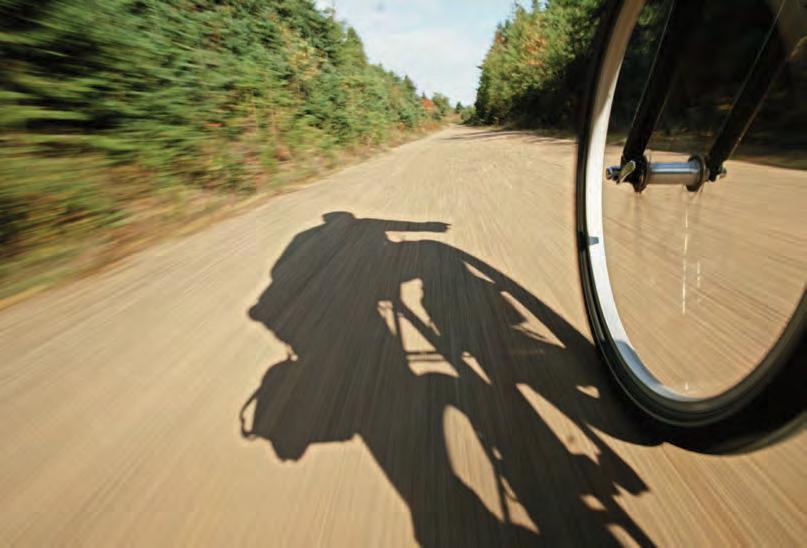
Peter Totterdell, a small joy—such as a five-minute lie-in before work—can bring happiness indefinitely. Indeed, he says, it’s a combination of small things, such as meeting a friend, a walk by the river and eating your favourite snack, that generally determine how happy you are on a particular day, rather than bigger issues like how satisfied you are with your house or career.
“The best scientific estimate of happiness—from figures gathered by the Government over several decades
—tells us that 50 per cent is regulated by genetics and personality,” adds Professor Totterdell. “Only about ten per cent is due to your circumstances, like being married or your wealth. This leaves about 40 per cent—which is where the day-to-day things come in.”
A lot of the people we spoke to got enjoyment from doing little things for others, often to show their gratitude. Thanks to his dad, 35-year-old Liverpool teacher Johnny Holloway likes nothing better than cooking for his friends and family. “My dad would never allow me
“New socks! I just love the idea that I’m the first person to have worn them—no other feet have been there. I feel like an explorer.”
Liz Cox, 32, mother, Brighton

to sit in front of the telly when I was eating as a kid. He always made me sit at the table. I hated it, but now I understand why he did it. Dinner was one of the few times we actually sat together as a family.”
Twenty-five-year-old Kitty Wood, a photographer from Grimsby, says that she likes to “surprise people with little gifts”. Twickenham-based marketing director Claire Carter, 40, sends flowers to her mum when it’s not her birthday. And when Sylvia Miller, a 30-year-old IT worker from Derby, finishes a good book, she leaves it on an empty seat on the bus. “Often, people just move it to sit down, but I love it when somebody picks it up, looks at the cover and starts reading. I always want to tap them on the shoulder and say, ‘It’s brilliant!’ ”
“Aristotle saw happiness as being in tune with one’s nature—with the added assumption that our nature is virtuous,” says Professor Alex Wood of the University of Stirling Management School. “One example would be to act in the right way towards other people. The act of giving, being kind or showing one’s gratitude.
“A bloke who lives in my road has obviously had a rough time these last few years—drink, I think. But, over the last couple of months, he’s been looking better and better. It’s always so nice to bump into him

“Taking my make-up off after I get home from work. Finally, I feel like I’m me!” Jane Carney, 32 , designer, Essex
“In a study of first-year undergraduates, we found that students who were more grateful to be at university and saw the positives in their life were the ones who were less depressed, less stressed and had better grades at the end of term.”
in the newsagent’s. The life has come back to his eyes. I’ve never asked him about what’s happened, but I think he knows that I know changed.”something’s William McLeod, 45, electrician, London
Many of the other little pleasures we uncovered were based on sensory experiences. Some of the most popular ones were things like the feel of fresh bed linen, the smell of a new book, the smell of freshly mown grass, listening to children playing, hearing your favourite piece of music, or eating your favourite meal. More esoteric suggestions included: “The sound of the cat crunching her dried food” (many thanks Ray Chadd, a 69-year-old retired college lecturer from Riddlesdown, Surrey); “Putting my pants and socks on the radiator each night, so they’re nice and cosy in the morning” (James Walsh, 40, a Plymouth solicitor); and, “Gently brushing
my face against a wet hedge” (don’t let us stop you, Andy Swain!—a 34-year-old barman from Grimsby).
“To call us highly sensitive creatures is putting it mildly!” says Dr Nick Baylis. “Our senses have evolved over the six million years since we were kicked out of the trees and onto the savannah. A smell, for instance, goes straight to our huge subconscious memory banks, which signal whether it’s dangerous or friendly. These also send us biological telegrams— reminders of something that happened last week, last year or even 40 years ago. It’s the same for all the other senses— sound, feel and taste.”
Caroline Redman, founder of the Rock Choir national singing group, for instance, loves the feeling of walking through wet grass because it reminds her of childhood Sunday evenings. “My mum used to send me down in my wellies to call Dad in from his bonfire for our roast dinner. The grass would be damp, and I’d kick fallen apples out of my way as I ran towards the bright firelight shining out of the dusk.”
“Whenever I want to cheer myself up, I think of my children when they were small. The happiness and the laughter. These days, we’re so caught-up in material things… but the happiness they give us is purely superficial.”
Perween Warsi, founder of ready-meal giant S&A Foods
Other small moments of delicious nostalgia come from more obvious sources. John Wood, a 65-year-old gardener from Cambridge, is transported to London’s Hyde Park in 1969 whenever he hears the Rolling Stones. “It was the first time I saw them. Something happened that day…the music got to me. It made sense. Kids today must still experience that moment—when you realise how important music is going to be in your life. If the Stones come on the radio, I feel the hairs stand up on the back of my neck and I get the urge to play air guitar. I’ve had some strange looks in
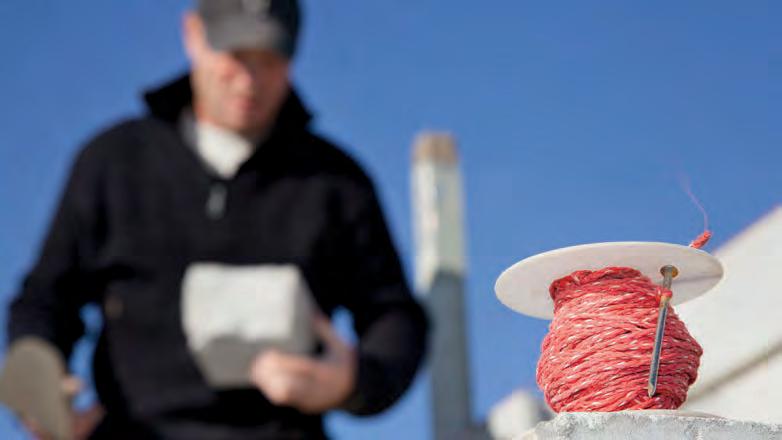
‘‘
Being outside when it’s cold and dry… and I’m building something. I get this tremendous sense of well-being when I see something under construction—as if you’re contributing to life.” Pete Johnson, 58 , retired, near Lincoln
the local coffee shop!”
When Jessica Ennis watches Corrie it transports her back to a time when life was simpler. During the madness of the last 12 months, she says it’s been “really difficult to just switch off. Life is full of extremes. But I’ve been watching Coronation Street for years and, as soon as it comes on, it reminds me of being a kid. I feel normal. I just relax.”
She’s not the only one for whom something mundane can provide a sense of control or much-needed stress relief. “It probably sounds like a cliche, but taking a walk by the Thames really does clear my head,” says renowned City big shot Nicola Horlick, 52, who also recently launched new restaurant Georgina’s in Barnes, London. “You stop thinking about work and just watch the slow movement of the water. I think we all need to get back to nature sometimes.”
“It’s fantastic that Richard Branson notices something as simple as an egg sandwich,” adds Professor Alex Wood. “If he keeps those thoughts in mind, they can actually insulate him against the highpressure job he has to do. We all have to deal with negative things in life, but the
“Going to the local charity shops and finding a DVD of The Sweeney that I haven’t got. I could just buy the box set off the internet, but that wouldn’t be anywhere near as much fun. One day, I’ll have the lot. It’ll be the end of an era!”
Richard Hill, 39, unemployed, Sheffield

“I work from home and often have a nap in the afternoon. As soon as I get on the bed, my cat jumps up next to me. We lie down for 15 minutes, then I wake us both up. It makes me laugh, because we have the same routine every day. We never exchange words, obviously, but we both understand the situation.” Anna Simmons, 33, illustrator, Wrexham
tiny joys help keep things in perspective.”
“Research has found that people who experience more positive emotions— even the small ones—are more creative, more sociable and even have a stronger immune system,” says Professor Sonja Lyubomirsky, author of The How of Happiness: A Practical Guide to Getting the Life You Want (£9.99). “It’s as if all those good tiny things add up to make good big things happen. If you’re sitting in the office popping bubble wrap, someone might walk up to you and say, ‘I used to love doing that! Can I have a go?’ Who knows? You might have made a friend for life.” n
» Do you have a little pleasure that makes a big di erence? Email readersletters@ readersdigest.co.uk and let us know!





Tempting as it is, sleeping in for several hours at the weekend will disrupt your regular pattern and make it harder to haul yourself out of bed on Monday morning. You’re more likely to feel refreshed by spending time doing something you really enjoy during the day or getting some exercise. If you do sleep late, you might notice your dreams more—the type of sleep during which we dream lengthens as the night wears on.
Answer: Rise and shine
Decisions, decisions! But which ones impact on your health?
Hilly Janes’ new book Latte or Cappuccino? has got the answers

Continental breakfasts may sound light, but if you go for milky co ee and croissants or a baguette with butter and jam, that’s hardly a guilt-free option compared with a cooked breakfast. There are about 300 calories in a large plain croissant, and nearly all of them come from saturated fat and refined carbohydrate. A slice of lean back bacon, some tomatoes, mushrooms—grilled, not fried—and a poached egg on wholegrain toast will come in at about the same, while providing you with more sustaining protein and two of your daily fruit and veg portions.

Answer: Light English
Ever wondered why Scandinavians swear by taking a hot sauna, followed by a dip in freezing cold water? Well, it’s thought to aid circulation—the heat brings the blood to the body’s surface, and the cold drives it back to its core. Jumping into the shower and adjusting the temperature can do the same, and exposing your head to jets of water boosts blood flow to your brain. The hot water also relaxes sti muscles.
Answer: Shower
When you work out, your metabolic rate —the pace at which your body consumes energy—spikes, then returns to its resting level quite slowly, burning calories for several hours. So leading fitness coach Matt Roberts suggests eating breakfast, then exercising an hour or so later for 30 minutes—your body will have more time to digest the food. As an exercise early bird, you’re also less likely to be diverted by things during the day that scupper your plans to go to the gym or out for a run. And sleep experts warn that, as physical activity stimulates your body, evening exercise can make it harder to get to sleep. Answer: Get up for your push-ups


The sugar and acids in fruit juice and fizzy drinks are bad for children’s (and adults’) teeth, so dentists recommend giving them at mealtimes only and using a straw once they’re old enough, so the drink makes less contact with their teeth.
Answer: Make that a strawberry milkshake
Evening exercise
can make it harder to get to sleep
Riding at 10mph for 15 minutes on the flat uses about 90 calories. Walking briskly—covering around the same distance—for 30 minutes would burn about 160. A walker’s mind can also wander more freely: you don’t have to concentrate on fending o aggressive drivers, so you can listen to your iPod and relax.
Answer: Walk this way

The latest school or workplace tittle-tattle can perk up a dull day. But if you’ve ever felt suspicious of a gossip and wondered if they talk about you like that, you’re experiencing a process psychologists call “spontaneous trait transference”. Experiments show that the listener unconsciously associates some of the negative things they’re hearing with the person who’s telling them. So if you can’t say anything nice, don’t say anything at all.
Answer: Silence is golden

The amount that co ee shops may have contributed to our weight gain in the last decade or so should not be underestimated. A grande latte with semi-skimmed milk is 150 calories. But a tall cappuccino with semi-skimmed is 90 calories, because it contains less milk overall. And while the white stu is nutritious, large, sweetened milky co ees arguably aren’t.
Answer: Go with the foam


For a label to say that a food is “light”, it must be at least 30 per cent lower than standard products in at least one typical food value, such as fat or sugar. But even a light version of a high-fat product like cheese can pack in the calories, and a light version of one brand may contain the same amount of fat as the normal version of another. However, a food can only be called low in fat when it contains no more than 3g of fat per 100g—or 1.5g of fat per 100ml in a liquid. Bear in mind, however, that manufacturers often substitute sugar for fat in order to enhance flavour.
Answer: Banish the fat
If it’s a ca eine kick you want, there’s about the same amount in a small bar of dark chocolate (with at least 70 per cent
Packed with veg, fruit and lean meat or fish, both options can be healthy. But watch out for salads with fatty dressings or lots of cheese, and soup loaded with cream or salt. Soup could help you eat less overall, though. Research found that soldiers who ate a blended soup of chicken, rice, vegetables and water felt well fed for longer than those who’d eaten the same ingredients as solid food, with a glass of water. Why? The blended food was bulkier, so it couldn’t pass through the stomach as quickly.

Answer: In the soup
In studies, when people compare how good they feel about an object they’d bought and a recent enjoyable experience, the experience won hands down. We tend to preserve happy memories of events like a weekend away (forgetting about the tra c jam en route), whereas objects become tatty or break. Also, we’re more likely to share experiences with others, adding a positive social dimension. So, if it’s a choice between buying a new CD or going to a concert, go for the latter.
Answer: Do something
cocoa solids) as there is in a can of diet cola. The cola has hardly any calories, whereas a 35g bar has about 190, but the drink has no nutritional value. Chocolate, however, contains flavonols, which might benefit your heart.
Answer: Live by chocolate

30
If you su er from allergies such as asthma or infections like threadworms, it’s advisable to wash bedding, handkerchiefs, towels and underwear at 60C to kill o germs or dust mites. An NHS study of hospital pillows found that a third of their weight was made up of bugs, their excretions, dead skin, bacteria and saliva. Constant low-temperature washes encourage the growth of mould and bacteria in the rubber door seal of your washing machine, too. So, though hot washes use more energy and cost more, they’re essential every so often. Answer: Hotter is better (occasionally)

60















Many experts, including author and game designer Jane McGonigal, argue that video games are positively good for us. They increase optimism, she suggests, by making hard things seem possible, arouse our curiosity, encourage our active involvement, and give rise to a sense of awe and wonder. Many are social, and can unite friends and strangers in a common cause. You don’t get all that from watching television.
Answer: Get gaming!
Indian food is rich in healthy pulses, like the lentils in dahl, vegetables and lean meat. But it can also be laden with ghee, a form of butter that’s very high in saturated fat. Breads such as puri are fried, so they contain hidden calories, and there’s more fat in the cream used in malai and korma dishes. Chinese food also has healthy options, but a lot of it is deep-fried, comes with starchy noodles, and salty, sugary sauces—sweet and sour pork, for example. The flavouring MSG (monosodium glutamate) has also been blamed for drowsiness, nausea and chest pain—although studies have failed to prove the link. On balance, if you avoid the oily, creamy options and opt for plain rice (pilau contains fat), Indian food is the healthier choice. Answer: Currying favour n
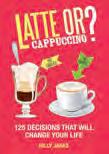
That Will Change Your Life by Hilly Janes (£9.99) is out now. Readers can order it for £6.99 (with free p&p) by calling 01903 828 503 and quoting RD/LOC (UK mainland only, while stocks last).
If you’re reading this, it’s a fair bet that the end of the world, predicted by the Mayan calendar to fall on December 21, 2012, didn’t happen. But the Mayans are in good company.
End-of-the-world predictions date back to the bishop Hilary of Poitiers in the year 365. The theologian Beatus of Liébana followed suit 428 years later, compounding the error by declaring the second coming of Christ on the same day (a popular gambit). More famous doommongers include
Martin Luther, Christopher Columbus, Isaac Newton and Louis Farrakhan
But wild inaccuracy doesn’t always deter pessimists. The Joachimites and the Jehovah’s Witnesses have both revised predictions when the first ones flopped, while the Bible Student Movement has issued no fewer than nine (!) apocalyptic prophesies. We shouldn’t snigger at the Mayans, though. Most scholars think that their “prediction” is a mistranslation— they mainly stuck to weather forecasts.



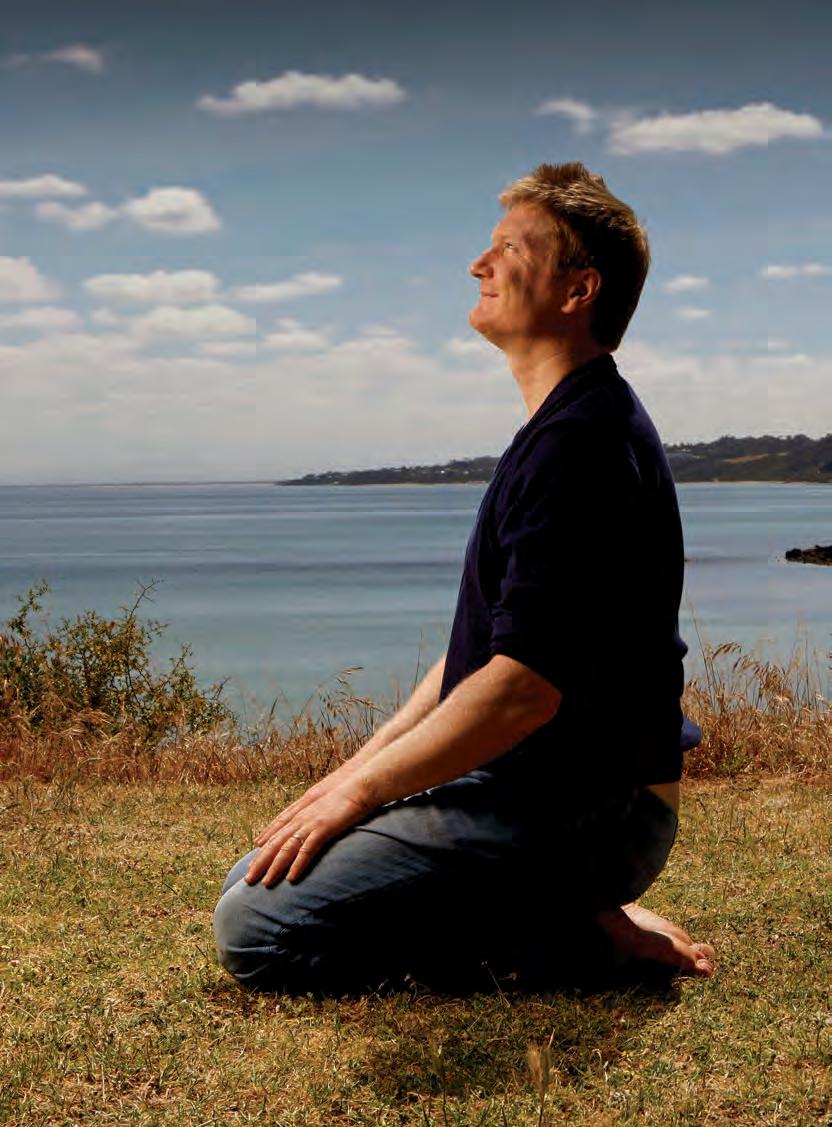

Can you test-drive a religion, build international understanding and have a holiday? Ben Bowler and his British tourists think so






Ben Bowler likes to quote Gandhi. And Martin Luther King. Plus mystic poets, the Dalai Lama and obscure Christian thinkers. His words are a veritable spiritual supermarket.
But there’s one thing that sets the charismatic Irish-Australian entrepreneur apart from your average New Age guru. Raised a Catholic, Ben, 39, has created a unique series of spiritual travel programmes—“Monk for a Month” and “Muslim for a Month”, among others—that have seen him heralded as a trailblazer for a new kind of tourism.

His story begins in a tree near Ayers Rock. “My dad [Jim, an Australian geologist who discovered ►
 BY NICK RYAN
BY NICK RYAN
PHOTOGRAPHED BY JULIAN KINGMA


the human ancestors Mungo Man and Mungo Woman in New South Wales] was quite a spiritual guy. He’d take me with him to Uluru to meet Aboriginal people on their sacred lands. On one occasion, my dad was sitting down with some elders while I climbed a tree. I was probably nine or ten, but I sat up there for an hour and a half and just watched, you know, the white scientist talking to these Aboriginal leaders. It’s a really clear memory for me—the connection; two worlds becoming one.”
As he grew up, Ben took an interest in New Age philosophies, but after working in Britain for a while he set up a property-renovation business. It wasn’t until 2006 that the Ayers Rock experience would seriously affect his life. At a conference on spirituality in Sydney, he saw a moving presentation by Mark Bloomfield, a Brit who’d been running free schools for Burmese refugees in Thailand.
Ben recalls. “Then Mark said, ‘By the way, we’re looking for volunteers to come to Thailand to take over my work.’ I just had this significant, profound moment. I went straight off to ring my wife Jildou and said, ‘We’ve got to go.’ ”
The couple were two days away from completing on a piece of land where they were going to build a house, and Jildou had been looking at doorknobs and blinds when Ben rang. But, though his suggestion shocked the special-needs teacher, she was soon won over by his enthusiasm.
“People are yearning to experience something in an authentic setting”
“It literally brought tears to my eyes,”
The following March, they were teaching Burmese youngsters English in northern Thailand— and quickly fell in love with the country and its culture. Ben became fascinated by the local Buddhist tradition, particularly a rite of passage where men of all ages would stay in a temple for a few days or even months to learn about Buddhist teaching and hopefully grow as people. Westerners could benefit from something similar, he


reckoned. And with Ben and Jildou in no rush to return to Australia after their year-long teaching contract ended, the thought occurred to Ben, Wouldn’t it be fun to bring in foreigners to live in the temple, too?
Ben had been teaching some young monks in Fang Valley, and the local abbot was open to the idea of helping tourists experience his religion. So Ben set up the “Monk for a Month” programme, promoting it online. As well as living in the temple and learning Buddhist teachings and meditation, guests would stay in local homes and go on yak safaris.
Soon people from all over the world— particularly Britain and the US—and many different backgrounds were flying to Bangkok, then making the three-hour bus ride to the sleepy valley.
Ben wasn’t surprised by the programme’s success. “There’s a seeking going on—I believe—in the West. People are yearning to understand [the world] at a deeper level and experience something in an authentic setting.”
But with advertising and administrative costs, the venture didn’t make a
profit, so Ben had to fund it through his Australian renovation firm. He also set up a new charity, Blood Foundation, to fund English and other courses for Burmese refugees—it would be the recipient if Monk for a Month did ever make money. Then, in mid-2010, he decided to take things further.
“I’d always been fascinated by Islam, in the sense of not knowing much about it. But a Christian guy who was doing our monk website said, half-jokingly, that we should do a ‘Muslim for a Month’ course—9/11 had led to a vicious circle of ignorance and contempt, but perhaps such a project could help break it. A light went on in my head, and I registered the URL the next day.”
Ben contacted Dr Ahmet Muharrem Atlig—a theologian who’d been an imam at a mosque in Peckham, London, but now lived in Turkey—to run the programme in and around Istanbul. It began early in 2011. Again, guests stayed with local families, learned about the Koran, how to pray like a Muslim, visited holy sites and even carried out a one-day fast.
Like its predecessor—which has had more than 300 participants—Muslim ►
for a Month was soon a hit. But Ben had had to stop Monk for a Month temporarily in 2010, following unfair complaints from some quarters that he was profiteering from an experience that Thais undertook for free. And the new Islamic programme soon proved controversial, too.
“When my friends and family in Australia heard about it, half of them said: ‘Will we be learning how to make bombs?’ ” Ben recalls with a weary smile. And there was significant opposition on the internet. “Please keep Islamic filth away,” wrote one person under a blog about the course. Parts of the travel industry still refuse to promote it, perhaps because of Islam’s negative image.
a holiday, but it’s empty, boring. The [courses were] fascinating,” says 28-yearold former horse trainer Carol Doyle, from Devon, who’s been on both the Muslim and Buddhist programmes.
“Spending time with Muslim families is a powerful way to break down prejudice”
But, says Ben, “Spending time with Muslim families is a powerful way to break down prejudice and to correct distorted perceptions. Guests and hosts alike say that the programme has left them transformed.
“I’ve always been interested in different races, cultures, foods and religions,” says Terry Goldsmith, 53, a Bury postman and Christian. “The Muslim for a Month trip was amazing. We couldn’t have been treated any better if we were royalty. I learned that charity is a pillar of Islam and a major part of Muslim life, but that’s ignored by the British press. Sharia law isn’t all about cutting thieves’ hands off— it’s about family matters, such as inheritances, that need to be settled in court.”
“I could lie on the beach and have
“One night [on Muslim for a Month], the ladies enjoyed a ‘henna night’—a sort of bachelorette evening before a wedding. The women took off their headscarves and swung their hips to the music, putting us stiff Westerners to shame. It struck me that these particular women were not ‘repressed’ or ‘put down’ by men or religion—they simply have different views on what constitutes public decency. I’ve seen Western women in nightclubs wearing next to nothing not looking half as happy. They don’t shake it half as good either!”
Last August, Ben launched a radical 28-day exploration of Tibetan Buddhism, which is heavily suppressed within China, with guests living among exiled monks or nuns in the Indian Himalayas.
Ben is now planning a “Sikh for a Month” programme in the Punjab, and is in discussions to run a “Christian for a Month” course off the west coast of Scotland at a historic monastic community that dates back to the 6th century. He’s also starting interfaith tours in both Istanbul and India, focusing on their multiple religious traditions.
‘‘That’s where Muslim for a Month falls into perspective. Seen as a standalone programme, it probably looks
kind of odd. But seen as part of a larger framework, we believe that these religions, in a way, belong to all of us. Gandhi [a Hindu] famously said: ‘I am also a Christian, a Muslim, a Buddhist and a Jew.’ Humanity is a big crazy family, and it’s all our heritage.”
The courses have yet to generate any profit, so Ben and Jildou still self-fund the Blood Foundation, now incorporated into the wider World Weavers charity, which runs several schools and courses for hill tribes and refugees along the Thai–Burmese border.
The couple have now returned to Australia—travelling back to Thailand frequently—to build up a marketing business so they can continue their good
work, and Ben remains sanguine about his own future. “I’m not independently wealthy. Nobody pays me a wage. We’ve got a couple of kids and the money is always tight. But I’ve realised that if you really want to make change, you can’t hang on to those sort of worries.
“In Australia, I’m amazed at how often people complain. We need to get the message out: if you’re upset or passionate about something, you need to bring it back to yourself. People may not agree with what we’re doing and may be opposed to unifying values, but I don’t think they want the world to get along. I aim to change that.” ■
» Visit worldweavers.com for more details.


L’Oréal’s Because I’m Worth It slogan recently chalked up its 40th birthday—a rare example of a durable marketing campaign. Most slogans, sadly, fall into four categories: the boring (We’re Exxon declared, erm, Exxon in 1982); the desperate (British Rail’s We’re Getting There, which failed to convince anyone); the accidentally hilarious (We Put People
in Front of Cars, the proud boast of Stillwell Ford in Australia); and the frankly dubious (Melts in Your Mouth, Not in Your Hands from M&M’s. Really?).
Of course, timing is important—the 2003 line Hong Kong: It Will Take Your Breath Away didn’t sound too smart during a Sars outbreak. Mistranslations, meanwhile, would fill a whole article (KFC’s Finger-Lickin’ Good came out as Eat Your Fingers Off in China). Elsewhere, the
lack of e ort is striking.
Austria:

You’ve Arrived is dull, but it’s soundly beaten in the shoulder-shrugging stakes by Oklahoma: We’re OK.


slogan

Then again, vagueness is also safer: in 1884, US politician Henry Clay tried to dismiss his opponent with the rhetorical slogan Who is James K Polk? Thus prompted to take a closer look, the voters must have liked what they saw—Polk duly won the election.
what they saw—Polk

















When it comes to design classics, we Brits have form. And here’s just a sample to prove the point...

Britain is not a country that traditionally does glamour—we leave that to the French or Italians. But when the sleek E-type Jag purred along roads for the first time in 1961, its startling design was the very essence of chic in a most alarmingly un-British way (so much so that ►
people assumed it was made in Milan).
Launched at the Geneva Motor Show, Sir William Lyons, the owner of Jaguar, insisted it was driven there. The Jag cost £2,097, which was the price of a house at the time, but still only half that of a Ferrari. So it was the transport of choice for any man who aimed to be a playboy—and those who just dreamed about it. What could be more charismatic than, say, a young George Best behind that low-slung wheel? The test of time is that it still invites longing glances.

It’s a tricky call to pick just one design from the dazzling portfolio of Apple’s senior vice-president of industrial design, Jonathan Ive. There’s the iPod, iPad and iPhone—but the curvy iMac, his very first assignment for the company, wins by a nose. In 1998, when it appeared, it combined current computer technology with ravishing good looks for the first time. Who imagined that computers could be so desirable? As then-CEO Steve Jobs said, “People don’t know what they want until you show it to them.”
Jonathan “Jony” Ive (now KBE) is Essex-born (he attended the same school as David Beckham) and devotes, he says, “e ort and care beyond the usual” to his designs. Not one knob or button of his creations is superfluous, and his gift—says Michael Czerwinski of the Design Museum—is to “create a design that seems e ortless”.

The iMac transformed Apple’s fortunes and took it into the mass market


“It is di cult to imagine an image more ingrained in the psyche of a population,” says Mark Ovenden, author of Metro Maps of the World. The story is now familiar— 29-year-old Harry Beck designed electrical circuits for the London Passenger Transport Board, but during a spell of unemployment he scribbled away in an exercise book on a new map of the Underground. What Beck did to what he called his “diagram” was radical: he straightened out all squiggly lines and totally ignored the physical distance between stations. His map therefore contained only the information needed to travel the tube e ectively.
A very sceptical management declared it “too revolutionary”, but reluctantly printed it up anyway and gave it out to the public in 1933. It was a smash hit, and Beck (above)—according to author Bill Bryson —is “an unsung hero”.
You don’t get much more utilitarian than the everyday “Gresleigh” earthenware mixing bowl from Mason Cash. First made at the turn of the last century in Burton-on-Trent, it still can’t be bettered. It recently starred in BBC Two’s The Great British Bake O —what more of an endorsement could any item need? ►


Thomas Heatherwick described the process of making the new Routemaster as “rather like doing National Service”
Elegant and functional, whether or not it was based on the design of the human arm is up for debate, but the facts go something like this. Freelance car designer George Carwardine was tinkering around in his workshop on an idea using a new spring. Bingo! His single-beam “Anglepoise” lamp was born, with the USP that it could be e ortlessly flicked into any position.
Initially used by doctors and lab technicians, a domestic version (the 1227) was introduced in 1934. (Later, the manufacturers Terry & Son somewhat foolishly sold the worldwide patent, which is why Anglepoise is known as Luxo in the US.) The lamp has never been out of production since its debut.

A somewhat controversial version of our monarch designed by artist and anarchist Jamie Reid, just to see this is to be whisked back to the summer of 1977. It’s a cliché now, but this one image of the Queen with newspaper lettering over her eyes (and, in some versions, a safety pin through her nose) defined the punk generation.



It’s the only bus that people know by name. Designed originally in 1954 by A A M Durrant (head of the design team at London Transport), we could give you the lowdown on its revolutionary design (no chassis), how it was in service for over 50 years (from 1954), how it’s synonymous with London (though it ran elsewhere, too), and how many passengers deeply mourned its passing.
But instead…enter the “new” Routemaster! It’s a clean, green, British-made bus from designer Thomas Heatherwick (above), the man behind the Olympic cauldron. Ten feet longer than the original, and with windows that follow the line of the stairs to maximise views, Heatherwick’s bus has kept the one thing we all loved—the hop-on, hop-o quality. And the other requisite? It’s only washed once a day, so “it had to look good dirty”.
It’s been worn by everyone from Lord Kitchener to Kate Middleton and picked up its name because it was standard issue for servicemen heading for the trenches during the First World War. This stylish item was invented by Basingstoke draper’s assistant Thomas Burberry, who created a waterproof fabric (gabardine) for local farm workers. The trench followed, and endless varieties have been made (including the single-breasted version worn by Michael Caine in Alfie).
But the classic is the doublebreasted belted version designed for the British Forces. In the 1920s the distinctive “novacheck” lining was added. “It’s the quintessential British fashion item,” says Jane Kellock, founder of online fashion community The Women’s Room. “Classic, understated and chic.”
One simple but radical design that caused a sensation, kickstarted the Sixties, helped them swing, and symbolised the liberation of women. Named, says designer Mary Quant (right), after her favourite car.
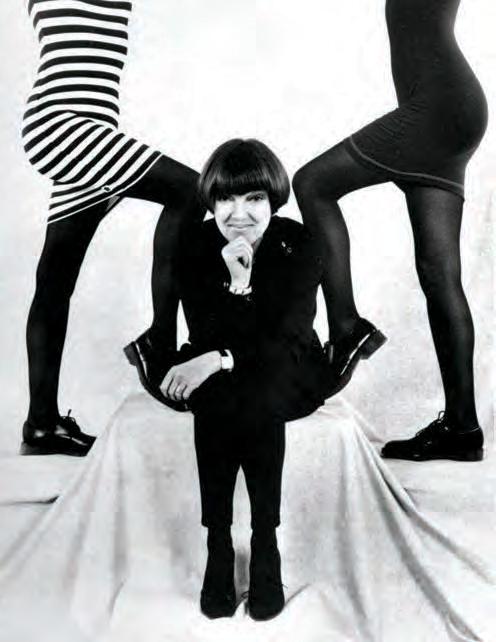
“Classic”, “timeless” and “quality” are just three of the adjectives applied to Church’s brogues, shoes that have been worn by anyone who fancies themselves
a classic Englishman, from James Bond right through to, er, Tony Blair.
Starting out as a Northampton cottage industry, Church have been making shoes for over three centuries, though they are now owned by flashy Italians Prada (who plan to “optimise the brand’s business opportunities while fully respecting its English identity”. Yeah, whatever). This has given their crinkly image some zing, but Prada has wisely not fiddled with a classic, and all shoes are still assembled


An everyday, invisible design today, but this lump of curved plastic was revolutionary in 1963. Cheap and easy to manufacture, using a new type of material that could be moulded, it looked suddenly right in groovy 1960s canteens, schools and public spaces. To date, some 50 million polypropylene chairs have been sold around the world.
It was designed by Robin Day (above —not the newsreader). He and his wife Lucienne were the Posh and Becks of post-war industrial design, gracing glossy magazine supplements as the prototype lifestyle couple. They met at art school, worked on the Festival of Britain, and although they never collaborated, they operated side-by-side in their (then) achingly hip wooden-floored Chelsea studio—he on furniture and she on textiles. to an eight-week schedule in the Northampton factory.
The story goes that brogues were made for Scottish and Irish farm workers because the perforated holes enabled bog water to drain out— make sense of that if you can. Not cheap (classic wingtip men’s brogues will set you back something around 370 smackers), but the idea is that, just like diamonds, they’re forever.

Yes, yes, but whatever you think of the programme, the Big Brother logo stays lodged in the brain. Symbolising the all-seeing Orwellian eye (but in this case staring back at the viewer), it was created by artist and designer Daniel Eatock for Series Two in 2001 (the first series used a real eye). Eatock based it on a photo of his girlfriend when he sneaked up and surprised her. Redesigned each year (until the series transferred to Channel 5), the logo took the personality of each series, says Eatock: “Sometimes it was more friendly, sometimes more cheeky and sometimes more sinister.”



A graphic designer for 60 years, the distinctively pared-down style of Abram Games (left) typifies what we now think of as the art of the Second World War. This was his most controversial poster: the ATS (Auxiliary Territorial Service) girl was such a smouldering bombshell that her looks were even debated in Parliament. Games also designed for London Transport, Guinness, Shell and the British Overseas Airways Corporation.
Woolworths’ distinctive range of Ridgway crockery graced every truly cutting-edge table in the Fifties, and featured all the motifs that signified a state-of-
the-art home: streamlined sofa, paint-palette co ee table, steak knife, pot plant, and that frankly weird standard lamp with the eye.
In the 1950s, Woolworths’ buyers had the bright idea of visiting

art schools to scour for innovative ceramic designs and found Homemaker, created by an unknown Enid Seeney (who didn’t know it was in mass production until she saw a massive display in her local Plymouth branch). Woolies shifted lorryloads of the range, and it stayed in production until 1970. Now pounced
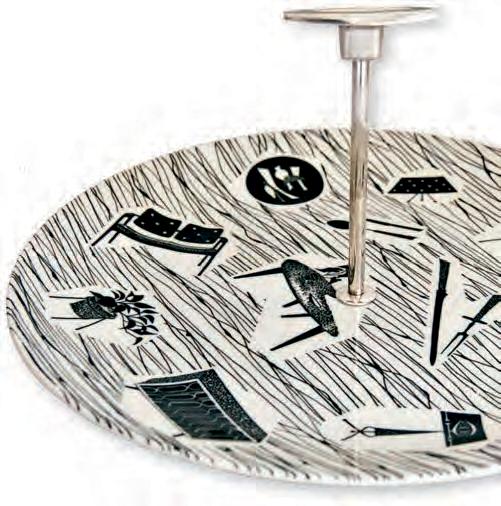
a massive display in her local
in production until 1970. Now pounced on by car-booters everywhere.
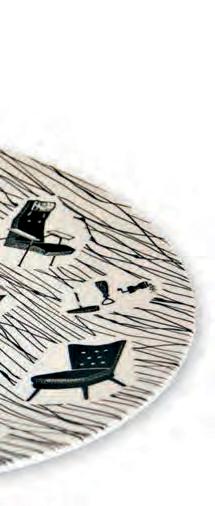


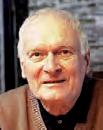
Launched in 1968, the Instamatic camera happily coincided with the boom in holidays abroad, and is therefore probably responsible for a million happy—if slightly blurry—memories. Designed by Kenneth Grange (above), who’s also behind many British objects including the parking meter (which he created on his honeymoon), the London black cab, the Kenwood Chef, the Parker pen, and the InterCity 125 train (which he redesigned because the old models were “too ugly”).
“In Britain today, we don’t always make the connection between design talent and manufacturing talent,” says Michael Czerwinski of the Design Museum (citing Apple as the perfect example of this concept). But Grange did, and he made all his products “a pleasure to use”.

This profile of the Queen is one of the most reproduced images in the world (on 180 billion stamps to date). Known as the Machin Head after the artist Arnold Machin, the study of Her Maj was based on a profile photo taken by Lord Snowdon. Machin spent months tweaking the sculpture to meet with royal approval. ■
With thanks to: Matt Phare, creative director, Shortlist Media; Michael Czerwinski, Design Museum, London; Jane Kellock, founder, The Women’s Room; Robert Soar, creative director, Dragon Rouge; Simon Murphy, curator, London Transport Museum; and Elizabeth Bland, Great British Designs.
If you have a favourite British design that we’ve overlooked, why not let us know? Send us an email—with a picture if possible —to theeditor@ readersdigest.co.uk
“Extraordinary Stories About Ordinary Things”, which concentrates on the design of everyday objects, is at the Design Museum in London from January 30.
IS THE KEY TO REAL HAPPINESS”

Always look on the dark side of life—you’ll find it much more rewarding and creative, argues comedian and broadcaster Arthur Smith
“Do you see the cup as half-full or half-empty?” is one of the questions of the age. The current orthodoxy insists you should always see it as half-full; no negative thoughts must come between you and your ultimate aim, which is, from what I can make out, “living the dream”. Or rather, “LIVING THE DREAM!”
But my name is Arthur Smith and I’m grumpy—there, I’ve said it and I feel better. I’ve no interest in “living the dream”, if only because, given some of my dreams, I’d probably get arrested. I’m gruff, cynical and frequently negative about the world—especially when it demands that I shouldn’t be. That’s the way I am, and it suits me. Furthermore, some psychologists and many artists agree that a pessimistic outlook
can
provide a healthier
method
of approaching the terrible (albeit sometimes exhilarating) business of being alive.
Harvard psychologist David Wegner conducted an experiment where subjects were told of an unhappy event, but then instructed not to feel sad about it. They ended up feeling worse than those who were given no instructions about what to think. Which is a variation on the saying, “Man plans; God laughs.” Personally,

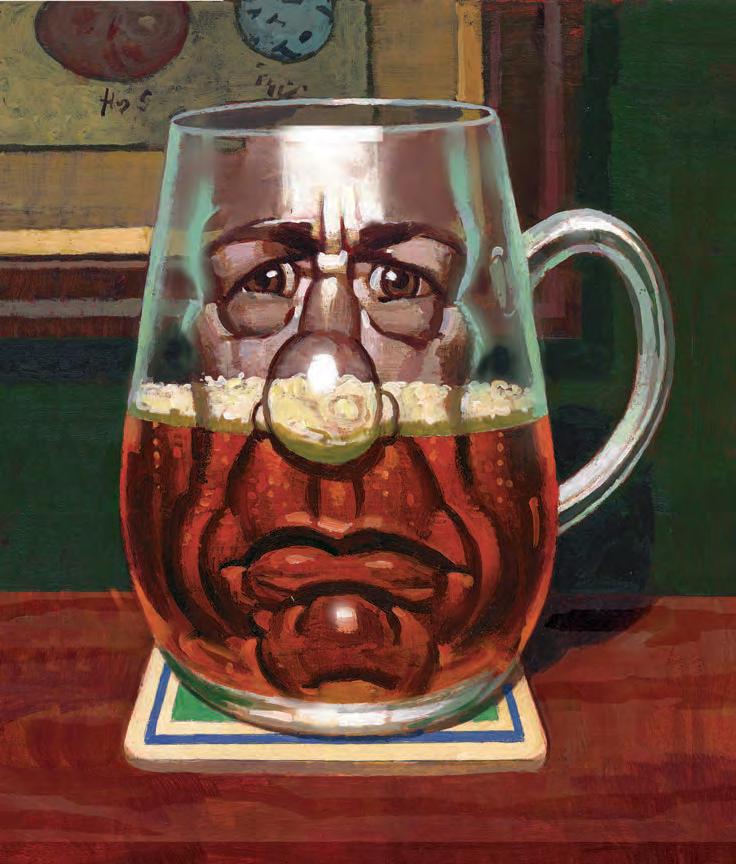
if I have to anticipate something, I’ll do it with robust pessimism. If, for example, I want the weather to be warm and sunny for my friend’s wedding on Saturday, I’ll predict rain and thick cloud. If it’s overcast and wet, I’ll be confirmed in my wisdom and enjoy a good grumble with my friends; if it’s not—well then, “Hooray, it’s sunny!” So, you see, my grouchy attitude doesn’t preclude joy. It means I’m never disappointed and, very occasionally, agreeably surprised.
Dissatisfaction is pregnant with the dream of what isn’t, and satisfaction is a mere inventory of what is
A lot of this debate centres around the woolly notion of “happiness”. People fret about it and how they can achieve it, but I heed the words of John Stuart Mill. “Ask yourself whether you’re happy,” the great philosopher declared, “and you cease to be happy.”
If you ignore his words, you may end up in an emotional cul-de-sac. Where do you go from happiness? People spend their lives trying to reach it, so when you do, what then? Well, herein lies the evolutionary reason for jubilation’s fleeting nature—it actually needs to be a temporary state, or, with the carrot firmly clasped between your teeth, what would drive you forward?
And there’s creative potential in grumpiness that happiness stamps out.
Dissatisfaction is pregnant with the dream of what isn’t, and satisfaction is
a mere inventory of what is. There’s a long and noble roll-call of grumpy artists, writers and composers, but let me select one among them: George Bernard Shaw. His questioning of other people’s beliefs made him one of the greatest writers of his age, the only person to win a Nobel Prize for literature and an Oscar (for the screenplay of Pygmalion).
His grouchiness also brought forth laughs that would never come by acting positively. Once, at some formal event, he was asked, “Is there anything in particular you’d like the band to play, Mr Shaw?” “Yes,” he replied, “dominoes.”
Speaking as a standup comedian, I can promise you there are few laughs to be had from telling an audience how happy I am with life. Jokes are all about things not going to plan, about failure and self-deception—in short, about being human. “I’m an awardwinning comedian,” I announce proudly. “Though, unfortunately, the award was for swimming.” The audience laugh at my failed self-pride.
The joy of life is not to seek out perfection, because any idiot would be happy with that. It’s to live around its imperfection, a quiet hero of mediocrity. One has to have grumpiness, dissatisfaction and sometimes even sadness—these are the condiments that give depth and flavour to the ever-elusive happiness.
But nothing I’ll say can stop the torrent of feel-great clichés. Just be careful not to spout them in my direction. Say to me, “If you want it enough, you can achieve anything,” and I’ll tell you that however much I really want to be the president of Belarus, it ain’t gonna happen.
The other week I got into conversation with a hearty American. “Show me a good loser,” he said, “and I’ll show you a loser.” “No,” I replied, “show me a good loser, and I’ll show you a rational being
capable of responding to the harsh reality of life.”
Is your mug half-empty, half-full, or smashed on the floor? Join the debate at facebook.com/ readersdigestuk or email readersletters@ readersdigest. co.uk
He looked surprised. I continued: “Show me a man who says, ‘Show me a good loser, and I’ll show you a loser,’ and I’ll show you a deluded fool destined for an old age of bitterness and despair.” He blinked and moved away. Yes, motivational speaker, please continue without me because I’m going to the cafe for a cup of tea. And, by the way, when I’ve drunk it, it’ll definitely be wholly empty. ■
Bored with your job?
Well, just remember you could be employed in one of these ways instead…
Pet-food taster Manufacturers and supermarkets hire people to taste every product (the “senior food technologist” at M&S says he loves his job).

Professional queuer
It’s a favourite British pastime, so why not make money from it? That’s the attitude taken by a number of proactive freelancers in the capital, who will wait in line for tickets, gadgets, books, etc, for a small fee.
State jester An o cial position until it was abolished by noted funny man Oliver Cromwell in 1649. English Heritage brought it back in 2004 after a national competition, but the title itself was changed after the Guild of Jesters complained that it was “too grand” (there’s clearly a lot of rivalry in the jesting community).

AquaTec Coatings in Wales produces quick-drying paint for London Underground, so it hires a person to keep an eye on the timings (“fairly stressful”, apparently).

Files reveal that this was a real post under Tony Blair. The holder reported to the MoD and briefed the press on UFO sightings, but most “investigations”, it seems, involved surfing the internet.

...ALWAYS LOVING TO TRAVEL.
I’m seen as a very British actress, but my early experiences weren’t British at all. My father Derek was an o cer in the army and, when I was three, we went out to live in Pasir Panjang, Singapore. Then, between the ages of six and 14, Dad ran the forces entertainment in Cyprus. It was an exciting time. My older brother Jonathan and I shuttled between boarding school in England and long, carefree holidays in our adopted city, Nicosia. I remember the sweet scent of
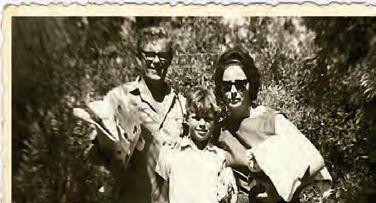

frangipani in Singapore, and the intense sensation of heat and humidity. We lived in an army compound, in a beautiful colonial bungalow. My mother was very good about getting us to try local food, such as rice wrapped up in delicate leaves, which was delicious and fragrant. Those early experiences gave me an enduring passion for travel and exotic foods.
lives—that was something I’d never had.
Later on, when I was sent to boarding school back in Britain, I was so surprised that people had lived in one house all their lives—that was something I’d never had. We were always on the move.

...MY FIRST ACTING
...MY FIRST ACTING EXPERIENCE. I played the white rabbit in a production of Alice in Wonderland. I remember the lines—“I’m late, I’m late, for a very important date.” Even to this day, I always worry about being punctual! I yearned to play Alice, but the role went to a girl called Honor who had long black hair right down to her bottom. I wanted that hair!
rabbit in a production of

yearned the went to a girl called Honor who had bottom. I wanted that hair! shyness, made such a small, tight nucleus. There
Despite an initial shyness, I still had a certain confidence because my family made such a small, tight nucleus. There was just me, my brother and my mother

Walkabout? Actually, I prefer to cycle...21-yearold Jenny outside her flat in Norland Square, London, 1973
and father. That gave one a great deal of strength and comfort.
We had six carefree years of hanging out with Turkish and Greek friends in Nicosia on our breaks from boarding school, before serious fighting broke out in November 1967. The holidays had been all about picnics in the hills, meze in favourite restaurants, trips to the market, and messing about in a boat my dad built. We used to snorkel and find bits of Roman and Byzantine pottery and coins —the area was like an open history book. I lived outside like a sand girl. I could jump o the rocks to go swimming or
waterski. Looking back, I was very spoiled.
But the situation in Cyprus was complicated. I remember coming home at Christmas in 1967. The house looked really beautiful—my mother had lavished all her attention on the decorations. We were there for two days before fighting broke out right outside our home, and we were evacuated to my dad’s o ce on the army base. Cyprus was still one island, but it was never the same. It was very sad. There were barriers everywhere, we had to move into the base, and we could no longer see our friends from both sides.
My parents hated to send us o but, at the time, there was no real option; they wanted my brother and me to have a British education, and the local schools in Cyprus were quite limited. There was a choice between a conventional boarding school and Elmhurst—I said I wanted to go to the ballet school.
In Disney’s film Ballerina, 1963; (right) carefree times by the beach in Famagusta, Cyprus, 1965

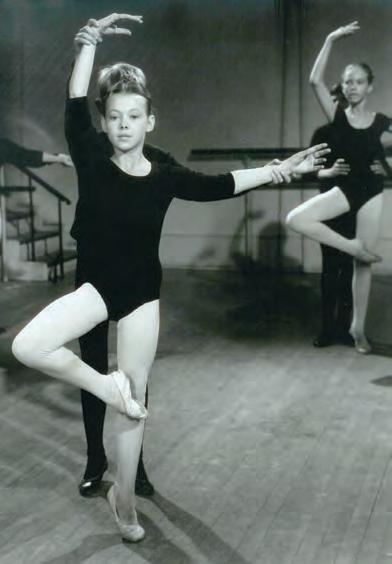
Boarding at Elmhurst had an excitement about it, straight out of my girlhood fantasies and Bunty magazine. It had a cartoon about a ballet school up on a hill, with a strict dance teacher; we had a strict ballet mistress called Helen Fisher. She had a stick and she’d whack you across your ankles if you didn’t do your pliés correctly. Even so, I was very happy at Elmhurst —because I was with a strict dance mistress called she’d whack you if you didn’t do your


I remember the day I met Walt Disney...he was very old, very American and very smiley
small, everyone was very protective of me.
In retrospect, I can see that any separation of a child from its parents has an e ect, and it’s hard to tell whether it was good or bad. The negative side is that it makes you self-contained, but also self-protective, which isn’t a bad thing.
When I was 11, I auditioned in front of him and won the role of a young dancer in the Royal Danish Ballet for the film Ballerina I remember thinking he was very old, very American and very smiley. At the time, I was small, quiet and probably looked young for my age. I was a good dancer, but I knew I didn’t have the dedication or stamina to train to be a prima ballerina.
I went out to screen test in Berlin with my housemistress Miss Timmins and two other girls, including Victoria Tennant. I borrowed Miss Timmins’ old leather suitcase, covered in the most wonderful, exotic travel labels. While I was waiting to hear back, I met Victoria’s father, an agent casting for the film East of Sudan with Anthony Quayle. I got the part of the little Arab girl that Sylvia Syms carries around. I still know her; she’s an incredibly beautiful, gutsy woman. She belongs to another age.

that I’d done a film, that it was fantastic, and that the producer said I was going to be a big star, which is one of the stupid things producers say to child actors. There was a lot of girlish preening, and I’d even started trying to come up with a di erent name, but couldn’t think of one, so I stayed plain Jenny Agutter. The other girls snubbed me—they didn’t like it at all!
I learned very quickly that what happened outside was not to be discussed. It wasn’t a shared experience. After that, I never talked about my career in front of my peers again.
They were both laid-back and horribly conventional. They were happy for me to do something I enjoyed—but really, ballet school was just a stepping stone before marriage. My brother’s education was taken much more seriously because he was a boy, but, at the time, I didn’t see it like that. I was far too excited, going on this great big adventure.
After East of Sudan, I told my classmates ►
When I was 16, I was o ered three films and it cut right across my O levels. I told my parents I’d rather do the films. Now, I’d never advise anyone to do that. But, as it turned out, one of the films was



I found having to act like a star was just too much bulls***
Walkabout [1971], which has become a classic; another was I Start Counting [1969]; and the third was The Railway Children [1970].
Walkabout was a high. We were like this travelling circus, going further and further into the Australian outback, pink and grey birds screaming overhead. We camped out in the desert under the stars and eucalyptus trees. It was so romantic, and unlike any other experience I’ve had since.
happened after I made The Railway Children because there was no film industry at that time in the UK. The government had removed a tax benefit, and no one was making movies. I wanted to continue, so I moved to the US. It wasn’t completely irrational, as my agent was out there. Six months later, I made Logan’s Run and was given a contract with MGM. I found myself in old Hollywood. I’ve never been impressed or enjoyed meeting other
actors—but I was completely starstruck meeting Fred Astaire. He was magic and just amazing, but shy, too; you have to remember that he was both an actor and an extraordinary dancer. I was spellbound.
BE A HOLLYWOOD STAR. I hated having to go to all the parties. I felt uncomfortable at the Oscars and, instead of walking down the red carpet, I snuck in through the back door! I was hopeless and hated all the fuss. I liked acting and being in the films, and wanted the opportunity to work in LA. But I wasn’t interested in pursuing being a star, which was probably mad in retrospect. A publicist said they could get me awards for my work, and I thought, If you do good work, that’s all that matters. I was a bit naïve and very British—I found having to act like a star was just too much bulls***!
...LIKING THE FACT THAT LIFE IS VARIED. As an actor you soon learn that when you’re working they love you, and when you’re not, they don’t. Life is part


No regrets: (from left) in The Railway Children, Walkabout, Logan’s Run and Call the Midwife; (right) with husband Johan
caviar, and part fish and chips—and I love fish and chips! Equally, I love going on public transport, and I also like being driven to a premiere in a limousine— it’s the contrast that keeps life interesting.
Until I got married, there were no attachments in my life. I met my husband Johan when I was 36, got married at 37, and fell pregnant immediately with our son Jonathan. Marriage and motherhood was a shock. It took a while for me to realise I wasn’t “numero uno” anymore.
Johan hated Hollywood—he thought it was ridiculous. Moving back to England [in 1990] was an easy decision, because I can work anywhere. We’re both very

strong characters and, in the end, one of us has to give way. We discuss everything. I’ve also learned that there is more than one way to do most things. The good thing is we have so much in common. We both love interesting food, travel, art and live theatre.
I’VE DONE. Let’s just say that putting on a nun’s habit and a wimple for Call the Midwife [Jenny’s new series] has been very liberating. It also does wonders for a girl’s cheekbones! Was the work good and have the films stood the test of time? I think Walkabout and Equus have become classics, and I’m happy with that. So no—no regrets! ■ As told to Alison Jane Reid
» Jenny stars in the new series of Call the Midwife on BBC One this month
I recently saw this advertisment: “Beach hut for Sale. All-year-round use. Great spot for fishing. Crabbing on the groin. Also brilliant for older children.” Submitted by Anne Woodrow, by email
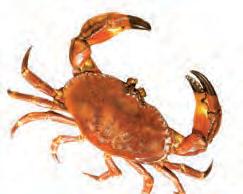



It may be the second-largest planet in our solar system, but at 0.687 grams per cubic centimetre— compared with earth’s 5.51 grams— Saturn is the least dense. Made up of liquid hydrogen, helium, metallic hydrogen and a core of iron, nickel and copper, it’s even less dense than water, so would bob about in your bath (if you could find one big enough).

Space dust in your gutters and diamonds the size of stars? Prepare to be amazed, as astronomer Mark Thompson takes you through…
Not only does the spine stretch in space, but the heart gets smaller, too With less gravitational force than on earth, there’s less pressure on your spine and so it’ll get a bit longer, e ectively making you as much as two inches taller.
In this microgravity environment, your blood also tends to move towards the heart and head. The heart interprets this as an increase in the amount of blood in the body and that it needs to pump less, so it shrinks.
Both e ects are only short-lived and, after a short period of readjustment on arriving back home, the heart and spine return to normal. ►

The sun’s rays are produced by fusion reactions deep within its core. Once a single photon of light has been made, it has an arduous journey to get out of its dense surroundings. It travels 185,000 miles per second—trying to cover a distance of about 435,000 miles—but is constantly bumping into charged particles and changing direction. Eventually, after around 30,000 years, it escapes the sun and, in just 8.3 minutes, travels the last 93 million miles to earth.
Many people are familiar with shooting stars, but the reality is that these streaks



of light are pieces of rock zipping through our atmosphere. In most cases, the rocks are destroyed on entry, leaving only fine dust to drift down to earth. If you run a magnet around the gutter of your house or the base of the walls, most of the dust you collect will have its origins in outer space.
The surface of Venus is so hostile you would either boil, be squashed or dissolve!
Although it’s the second planet from the sun, Venus is the hottest because it has a very dense atmosphere made up of so-called “greenhouse gases”. The 1970 Soviet Venera lander recorded surface temperatures of around 500C.
If the heat didn’t get you, then the weight of the thick atmosphere would crush you (it’s about 90 times the pressure we experience on earth). And, if you survived that, you’d be dissolved by sulphuric acid rain.
There could be life in the oceans under the thick, icy crust of Europa, Jupiter’s moon
Radiation from the initial “explosion”—when it’s thought that both space and time were created spontaneously—has been permeating through the universe ever since. It makes up a tiny portion of the flickering black-and-white dots you can see if your TV isn’t tuned to a particular channel.
The energy from the sun underpins our entire food chain, but down in the depths of our oceans—where no sunlight penetrates—entirely separate ecosystems thrive around hyperthermal vents, drawing energy from the heat. It’s now believed that one of the best chances of finding life


The moon has hardly any atmosphere, so there’s no wind and little corrosion of the fine powdery material on its surface. So the famous imprint Armstrong left on the ground in 1969 is still visible, and is likely to remain so indefinitely.

The star BPM 37093 is the largest diamond known to man
BPM 37093 is a ten-billion-trilliontrillion-carat cosmic jewel, the remnant of a massive dead star. Just compare that to the King of Thailand’s Golden Jubilee diamond, the largest on earth but a mere 546 carats. Stars produce di erent elements during fusion. One of these is carbon—which, in the core of BPM 37093, crystallised into diamond.

elsewhere in our solar system is around similar underwater vents in Europa’s vast sub-surface oceans.
Mars appears red because it’s rusting
Actually, the surface is salmon pink, but this colouring comes from a very common chemical process that we’ve all seen on earth. Rust forms when iron mixes with oxygen and becomes iron oxide, and this is exactly what’s happening to Mars’s surface dust, where iron particles combine with the small amount of oxygen in the atmosphere.
The moon is drifting away from earth at a speed of 1.5 inches per year
At 8pm this month

You can see the Andromeda Galaxy with the naked eye—even though it’s 2.3 million light years away
To a degree, the distance the eye can see depends on the size and illumination of the object under study. The Andromeda Galaxy is so bright that you can make out its elliptical shape using binoculars and its particularly vivid central region with the human eye.
As you probably know, the moon orbits the earth, which spins on an axis. The pull of gravity from the moon produces a bulge on the earth—more pronounced over the oceans than on land— that causes the tides we experience twice a day. The gravity from the bulge tugs a little on the moon, causing it to speed up and, as it does, it moves into a “higher” orbit. This means it’s edging away from us at 1.5 inches per year—though it won’t be doing so forever as it’ll eventually reach a point of equilibrium.
The sun loses four million tons of mass every second
The sun is a vast ball of gas so large that you could fit about a million earths inside
it. Deep inside its core, processes are fusing hydrogen into helium and, in doing so, a tiny bit of material is converted into energy in the form of heat and light. At the current rate of energy production, around four million tons of mass is lost to energy every second. Eventually, the process will leave the sun as a cold dead star, known as a white dwarf. n

Mark Thompson’s A Down to Earth Guide to the Cosmos is published on January 17 (£14.99).
He also presents Stargazing LIVE on BBC2 this month.

Welcome to the pages that help make life

LIFE CAN SEEM POINTLESS without a reason to get out of bed. “But it’s the job that’s redundant, not you. See it as an opportunity and you won’t feel so powerless,” says business mentor Sylvia Marshall, who founded property website cosyhomesonline. com after being “let go”. So set the alarm and spend a working day planning your new life.

2 HRS Follow the money. Claim redundancy pay if you were employed for over two years, insurance (on PPI policies, mortgages and credit cards), notice BLUES you Sylvia property com a your HRS you

and holiday pay. Apply for Jobseeker’s Allowance and use any redundancy money to pay o debts. Then cut expenses to the bone—do you really need Sky?
2 HRS Search for jobs. Polish your CV and hone interview skills while scouring websites, agencies and vacancies. “Don’t dismiss lesser jobs, or you may never work again,” warns Marshall. Government career-development loans are available if you need to update your skills, but beware of paying for courses that go nowhere.


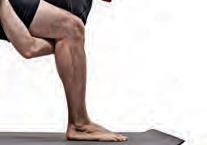

1 HR Network. A third of people who lose their jobs find another through personal contacts, so ask friends, excolleagues and LinkedIn buddies for leads. Job clubs (gbjobclubs.org) can also give useful tips.
1 HR Volunteer. “Find something you enjoy and feel valued in,” says Marshall. It’ll get you out of the house, provide contacts and even kick-start a new career.
2 HRS Live your dream. “There couldn’t be a better time to set up on your own, and you can do it at any age—in fact, the over-50s are more likely to succeed than younger people,” says Marshall. The Government’s New Enterprise Allowance will supply money and mentors (see dwp.gov.uk). But you don’t need funding, as Marshall points out in her e-book Zero to a Million.
“Zero means that all you put in is time. If you want to run a cake shop or joinery business, start by selling at local fairs to see if there’s a demand. Decide on your objectives and strategy, drive it by e ort not loans, and never put your home up as security. Even if you only make £10, you’ll feel empowered.”
IF WITHIN ARM’S REACH IS CLOSER than it was, it’s time to loosen up. Lack of flexibility has been linked to sti ening of the arteries as well as the muscles, which is bad news for the heart. But, however unbending you are, there’s hope, because everybody can be more supple, says Victoria Woodhall, author of Everyone Try Yoga (£18.99).
As most of us slouch too much, she suggests starting with cat stretches (arching and rounding the back), gentle twists, and hip openers (resting a foot on a bent knee). Then give yourself a topto-toe workout with the sun salutation taught at yoga class.
Ah, but which one? Iyengar is ideal if you’re creaky, because it builds up poses and encourages the use of props, while viniyoga o ers a gentle, individualised approach. Health problems? Consider: yoga therapy; Scaravelli-inspired yoga, which focuses on the spine; or restorative yoga, where you just bliss out. And if you decide to take pot luck at the gym, go for a beginners’ course. “It gives you the chance to adapt poses for your body type without looking anxiously at the bendy person next to you,” says Woodhall.

LOCKED OUT OF YOUR EMAIL AGAIN? You need a password that’s easy to remember but hard to crack—which rules out the world’s favourite “password”. It tops a list that includes numbers 1–6, letters a–f, letmein and password1, and all are online for hackers to see. Opt for six or more jumbled characters based on a meaningful sentence or line of poetry, with a mix of upper and lowercase letters and numbers. “Pick a phrase like, ‘I want to go to America,’
and use the first letter of every word except for ‘to’ which becomes ‘2’,” says Deborah Preston of Norton Internet Security. “You’ll end up with Iw2g2A, which won’t make sense to anyone else.”
Once you’ve chosen your master password, you can customise it for di erent websites. Add the first and last letters of the company name at each end (so for Amazon, it’d be AIw2g2An) and even if it’s hacked, your other accounts will stay secure.
“You can’t sit there with a sti upper lip and not get involved,” he said after his tour of the Caribbean last year. And he’s right—joining in is what being a good guest is all about, says Thomas Blaikie, author of Blaikie’s Guide to Modern Manners and columnist at The Lady
But there’s more to it than half-heartedly asking if there’s anything you can do.
fine, but washing the floor could be seen as a comment on your host’s hygiene. Bed linen is also tricky—should you strip the bed or make it before you leave?

Etiquette is all about responding to a situation, says Blaikie, and only you can judge if it’s better to get the taps or the conversation flowing.
That’s di cult if you’re a house guest. “You may be on holiday but it’s not a hotel, so don’t leave the room in a mess as if you expect maids to appear,” says Blaikie. But don’t overdo it: washing up is
Best to ask the host, especially if you’ve only stayed one night. Informality doesn’t mean that anything goes. Monopolising the host’s Wi-Fi or bathroom is bound to irritate, so ask if it’s OK.
“And texting to say you’re running late isn’t the same as being punctual (within 15 minutes of the stated time),” says Blaikie.
Saying thanks (an email will do) is non-negotiable, as is eating what’s put in front of you—so if you’re on a restricted diet, o er to bring your own food. And don’t forget a gift. “You’ll rarely go wrong with a bottle of good wine,” says Blaikie —as long as you don’t ask to drink it.
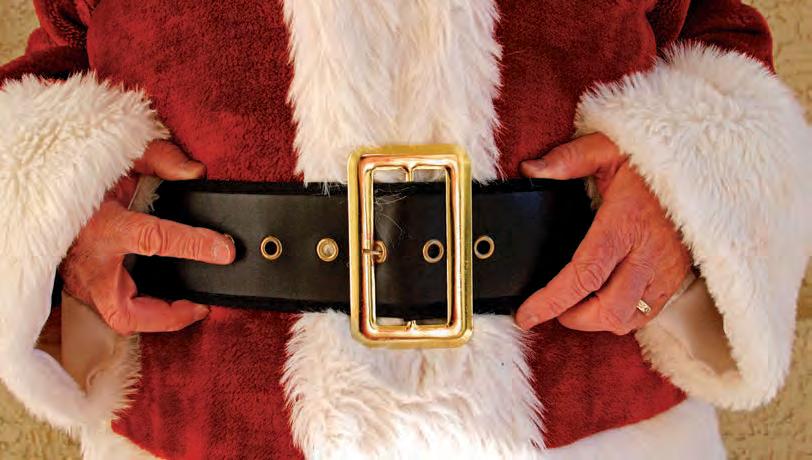
, according to the British Dietetic Association. If the pattern continues, we could be 3½ stone heavier by January 2023. The best way to shed it is not, as you might think, by dieting. Research shows that 80% of dieters put the weight they’ve lost back on and, five years later, 50% are heftier than ever. Instead, try tricking your body into accepting a leaner regime. “Small changes can make a big di erence to your weight,” says obesity expert Dr Andrew Brewster. By cutting 300 calories and burning 200 through exercise every day, you could be two stone lighter this time next year without dieting. Try:
l Eating mostly plants to cut down on fat and up your intake of nutrients and fibre.
l Serving posh restaurant portions—no bigger than your palm for meat and fish, a matchbox for cheese, and a tennis ball for fruit.
l Taking specs to the shops if you need them. Then you can read the small print and decide if that chicken korma meal (1,340 kcal) is worth the weight gain.
l Questioning health-speak. If that “granola” is packed with choc ’n’ nuts, it’s a cookie.
l Talking, texting and phoning standing up. Sitting takes half as much energy, and long spells can reduce life expectancy.
l Limiting screen time. Almost two-thirds of successful slimmers watch TV for less than ten hours a week, says the US National Weight Control Registry.
l Making a date with the scales. Most people who’ve shed more than 30 pounds and kept it o weigh themselves weekly.

QUICK! THE worst winter can throw at us is still to come, so act now to protect your plants—and wallet.
Spread well-rotted manure, leaf mould or bark around plants to shield their roots from frost, and while you’re at it, snip old leaves from hellebores and cut back the side shoots on wisteria. Check that containers are raised o the ground and surround them with bubble wrap to keep the root ball warm—the only time you should use bubble wrap because it traps moisture that turns to ice. Use horticultural fleece (£8 from Homebase) over tender plants, palms, and tacked to frames to cover climbers. Then scatter paths with grit or sand (kinder to plants than salt) to stop ice forming. Kick a ball into the pond to provide an air hole for wildlife.
Should bitter weather strike, brush snow from shrubs and trees with an upward movement to stop boughs breaking, and top up any soil that’s shrunk away from new plants. Cover frail plants in east-facing sites with black plastic to prevent them defrosting too fast in the morning sun. And here’s a challenge—do all this while keeping o the grass. “If you don’t, you’ll wear out the lawn and will have to re-seed it,” says Alan Titchmarsh.
l Hooray, I’ve passed my annual appraisal! I know, it’s the least you’d expect, but until last month there were no regular checks on qualified doctors. Now appraisals are compulsory with reviews every five years. If I fail, I’ll be struck o . l So that’s where I left the swab. Last year, 161 patients woke up after surgery with a souvenir of their treatment inside. It’s the most common of 326 “never events” (so-called because they should never happen) reported last year, so choose your hospital with care.
SOURCES: BBC; CITIZEN’S ADVICE; DEPARTMENT OF HEALTH; DR FOSTER HEALTH; NHS CHOICES; NHS INSTITUTE FOR INNOVATION & IMPROVEMENT; THE KING’S FUND; THE PATIENTS’ ASSOCIATION
l Thrombosis kills more people than superbugs. Ten times as many people —25,000 a year—die from venous thrombosis contracted in hospital, which makes those surgical stockings look almost attractive.
l You have the right to go to any NHS hospital. Unless you need urgent treatment or maternity or mental-health services, you’re not limited to the
few o ered by Choose and Book. Tell your GP where you want to go, and if the Primary Health Trust that controls budgets won’t play ball, complain to their Patient Advice and Liaison Service (PALS).
l Don’t get sick at the weekend. Deaths increase by one-third if you’re admitted then, because few senior sta are on duty and there’s less access to tests. According to health
charity The King’s Fund, it adds up to 500 more deaths a year in London alone.
l ...or the first Wednesday in August “Black Wednesday” is when newly qualified doctors hit the wards, and death rates rise by 6%. Things should improve this year, thanks to compulsory jobshadowing, where newbies learn from their predecessors.
l You could be dropped from the waiting list if the hospital decides you no longer need or want treatment, so answer any letters straightaway. If you make it onto the list in the first place, that is, because hospitals are told not to add patients unless they can be treated within the 18-week target.

l The complaints department is downstairs. Most hospitals have a PALS o ce, so pop down there or send a friend if you’re aggrieved.
l Check out my reviews. You’ll find TripAdvisorstyle ratings on nhs.uk and also a list of the best and worst hospitals at Dr Foster (drfoster intelligence.co.uk).
l Small is not always beautiful. If you need special
care, you’ll do better in a centre of excellence than a cottage hospital that lacks equipment and expertise.
l It’s not just the sta nurse who wears blue. At some hospitals, unqualified care assistants do, too. Check the dress code on your hospital’s website or find out who you’re talking to before asking their advice.
l I can’t throw you out without warning. If you haven’t been consulted about your discharge or don’t have su cient support, ask for a review. Then you shouldn’t be discharged at night, as happens to almost 8,000 people a week.
l You’ll need plenty of visitors. Lack of care when it comes to feeding, pain relief and going to the loo tops the list of patients’ complaints. But as the number of nurses has been cut by 6,000 in two years, family and friends may have to help out.
l Stay on good terms with your GP. They’ll be running most of the clinical commissioning groups responsible for hospital admissions after April, when the NHS is reorganised.

I remember Molly sitting in the middle of the garden. I was only eight years old. It became one of those stories told and retold so many times that what I recall now might not be exactly what happened. But the fact remains: Molly sat in the garden and died.
“She’s upset because George has died,” my Mum explained when Molly first started her vigil.
For three nights, my sister and I barely slept. “She’ll get a cold!” we sobbed, as we tried to explain why we’d draped the picnic blanket over her shoulders on the second evening. And after the third night, she’d died. For an eight-year-old, the death of your pet chicken is pretty traumatic.

My mum and dad claimed that Molly had died of a broken heart. A few days prior to all this, George, our cat, had died. The two of them had never exactly been friends, but they would chase each other round the garden and she would peck the top of his head while he ate his dinner. It was more of a love-hate relationship, but it obviously ran deep.
Chickens don’t get credit for being the brainiest of animals, but after a few days Molly must have realised that wherever he’d gone, he wasn’t coming back. So she stopped looking for him and—so the story goes—she nursed her
broken heart in the middle of the lawn until she died. The story of Molly went down in the annals of our family history, a story told at countless parties (though never while eating chicken drumsticks).
I thought of this as I stood on one of the medical wards, where I’d been asked to see Mr Thomas. His doctors were worried because he was depressed and wanted me to talk to him. I introduced myself, and he broke down in tears. His wife had died eight months ago.
In the first year after a spouse dies, there’s a 40% increase in death rate
“It broke my heart when she died,” he said, as he dried his eyes. “I think that’s what’s made me end up in here.”
I’d have dismissed this idea if it weren’t for the story about Molly, and also for something I’d read only a week or so
earlier in a medical textbook—for the remaining partner in the first year after a spouse dies, there’s a 67% increase in heart attacks, with a 40% increase in death rate. It looks as though you really can die from a broken heart.
That seemed incredible to me. How can grief be implicated in something as physical as a heart attack? The mind is obviously more powerful than we thought. I think it shows how doctors need to learn to start seeing people holistically.
After our chat, I prescribed an antidepressant and arranged for counselling. As I made my way back to my o ce I passed the canteen and looked at the menu: chicken drumsticks and chips. I had the lasagne instead.
Max Pemberton is a hospital doctor, and the Mind Journalist of the Year 2010
WHAT DO THEY DO?
Corticosteroids, to give them their full name, are manmade versions of a naturally occurring human hormone called cortisol. They’re mainly used to reduce various forms of inflammation. It’s important to realise they’re di erent from the steroids that body-builders use, which are called anabolic steroids.
HOW DO THEY WORK?
Steroids are powerful drugs that act directly on the cells in the body to decrease inflammation and suppress the immune system.
HOW DO YOU TAKE THEM?
Steroids taken for asthma or other lung conditions are usually inhaled as an aerosol. In emergencies, such as a life-threatening asthma attack, they can be given as an injection. Steroids also come in creams for skin conditions and tablets (often when the condition is flaring up).

SIDE EFFECTS?
WHO TAKES THEM?
They’re used in the treatment and management of a range of conditions, from eczema, asthma and allergies to inflammatory bowel conditions such as Crohn’s disease and ulcerative colitis. They’re also used for autoimmune diseases such as rheumatoid arthritis, and even some cancers.
When used in the short term, this group of medicines is very safe and few people have any side e ects. Long-term use can increase the risk of infections. They can also cause weight gain, high blood pressure, osteoporosis, diabetes and cataracts. Longterm cream use can make the skin thin and fragile.
SOME COMMON STEROIDS: Prednisolone, betamethasone, cortisone, dexamethasone and hydrocortisone. ■
NEXT MONTH: diabetes drugs

How can you stop feeling frazzled by the year’s end?
Not too many cups of kindness, please.
Stepping up your booze intake is the worst way to ward o seasonal stress as you see in the New Year—it’ll just make you disinhibited. (Is there really any point in telling Aunt Janet exactly what you think of her as you knock back the champagne?) Drink more water instead—being hydrated will make you and your New Year a whole lot happier.
In case you thought you didn’t need to chill out, bear in mind that January is the busiest month for divorce lawyers. And, after all, who wants to be a statistic?
and other strong characters gather in one place. Pop out to feed the birds or go to the supermarket to buy that last-minute smoked salmon. Use the checkout queue to chill out rather than stress out, and think about all the nice things in your life. And if you can’t get away physically, get out your iPod or other portable music player, pop those headphones on, and listen to Barry Manilow’s “It’s Just Another New Year’s Eve”.
Belt out Auld Lang Syne. It’s well known that singing relieves stress. A couple of choruses of that traditional New Year anthem—let’s face it, you only know the chorus anyway—will do wonders for your mood. If your voice isn’t up to it, try a few deep-breathing exercises instead. Inhale for four counts through your nose, hold for 16, then breathe out for eight counts through your mouth. Focus on each breath and push all distracting thoughts out of your mind.

walk and burn o your nervous energy? Take a few overexcited members of your the nice things in your life. physically, get out your headphones on, and listen Just Another New Year’s Eve”.
Go for a brisk walk. Stress hormones
prepare your body for a physical response. So why not go for a brisk 15-minute winter walk and burn o your nervous energy? Take a few overexcited members of your family along with you—it’ll do you all good. it, you only know the chorus counts through your nose, hold for your mind.


Give yourself a winter break.
Give yourself a winter break. Think of ways to grab a few minutes’ escape from the mayhem that ensues when too many family members




My husband Glenn and I had the ideal work-life balance running a motorhome accessories business. But in September 2011, shortly before I turned 50, I went to the doctor because the occasional
bleeding I had after sex was getting worse.
It was only just over two years since my last cervical smear, but my GP took a new one. It came back showing severe cell changes, which were treated at my local hospital in Stevenage. I thought that was the end of it, and happily went o on holiday. But I came back to a pile of letters asking me to go back to the hospital. When I did in December last year, I was told I had cervical cancer. Christmas and New Year were surreal—I didn’t know whether I’d be dead in a year.
Tests showed the cancer hadn’t spread, but I had to go to London five days a week for seven weeks for chemo- and radiotherapy. Doctors said there was a 70 per cent chance I’d be cured, and fortunately after four months they couldn’t see any more sign of the cancer.


I was lucky to have tremendous support from my family and the online forum run by Jo’s Cervical Cancer Trust (jostrust.org.uk). I didn’t know at the time that 40 per cent of cervical-cancer cases are in women aged 50 and over, so I’m glad I went for another smear and didn’t simply put those little changes down to the menopause. Alison Ward
Some British health experts want teenage boys to have the cervical cancer jab as well as girls, because it cuts their risk of getting cancers of the tonsils, tongue, head, neck and anus, all caused by HPV (human papillomavirus). In fact, HPV is responsible for approximately five per cent of all cancers. The vaccination is standard for males in Australia and advised in the US and Canada. You can’t get it on the NHS, but you can have it privately in the UK— at a price! Expect to pay about £500.
● On the one hand, the evidence from Australia is that pre-menopausal women find it easier than men and older women to shake o rhinoviruses that cause the common cold. This suggests that female hormones boost immune protection.
● On the other hand, a survey of some 3,000 people by a UK-based friendly society found that nearly half of men exaggerated their symptoms: a cold became flu, a headache became migraine.
● Which to believe? Our friends at male healthinformation charity the Men’s Health Forum (malehealth.co.uk) point out that the immune research was in a serious medical journal, while the survey was a bit of fun. But they would say that, wouldn’t they?
DOCTOR, DOCTOR, IS MY WEIGHT ALL IN MY GENES? HEALTH





Dieting is a national pastime, especially after Christmas. The British Dietetic Association estimates we put on an average of 5–7lbs over the festive period, so it’s hardly surprising that, come January, we’re joining a gym and making another New Year’s resolution to shed those extra pounds (just like last year).
While many of us are either on a diet or thinking about it, we all know people who seem to eat anything they like without gaining an ounce. Since they live in the same “obesogenic” environment as the rest of us—with access to calorierich foods and labour-saving devices— why aren’t they getting fat, too?
The answer lies in our individual genetic make-up. A particular sequence known as the FTO (fat
mass and obesity-associated) gene determines who’ll become obese. Studies in humans show a consistent association between variations in the FTO gene, body fat and obesity. On the face of it, if you have the wrong variant of the FTO gene, it looks as though you’re destined to struggle with your weight. Unsurprisingly, some people see this as a reason to give up. After all, if your genes are making you fat, there isn’t much you can do about it. Or is there?
A growing number of studies show that the e ects of the FTO gene can be modified largely by lifestyle changes, particularly physical activity. For example, in one study, physical activity reduced the influence of the FTO gene on obesity predisposition by around 30%.
Exactly how physical activity does this isn’t well understood, but the benefit is real and important. If you’re determined to lose those extra pounds, remember that consistency and hard work can achieve your weightloss goals, even if you have “fat” genes. Genetics is not destiny.
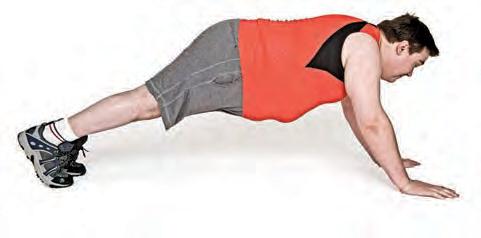 Dr David Ashton of Healthier Weight
Dr David Ashton of Healthier Weight
1. Extend both hands in front of you, arms crossed, palms facing each other. Nod your head forward, keeping your shoulders pulled down, and push your hands away from your body. Feel that gentle pull through your upper back and neck muscles.
2. Sitting with feet flat on the ground, reach your left hand over your right thigh and grip under the seat, then gently twist to the right, keeping your back straight, hips square, and facing the front. Keep your abs contracted, feet on the floor and thighs parallel, then switch sides. Great for your lower back. ■


How to make New Year weight-loss really work for your looks
I know it’s January, I know we’ve all been overeating for weeks, and I know we feel we need to get our lives back under control and go on a diet. But I’d caution you to resist this urge, for the good of your looks and your well-being. If you suddenly throw yourself into a crash diet, it’s likely to a ect three areas that you really don’t want it to: your skin, your hair and your mood. If you cut fats and oils out of your diet, skin tends to lose its luminosity, and the first place that sudden weight

loss shows up in is sunken cheeks rather than a concave tummy. Hair cells grow fast, so need a ready supply of nutrients. If your body is low on nutrients, your hair is the first thing to lose its ration (though you won’t see the changes for 100 days, then you’ll wonder what’s happening). And low-carb diets, while very e ective, can leave your mood flatlining.
That said, we all need to do something to counteract that festive indulgence. So polish o the last mince pies, then start making a few clever tweaks to the way you eat and drink, which will benefit your looks as well as your waistline.
• Start the day with a big mug of hot water with a squeeze of lemon in it. It’s good for the digestion, and will help hydrate your body.
• Eat some protein at every meal. It helps keep you full and is vital for hair growth.
• Eat more oily fish (salmon, mackerel, sardines) to load up on essential fatty acids, which are great for skin health as well as for your heart and brain.
• Pack in as many vegetables as
Defiant Beauty, trial sizes, from £5–£15, beautydespitecancer.co.uk Most of us, alas, know someone with cancer—and so know how cancer treatment a ects the skin, leaving it oversensitive, itchy and flaking. This new all-organic range has been developed by cancer patients for cancer patients, to calm chemoravaged skin with gentle, oil-based, healing ingredients. Lovely stu .


you can. Speedsteam them in a pan with a spoonful of water and a knob of butter (delicious, and it helps your body absorb the fatsoluble vitamins they contain).
• Step up the wholegrains in your life—wholewheat pasta, wholegrain bread. They’re more filling than their white counterparts and contain more nutrients.
• Stop buying cakes and biscuits. Stock up instead on healthy snacks such as nuts, seeds, plain yogurt, carrots and hummus, avocados and oatcakes.
• Drink plenty of water (then you won’t mistake thirst for hunger), and have a few alcohol-free days each week.
Alice Hart-Davis is an award-winning beauty journalist who writes regularly for the national press, and is the creator of Good Things skincare.

New from Indeed Labs (those clever people who came up with skin-smoothing Nanoblur) is Eysilix, an eye cream crammed with ten active peptides that o er hope of both immediate and longer-term improvements by lifting, de-pu ng and tightening the eye area and brightening dark circles, too. (Boots, £24.99).
In this age of high-tech beauty, it’s always thrilling to learn that, sometimes, our grannies were right. The idea of putting vinegar into the final rinsing water after washing your hair has been formalised into products such as Klorane’s Camomile Clarify & Shine Rinse (£10, klorane.co.uk) and Phytocidre’s Rinsing Vinegar (£12.50, lookfantastic. com). The idea is that the vinegar helps to neutralise the dulling e ects of limescale in hard water, thus giving your hair an impressive shine. Even easier, DIY it by sticking a tablespoon of vinegar into a jug of warm water and pour that over your hair after washing.


Angela La an, 43, from London, loves Balance


Me’s Anti-Ageing Face Serum —a “naturally active” serum with antioxidantrich blackberryseed extract, as well as the moisturising hyaluronic acid and firming spilanthes acmella flower extract.
“It just melts into my skin and leaves it smooth and hydrated, with visibly fewer lines and wrinkles —and the smell is heavenly!” (£36; balanceme. co.uk) ■

Why

Good citizens, I know you’ll always think
the best of me, and most of the time I won’t disappoint you. But recently who informed me that I’d driven into the forecourt of a petrol station, filled up and promptly driven o !
I was contacted by my hire company,
I was incredulous, and could hardly entertain the thought. Obviously there was no intent, and my lease company paid up immediately anyway. But I was determined to visit the store to see the CCTV and the scene of my apparent crime.



My recollection was
My recollection was that I paid, as I always do—but when I finally saw the video it seems I filled up, disappeared to the toilet for a while, and then drove o . I must have been
the video it seems I filled up,
and then drove o . I must have been in a daze.
This apparently happens about a couple of times a day to right-minded civilians in our petrol forecourts, but with automatic number-plate recognition we’re all contacted and told the error of our ways. No criminal o ence is committed if it was an accident, but it could be a police matter if you don’t have the means to pay.
The supervisor also told me that, going through after filling up your car, you’re given seven days to pay bill agency. I could have done without the stress of knowing that I’d

Clyde” on my local petrol station, accidental runner from the forecourt after being caught up in late-night baby
The supervisor also told me that, in the event of your credit card not going through after filling up your car, you’re given seven days to pay for the fuel by other means, after which your bill doesn’t go to the police but to a debt-collecting agency. I could have done without the stress of knowing that I’d accidentally done a “Bonnie and Clyde” on my local petrol station, but in the event that you ever do an accidental runner from the forecourt after being caught up in late-night baby feeds and early-morning nappy changes, be reassured that it’s embarrassing but
be reassured that it’s embarrassing but not catastrophic.
And if you’re in any doubt, just blame
the children!
Donal answers your questions. Please email queries to excerpts @readers digest. co.uk
QDo you have any suggestions for what to do when a trip to the cinema is ruined by the sound of people munching food all around you?
AIt’s bad enough being irritated by the crunch of popcorn, but how
had gone to the cinema to escape the hunger pangs— only to be swamped in carb heaven!



about the to su er the smell pizza

Donal MacIntyre is an investigative journalist and a former presenter of ITV’s London Tonight
chomp of pizza? On a recent trip to a major cinema chain with my wife, I found myself in front of a group of women eating pizza. The aroma of burned pineapple and ham could have been some “watch and smell” cinema experiment, which proved annoying to the nth degree. To add to my woes, my wife was on a carb-free diet and

Brace yourself for the news that traumatised me and will doubtless rock your world, too: it seems that in the nation’s schools, community halls and homes, the naughty step is rapidly falling out of favour.

decidedly out of sync with the
what compensation
I tried my best grumpy glances, but to no avail. Sadly, as seems the norm these days, cinema ushers are absent when you need them most, so we had to su er the smell throughout half of Frankenweenie. (And the pizza aroma was decidedly out of sync with the artfulness of the film!) Faced with such an intrusion into our night out, I wondered what compensation I’d be entitled to? Our outlay of £16.80 for the tickets, plus an extra £2 for our 3D glasses, was fully refunded upon complaint, plus we were given a set of complimentary tickets. This would have been a result to you or me, but my wife still wants someone to pay for the extra two pounds she put on after she bought a pizza on the way home…
No longer can mischievous little ones be placed at the bottom of the stairs and forced to confront the errors of their ways.
Welcome instead to the age of the “thinking chair”. In our overprotected world, no one is wrong any more— they just have some misguided thought processes.
Well, let me guarantee readers that there will be no thinking chairs for the service providers I hold to account on your behalf. There will always be a naughty step for those who fail to deliver on their promises! ■

If you know all the tricks, rail travel needn’t cost an arm and a leg
Train fares have gone up yet again, but being savvy could save you hundreds of pounds. Here are five golden rules to follow.
RULE ONE Buy early and avoid the walk-on fares
Advance tickets are where the real savings lie. Never turn up on the day of your travel and buy your ticket last minute; book early to get round the extortionate walk-on fares.

“Which stations are we between at the moment?”
The best time to book is 10–12 weeks before your trip. This is when tickets are released and prices are at their lowest. The only downside to an advance ticket is that you’ll be tied to a specific time, date and train. But if you buy at southernrailway.co.uk and don’t use the ticket for any reason, they’ll refund the money. Plus, they cover the whole country and not just the southern counties.
RULE TWO Buy online for extra savings
Nationalrail.co.uk is the best place to start planning your journey, as it covers
all train routes across the country. You can find out prices, quickest routes and train times, and even book your tickets through this site.
Daysoutguide.co.uk is a great discount site. They’ve got a free newsletter that delivers all the latest deals and o ers straight to your inbox. Sign up to your local train-operator’s newsletters, as they’ll send you notice of special o ers through the year. Sometimes these are really impressive —up to 90% o the normal fare.
It may cost less to split your ticket into several singles than to buy one single if you’re making a long journey. Find out where the train is stopping on the way to your destination, and check the price of combining a number of singles rather than one ticket for the journey.
There are several railcards available:
● 16–25 Railcard for young people: also vaild for full-time students of any age.
● Family & Friends Railcard for an adult with at least one child under 15. Up to four adults and four children can travel on one card. Get 60% o kids’ fares.
● Senior Railcard for the over-60s.
● Network Railcard saves on most fares in the South East. You can get discounts for yourself and three adults. Plus, you can take up to four children (15 or younger) with you and they can save 60%.
These railcards all cost £28 for a year or £65 for three years and save you a third o ticket prices.
● Disabled Persons Railcard costs just £20 for one year or £54 for three, and you can save yourself plus a companion a third o rail fares.
RULE FIVE Get money back for delays
If your train arrives at your destination more than an hour late because of delays, you’re entitled to a minimum of 20% of the cost of the ticket paid in travel vouchers. You can claim for a cancelled train if you weren’t advised of the cancellation before ticket purchase. Make claims at traindelays.co.uk.
One of the best ways to get on top of your money is to have savings “pots” set aside for di erent life events. Here are the must-haves.
Savings safety net With jobs more unstable than ever, it’s vital to have a safety net—a pot with enough in it to cover your essential bills for at least three months, preferably six. Work out how much you need each month for your necessities, multiply that by three (or, better, six) and put that amount into an account that you don’t touch except in a crisis. In a recent survey conducted by HSBC, 30% of people said they had less than £250 set aside for emergencies— which would last only about five days for the average household.


Travel There are many ways to do your fortnight in the sun on the cheap, but buying it on a credit card and then paying interest for months afterwards will put the price up. So if you want a holiday without having to count pennies, it’s well worth opening a savings account specifically for your holidays. Work out how much you can a ord to set aside (maybe £50 a month?) and then use it to buy the holiday and pay for fun while you’re away.
Mending As the life of common household goods seems to be getting ever shorter, it’s prudent to have a little set aside to make sure your labour-saving devices and luxuries ►
are protected should they fail. Of course, if you have homecontents insurance this should cover the main items. However, opening your personal “insurance account” will mean you don’t have to pay for extended warranties, which aren’t used that often anyway.
Christmas Avoid the January debt hangover by setting up your own fund from this month onwards. The Post O ce has a specific Christmas savings account, as do many credit unions, but you can set up your own using an ordinary savings account and putting money in regularly. Or create a special piggy bank at home, filling it with every £2 coin you find. This can mount up to something quite sizeable over the months!
1 Picturenation.co.uk
New photographs are needed every day for company websites, public-sector newsletters, corporate presentations and thousands of other uses. This means anyone with a camera and an eye for a good image can sell photos for decent money. Your earnings depend on the resolution and quality of your photos. Picturenation pays you 40% commission on all pictures, beginning at 40p for a subscription website resolution and going up to £30 for highest resolution.
2 Parkatmyhouse.com
Use your drive or your garage to make money!
ParkatmyHouse covers all the UK, and you can put your vacant parking space on the site for anyone coming to your area to park in…for cash! If your home is near a railway station or education centre, your space and bank account certainly won’t feel neglected. It’s free to list on ParkatmyHouse, and you could make £100s per month.
3 Ratesetter.com
If you’re looking for an alternative to the paltry savings
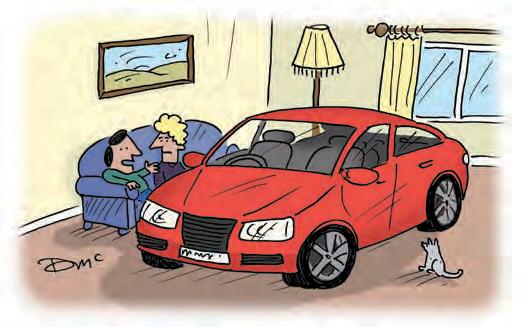
“Try and ignore it, Barbara. Just think of the money we’re making”
rates o ered by your bank, then head to RateSetter, where lenders make an average return of 5.5%. RateSetter works as an online financial community by bringing lenders and borrowers together and cutting out the banks. Borrowers are categorised according to their risk quotient. Lending to higher-risk people with poorer credit ratings provides better returns.
You decide who to lend to and what rate you’ll charge, as well as how long to lend your money for (choose from one to five years) and, of course, how much you want to lend (from £10 to £25,000). Also, the site puts some money aside every month into a slush fund that pays out to lenders if any of their borrowers default, so you’re covered there.
4 Pineconeresearch.com
Online surveys are a great way to earn a quick buck. PineCone Research trumps all other online survey websites out there by giving you £3 for every completed questionnaire. Registration is quick and simple (not to mention free).
5 Designerdesires.com
If you have designer clothes, shoes or accessories that you’d like to o oad, this website does a good job of selling them for you. They charge a whopping 40%, but once you’ve sent the item they do everything for you, including authenticating it and wrapping it nicely in tissue paper when it’s sent to the buyer.

Spent too much money at Christmas?
JASMINE’S PODCAST at readersdigest. co.uk/magazine has plenty of tips on how to economise again.
Save money by selling the car and just using the local car club for odd journeys. Zipcar.com, which has more than 11,000 cars for rent in certain towns across the UK, is o ering you an exclusive £40 free driving credit when you sign up to their service. It’s valid until January 20, 2013—just use the code smith40 at zipcar.com
Commodities. These are products we use in some form every day. They can be “soft commodities” such as sugar, tea and pork bellies, industrial metals such as zinc or iron, and energy fuels like oil and gas. Commodities investors generally buy and sell the products through commodities brokers.
...is have just one thing as your New Year’s resolution. Studies show that if we decide to change one thing in our lives, rather than several at once, we’re more likely to do it. Pick something that gives you several benefits at once, like walking home from work every day. This will give you exercise and cut down your costs, including that monthly gym fee. Or give up booze for a month —it’ll make you healthier, wealthier and more productive. Save more by lowering alcohol intake over time if you survive the dry spell. ■




Jasmine Birtles is a personal finance writer and the founder of moneymagpie.com

NEW! Every month a guest chef shares their favourite quick recipe
After Christmas feasting on traditional British food, I always feel it’s a nice change to introduce some ethnic and mildly spicy dishes back into your kitchen. Flavoursome rice and vegetables with lean chicken is a truly delicious combination, and also extremely cost-e ective after blowing a king’s ransom on the Christmas shopping list!
This is as simple as it gets when it comes to good home cooking— from start to finish, it’ll take you no more than an hour.
Owner of Soho restaurant and caterers Randall and Aubin (randall andaubin.com), Ed Baines is a TV chef currently working with the BBC on two new series.
4 whole chicken legs (thighs and drumsticks)
2tbs olive oil
2 carrots, chopped
1 onion, chopped
2 cloves garlic, chopped
1 lemon, zest and juice
200g green beans, chopped
250g basmati rice
1 litre fresh water
200g peas
250ml Greek yogurt
1. Cut the chicken legs into 2 pieces. (You could use breasts instead, but they’re not as tasty.)
2. Score the meat and rub in the spices, curry paste and sugar.
3. Pour the oil into a large saucepan and heat gently.
Lay the chicken in the oil and cook over a moderate heat for 10 minutes each side. Remove
SPICE MIX
1tsp turmeric
1tsp cumin
1tsp sugar
1tbs Madras curry paste
and place onto an oven tray, and roast at 160C/ 320F/Gas Mark 3 for 40 minutes.
4. Add the carrot, onion and garlic to the same pot you cooked the chicken in, and stir over a moderate heat until softened. Add the lemon zest, green beans and rice, and stir well.
5. Add the water with a pinch of salt, cover and bring
to the boil. Turn to a moderate heat and cook until all the liquid has been absorbed (about 20 minutes). Pull from the heat, stir in the peas and lemon juice, and allow to sit for 5 minutes with the lid on.
6. Now flu the rice with a fork and serve with the spiced chicken. Drizzle over juices and a spoon of Greek yogurt ■

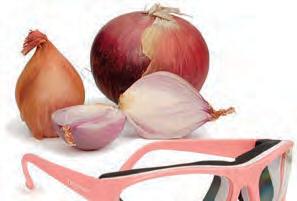


Cutting piles of onions can be a teary experience, owing to the sulphurous gases released into the air. Speed helps, as does chilling the onions. A mandolin slicer hastens all veg chopping, but a fail-safe option is to don a pair of these onion goggles (I kid you not), available in a range of colours at Amazon. Swimming goggles would do if no one’s about, but you might have to explain the mark on the bridge of your nose!

Paul A Young (pictured below), who grew up in a Durham mining village, is one of our most talented chocolatiers.
Although his use of ingredients such as chewing tobacco, soy sauce, Marmite, celery, Sichuan pepper and Stilton is a bit left-field, this modern-day Willy Wonka is touched with culinary genius (his salted caramels are to die for). Buy his handmade chocs at paulayoung. co.uk, and in his as much as possible.
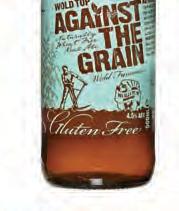

Ever-resourceful farmers coping with a fluctuating agricultural market are diversifying as much as possible. One option is to utilise home-grown barley and turn it into beer. It’s also a good way of using farm buildings— as soon as you can say “fermenting hops”, you’ll have a microbrewery to host tastings, brewery tours, and maybe even a farm shop.
maybe even a farm shop.
Nigel Barden is the food and drink presenter on Simon Mayo’s show on BBC Radio 2, and chairman of the Great Taste Awards
Making chicken stock is easy. Break up the cooked poultry carcass, place in a large pan, add 2 onions (quartered), 2 carrots (roughly chopped), a bay leaf, peppercorns, and any other bits such as celery, leeks or sprigs of thyme or rosemary. Add any giblets, but not the liver—it’ll turn bitter. Add salt later, before serving. Cover with water, bring to the boil, spoon o any scum, then simmer for 2–3 hours, topping up the water to keep the bones covered. Finally, sieve the lot. This will yield a litre of excellent stock, which can be frozen—it’s perfect for a gravy base, or a tasty soup.










Tiny tubers may produce tiny crops, so why not go large?
QPotato sets are expensive and seem in short supply. Can I use small potatoes left over from last year’s crop instead?
AWell, you shouldn’t really, but I guess needs must if you have no alternative. The danger is that numerous small ones left in the bag could contain many that came from one regressive plant— so planting these as sets will grow lots of plants that produce more small ones.

APlant out leftover large potatoes for the best results

Secondly, they could be carrying pests such as eelworm, diseases like blight, or even unseen viruses. They’ll still work, but it’d be better to use bigger potatoes if you have any left over—they’re more robust.
QI was very jealous of my neighbour’s hanging baskets and tubs last year, so I want to do even better. Trouble is, I’ve never grown much before. Where do I start?

Cheat! Go to a big garden centre in another area at the beginning of May, at a quiet time of the week. Ask for help and be prepared to pay for your pleasure. Buy three or more ready-prepared matching baskets and get them to make you up three or more large tubs if they don’t sell these already. Bring them back and put them somewhere warm and sheltered and almost out of sight. Leave them there for a week or two
but it’d be better to use bigger ready-prepared matching

before moving them to their final positions. Then just water, feed, and look smug!
QEverybody at work decided to grow hot chilli peppers— we bought plants and grew them in pots on our windowsills. They were great—there were so many di erent sizes, shapes and colours. But we were confused: many looked good, but were too hot and had little flavour. Which are the best chillis for cooking?
AThe Scoville scale is used to judge chilli heat. It’s only a rough indication, but it helps avoid the silly ones when buying seed. Be warned: the hottest peppers are so hot they become unusable except for wagers!
Bird’s-eye chillis—those little pointed conical ones—are often hotter, but varieties with great numbers of fruits may be more ornamental than culinary. Likewise, those with weird colours other than unripe green, ripening to yellow or red, may be very hot but not well flavoured. Those resembling small-tomedium carrots are likely to be jalapeño sorts—they’re milder ones for pizza, salsa and bland dishes. Those the same shape, but much smaller and thinner, are likely to be the hotter, cayenne-type chillies best for drying.
Those small, blocky ones (a bit like a Chinese lantern with a pointed bottom) will probably be habaneros. These are hot and also the tastiest—they’re for sweat-inducing dishes and sauces.
Bob Flowerdew is an organic gardener and a regular on BBC Radio 4’s Gardeners’ Question Time. Send your gardening questions to Bob at excerpts@readersdigest.co.uk


Get seeds and tools ready for the coming season. On bright days, check soft fruits, bay trees, roses and vines for overwintering scale insects (they look like small helmets or brown buds, but in the wrong places)—rub these o into a bowl of
If your plant needs a bigger pot, first put the small pot into the bigger one and fill the space around the pot with soil. Remove the small pot, then ease your plant out and fit it into the hole that’s the right size.
soapy water. Sow very little, though you could try early cucumbers and tomatoes (they may struggle, but the results are worth it). Pack bought sweet potatoes in pots of damp sand; keep them dark and warm to force shoots for potting.

» Email your gardening tips and ideas— with photos, if possible—to excerpts@ readersdigest.co.uk. We’ll pay £70 if we use them on this page.

It’s time for squirrels to work o all that pent-up energy

Watch out for grey squirrels playing treetop tag. It’s the mating season, and when a female’s in heat she wafts pheromones around to alert the males. She then plays hard to get by racing along branches, followed by her admirers. Only the keenest can keep up.
It’s hard work, but squirrels tend to be fit and wellfed in January because of their remarkable ability to hide food. In autumn they’ll bury up to 3,000 nuts, and can recall where they’ve hidden around 90% of them—using trees and bushes as landmarks to get within some two inches, then their sense of smell to home in.
As their lives may depend on these nuts, they’re very secretive about burying them. If they think another squirrel could be watching, they can pretend to bury the nut—but actually keep it hidden in their mouth and bury it elsewhere later on. Devious!
On a chilly night, you might be surprised to see a moth flying around the outside light. It’ll be a male winter moth— of all our moths (there are over 2,000 di erent species), only winter moths can fly in sub-zero temperatures. They’re quite dull to look at, but worth a second glance because they’re both fascinating and important.
The female is flightless and will be sitting quietly on a tree trunk sending out scent into the cold night air, trying to attract the free-flying male. Most moths have to warm up their wing
muscles to about 35C before they’ll work—that’s hot! But a winter moth can fly with its body temperature at a numbing zero degrees.
How? Experiments have shown the moth has large wings relative to its overall size, which it only needs to flap slowly (around 30 times slower than a normal moth) to fly e ciently.
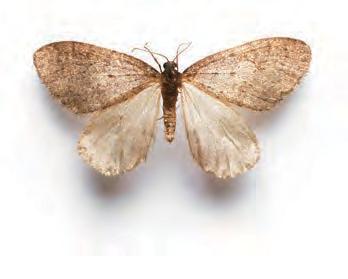
The winter moth is a mixed blessing—the caterpillars can be very destructive, defoliating entire fruit trees in spring. But then they are also are a vital food resource for nesting tits.

Keep a close eye out for waxwings this month. Before Christmas, these usually rare but utterly gorgeous birds will pour into the UK in their thousands.
The reason is simple: the berry and seed crop has largely failed all over Europe, so waxwings—along with many other migrants—have been flying to us to find food. There’s enough to go around initially, but once supplies in the countryside are used up, we may well find waxwings and other unusual birds coming to our parks and gardens in search of grub.
Waxwings are so called because of the glossy red tips to some of their wing feathers, which look like drips of old-fashioned sealing wax. Curiously, when they nest in summer, waxwings are almost totally insectivorous, acting like flycatchers and snapping their prey out of the sky. But in winter their diet and behaviour completely changes, becoming exclusively focused on berries.
Our gardens are becoming more and more important for berry eaters, but which of the trees and bushes we’ve planted are most used by— and useful to—visiting birds? The British Trust for Ornithology would love your help to find out. Visit bto.org/volunteer-surveys/gbw n
Martin Hughes-Games is a host of BBC2’s Springwatch and Autumnwatch


Get ready for the third industrial revolution: 3D printing




Last August, a 3D-printed racing car successfully competed on the Hockenheim race track in Germany. Nicknamed Areion after the immortal horse in Greek mythology, it reaches speeds of 60mph in four seconds. Despite early examples of “additive manufacturing” or “3D printing” in the 1980s, it’s now set to become a trillion-dollar industry, with a bit of fresh thinking. Experts are even heralding it as the third industrial revolution.
Thanks to open-source methods and whizzy technology, some have labelled it “the maker movement”—think digital tech meets DIY. These new advances mean we can all become designers, retailers and manufacturers at the same time, and Chris Anderson, long-time editor of US Wired magazine and head of 3D Robotics, even prophesises that it’ll have a bigger economic impact than the web.
Produced using special digital files or
Areion: fast on the track—and o the printer
scans, 3D objects—from clothing to cars, to musical instruments and even body parts—are “printed” in layers. The world’s first 3D-printer-created jaw transplant took place in 2011, and two-year-old arthrogryposis-disease-su erer Emma can now raise her arms thanks to a 3Dprinted exoskeleton.
With implants fitting perfectly, printing new bones and organs will soon become standard, reducing costs and time in surgery. At Glasgow University, researchers are developing the concept of “downloadable chemistry”, so anyone can “print” their own drugs at home.
At present, materials are limited— mainly plastics, resins and some metals —but results are bespoke, beautifully crafted, and can be ready in hours. Printers presently cost around £1,000, but prices are tumbling, so who knows—perhaps it’s one for your next Christmas list?
We’ve only seen a fraction of 3D printing’s gamechanging potential. I like the idea of us all creating our own 3D-printed stu at home, and I’m excited about how advances could transform industry. In the meantime, here are some of my favourite projects already underway. l Filmmaker Aardman usually uses clay to create characters, but in recent flick The Pirates! In An Adventure With Scientists, a 3D printer produced 8,000 body parts for puppets. Each one was hand-sculpted, with heads
Disney’s also creating 3Dprinted lighting for toys.
l MakieLab (makie.me) creates completely customisable action dolls. You design one—choosing eyes, nose, mouth, hair and even smile—and they print it. I made my own Makie—Blue Fox—earlier this year, and I’m lucky to chair the board of this smart company.
l MakerBot.com is a world leader in 3D printers priced and sized for a desktop. More than 13,000 are already in use, and thingiverse.com is stu ed with over 28,000 projects, models and ideas to download and print. Heading to New York? Drop in to the new MakerBot store to see printers and products in action.

l Shapeways.com lets you choose objects made out of plastic, glass, metal and other materials, and then prints and posts them.
Spam’s name derives from a Monty Python sketch about

a couple in a restaurant with a group of Vikings. Unsolicited or unwanted email, it makes up an amazing 90% of all emails sent, but with a little care there’s no need to let it bother you.
then 3D scanned, and split into sections. For mouths, animators took pre-recorded dialogue and selected sequences of digital mouth shapes.
l Firebox.com creates 3D-printed versions of your head, or personalised superhero action figures —choose from Superman, Wondergirl, Batman and more. Just upload a front and side shot of your face, and it’ll map your features to create a mini you.
Most is easy to spot —lots ask for money or personal info—and gets picked up in your “junk” folder. If not, use your common sense, report them and up your spam settings.
For more advice, see bbc.co.uk/webwise ■
Martha Lane Fox is the UK’s digital champion and chairs Go ON UK (go-on.co.uk)

Being just a car isn’t enough any more—you need to get funky!
Once, cars made us think of solid, dependable Vectras and Mondeos. But now a rash of smaller, sassy motors are turning our roads into a catwalk.
Car makers face a recession in Europe, stricter green legislation and crowded cities that make driving and parking a pain. Having a car can feel like a chore—people are exploring ways round it, so car makers are promoting a new kind of urban motoring.

Apple made us fall in love with gadgets in a new way, with a choice of colours and alternative covers allowing you to personalise your phone. The automotive reaction started with the new Mini. Launched in 2001, the solid-but-funky little city car was an instant hit. It was followed by the new Fiat 500, Citroën DS3 and Audi A1, not to mention an increasingly blinged Peugeot 208 and Ford Fiesta. The latest to join this hip little car set is Vauxhall’s Adam.
This is a big move for Vauxhall. The shadow of the tedious Vectra still looms large, and Vauxhall knows it’s late to the party. But it’s trying to make up for it by being the most fun. Adam is well-proportioned and wellequipped, and feels solid and premium inside. But its

party trick is personalisation—Adam has been structured so that no two cars need be the same. There’s an array of alternative colours for body, roof, wheels, stickers and more. And don’t forget interior options on the ceiling, dash, steering wheel...it goes on. You can even change multiple plastic slots on the wheel covers to make your own pattern. (It’s led to a battle between manufacturers as to how many thousands, or millions, of combinations they o er.)
The stand-out option for me is the interior headlining, which looks like clouds across a blue sky. That and the starry-night ceiling LEDs (see left) results in a car that starts to feel more plaything than functional motor. If you feel that way, then the Adam has done its job.
Volkswagen Golf Mk7 (from £16,285)

Twenty-nine million cars later, this latest version of VW’s astonishing Golf is leaner, greener, safer, flashier, better equipped, holds more and drives better. And it starts cheaper than the last one, too. VW really do look like they’re about to take over Planet Auto. The world’s best car just got even better.
Chrysler 300C (£35,995) I got me a go in one of these recently, and what a staggeringly strange experience Chrysler’s newly refreshed 300C is. There’s something inherently gangster about this massive and muscled American waft-mobile. The interior still isn’t German quality, but it’s a fabulous ride for good money (if you can handle the stares).

Jaguar Concept Speedboat (££fantasy)
You have your Jaguar, but what you really need to complete your life is a speedboat, right? To celebrate the launch of the lovely new Jaguar XF Sportbrake (a sporting estate), Jag designer Ian Callum has penned this aquatic flight of fancy. Potentially great golf-club one-upmanship, but not on sale any day soon.



What do women want from a car? It’s a question that’s taxed largely male car designers for years. The latest answer is the Honda Fit “She’s” special edition—a female cliche made flesh. Aside from pink detailing, the car o ers to make you more beautiful as you drive—the windscreen filters 99% of UV rays, and the “Plasmacluster” aircon promises to enhance skin tone. Designed for the 50% of Japanese women who opt not to work, it’s also available in “eyeliner brown”. Seriously. ■
Conor McNicholas is the former editor of BBC Top Gear Magazine
Visit any European capital and there’ll be art galleries, historic buildings, museums, and diverse food. But in which capital can you go skiing? And I don’t mean taking a coach out of the city to reach the slopes. I mean taking your skis on the metro, riding it to the terminus, and then skiing o into the forest.

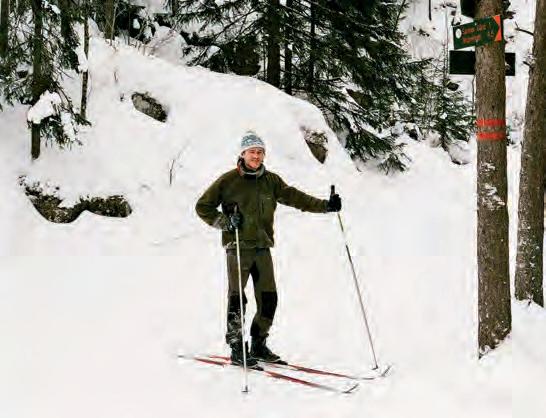
I’d never been cross-country skiing before, and hadn’t been downhill skiing properly since a school trip more than 25 years ago. But a weekend in Oslo last February proved both the perfect location and time (not too cold and before the school holidays) for a first taste.
On the first day, the contrasts with downhill skiing were immediately obvious: at a bus stop, I stood with my skis alongside not other skiers but people in city clothes heading to work. And compared with downhill ski kit, boots and skis are much lighter, so carrying them is no problem—I wandered around
department stores with my skis and no one batted an eyelid.
Directly outside the metro terminus in the northern suburb at Sognsvann, I put on my skis. The conditions were perfect: fresh snowfall the previous day; sunny; not too cold at minus 7C; and the path led gently down into the forest. I lost my balance pushing o , but soon steered my skis into the narrow grooves made by
Fly Gatwick–Oslo from £58 return (norwegian. no). Kieron stayed at Montebellow Guesthouse, which has doubles from £54 (+47 90 21 62 46; montebelloroom.com). For cross-country ski lessons at nearby Holmenkollen, try skikurs.no
ploughs for crosscountry skiers, which guide your skis easily. I knew I was doing OK once I’d stopped thinking about technique and was gliding along enjoying the views through the pines to the lake. The friend instructing me took us o the path to come out on the frozen lake of Sognsvannet itself, which for me redefined what tranquillity can be.
If you want to combine the serenity of crosscountry skiing with the cultural diversions of a city break, Oslo is hard to beat.
Send us a photo of your favourite holiday, tell us briefly what made it so special, and if we include it on this page we’ll pay you £70. See address on page 4.

In the Vaucluse region of France, tru e season is underway, with “black gold” set to mature in mid-January. Richerenches is a tiny village with France’s largest tru e market (Saturday) and tru e-omelette tasting for all. Or go to tru e-growerscum-b&b La Tru e du Ventoux near Carpentras—one night half board, including a guided tru e walk, from £240 for two (tru es-ventoux.com; provenceguide.co.uk).

York is a beautiful city at any time, and attractions such as Bettys Tea Rooms and the Minster aren’t weather-dependent. Take up the tourist board’s York Wrapped Up o er until March 28 (visityork.org/ wrappedup). Book two nights’ b&b and get a free dinner for two, shopping/restaurant discounts, and three-days-for-two on the savings-savvy York Card (book the Dean Court Hotel from £350 for two, for example).

One destination that’s really opening up this year is North Korea. Voyage Jules Verne (0845 166 7003; vjv.com) has a new nine-night tour from £2,295pp, flights included; Cox & Kings’ 12-night tour (0845 868 2596; coxandkings.co.uk) starts at £3,395pp, flights included; and Regent Holidays’ nine-day tour starts at £1,395pp, excluding UK/China flights (020 7666 1244; regent-holidays.co.uk).
expatsblog.com Visiting a place for the first time? Supplement your guide-book knowledge through this easy-to-use blogs portal, compiled by Brits abroad around the world. Search by country and location, and browse specific blogs for sightseeing, restaurant and transport tips. There’s also a forum search— still on the expats theme—for another way to tap into advice. A useful research tool for independent travellers. ■

From city-hopping river routes to ocean-going adventures, we’ve got a cruise to suit you
Think about cruising and your first thought may be of ocean-crossing super-ships. A cruise with Reader’s Digest Holidays however, o ers far more choice than that. How about smaller vessels, how about access to world-class ports, how about a hassle-free holiday with excellent service and enriching excursions? Find a taster of our cruise holidays in the 48-page brochure, free with this month’s magazine, or head to readersdigest.co.uk/holidays to discover the entire collection.
Thoughtfully crafted river cruises with Travelsphere take in European greats such as the Danube, the Rhine and the Dutch waterways.
Travelling on MS Serenade, a smaller, luxury river-cruiser means you can moor at the heart of destinations such as Cologne, Vienna, Budapest and Basel.

Alternatively, take to the seas on one of our small ship discovery cruises aboard MV Voyager – brought to you in association with Voyages of Discovery, or travel in style aboard Swan Hellenic’s MV Minerva – covering destinations as diverse as the Scottish Isles, Scandinavia and the Caribbean.
Whatever cruise you book, you’ll always get excellent value. Our range of pursepleasing discounts will kickstart your holiday plans for 2013. Discounted prices start at just £807 per person for a 9-day ocean cruise around Ireland and our January sale also o ers savings of up to £80 per couple on a river cruise.
Reader Alan Rice gives his verdict on river cruising, right. Book with us and not only will you benefit from our carefully selected partners’ years of experience, but also you’re guaranteed financial peace of mind, because our holidays are ABTA and ATOL protected. Now all you need to do is decide which of our cruise options floats your boat...

Alan and Florence Rice have been everywhere from Norway to Nuremberg on ocean and river cruises with Travelsphere. Alan says: “Our first cruise was an ocean trip to the Norwegian Fjords from and to Harwich in 2009: it was great not to fly and to only unpack once. The entertainment and food were excellent and it was wonderful to have so many of the travel company’s own sta on board. In 2010 we tried a river cruise for the first time, along the Rhine and Moselle. The ships are a lot smaller, more intimate, and you’re able to dock almost in the town centres, meaning you never have far to go once you’re ashore. We travelled on the MS Serenade - then, and again this year, on a cruise along the Danube: cabins on the two upper decks come with picture windows, and spacious en suites with baths and separate power showers, plus there’s a sun deck up top. There are not too many people on board and it’s a sociable way to travel.”

Save up to £80 per couple on Reader’s Digest river cruises



Save
For a full range of enticing holiday ideas and plenty of inspiration visit readersdigest.co.uk/holidays - you can save up to £160 per couple on a long haul escorted tour with Travelsphere.
To book
River cruises on MS SERENADE 1 call 0844 318 8142
Ocean cruises on MV VOYAGER call 0843 316 1665
Ocean cruises on MV MINERVA call 0843 316 1701
Lines are open Monday to Friday 9am-7pm, Saturday 9am-5pm, Sunday 10am-4pm.
Please note these great savings are only available on bookings made before 15 January 2013. Quote RDIGEST and your customer number when booking.

European itineraries on famous waterways such as the Rhine or Danube, taking you directly to waterside towns and cities.

Sail aboard small, intimate ships with our sister companies Voyages of Discovery and Swan Hellenic to destinations from Central America to the Aegean.


JANUARY FICTION
REVIEWED BY A N WILSON
EXTRACTS FROM OUR FAVOURITE NEW RELEASES
WHY STATE SECRETS AREN’T SO SECRET ANY MORE AND THE FIVE STAGES OF GRIEF:
ARE THEY A MYTH?
BOOKS THAT CHANGED
MY LIFE:
KATHY LETTE

This beautifully crafted psychological thriller really got under my skin. Liese is an English trainee architect who’s gone to Australia to escape the financial crisis in Britain. There, she works as an estate agent and becomes involved with the creepy Alexander who takes her out of Melbourne to see his beautiful farmhouse—and has also given her a huge wad
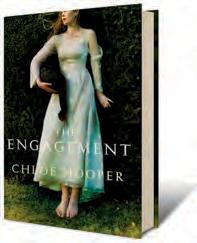
A N Wilson finds laughs, sadness and thrills in the best of the month’s fiction
of cash. So, is she a prostitute? Or is she acting as one in a series of fantasies that they’ve already been playing? Alexander’s gourmet cooking and love making are both done absolutely without feeling. Is he mad? Or is it Liese who’s concealing a crazed past? Hooper’s achievement is to make us frightened for Liese and, increasingly, frightened of her, too.
by Virginia Ironside (Quercus, £14.99)
If you missed No! I Don’t Want to Join a Bookclub
Virginia Ironside’s first set of diaries by the sixtysomething Marie Sharp—then this equally hilarious volume will send you straight to it. There

are sad moments, as when her only grandson is taken to live in New York, or her lover dies (although by then he’s forgotten her name). But most of the book will make you chuckle. Rightly is Marie called Sharp. She’s very funny about the people around her, and the book ripples with shrewd, comic observations of the way we live now. Anyone even approaching Marie’s age will find this a fine guide to growing old disgracefully.

You might be surprised to find this 1996 hit by Helen Fielding (left) appearing as a literary classic. Yet it’s here not just because it begins with a hilariously recognisable set of New Year’s resolutions, but because it’s a perfect comic novel, combining a great central character with some zinging satire. In short, it’s surely the 20th-century equivalent of the Grossmiths’ The Diary of a Nobody, starring Mr Pooter —a book continually in print (and continually enjoyed) since 1892.
If you flicked through the chapter headings in this book, you might imagine that it was set in the countryside in the time of Thomas Hardy: Michaelmas, Shrovetide, St Bartholomew’s Day. In fact, it takes place in brutal, modern Sarf London, not rural Wessex.

Hardy, mind you, would surely approve of the plot, in which an ill-treated, eight-year-old boy known as TC develops an interest in nature and forms a friendship with Jozef, an inconsolably lonely Polish
exile. But in modern Britain, their friendship, and indeed their lives, are doomed. The result is a gently-evoked urban tragedy—and the most powerful and original debut novel I’ve read for years.
Wool by Hugh Howey (Century, £9.99)Tens of thousands of people are imprisoned in a silo, buried deep in the earth, so they won’t be poisoned by the polluted atmosphere above ground. But the silo’s air can sustain only a limited number of people, which means that every time a baby is born, someone else must be killed...
You might consider this story as improbable as that of a man who publishes the first part of a novel on the internet, and becomes one of the best-selling science-fiction authors in the world. Yet that’s
exactly what happened to Hugh Howey. This printed version is the complete edition of Howey’s novel,
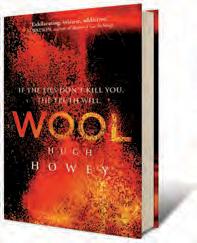
with each of the five parts finishing on a cli hanger. The narratives are exciting, and the characters…well, just interesting enough. I still haven’t worked out how the silo is supposed to work, and how the folks down there actually breathe. Still, I did end up wanting to follow whatever happens next in the saga—perhaps the biggest commercial hit so far to have started life as a self-published e-book.
QUIZ Can you name this person—whose latest volume of autobiography is out this month—from these clues. (And, of course, the fewer you need the better.)
1. When she was two, her father left her mother for Elizabeth Taylor.
2. The second film she appeared in was, from 1977 to 1983, the highest-grossing in history.
3. Paul Simon’s song “Hearts and Bones” was about his relationship with her. Answer on p148 ►

How the British Government has tried—and often failed—to keep us in the dark about traitors, spies and even its own triumphs

In 1945, Britain’s new Prime Minister Clement Attlee sent a stern directive to his colleagues. “No government can be successful,” it read, “which cannot keep its secrets.” In this, he was following a surprisingly recent tradition. Only in 1911, when panic about German spies was at its height, had Parliament passed the O cial Secrets Act—at a stroke transforming Britain from perhaps the most open of European countries to perhaps the most secretive. The story of how this policy unravelled over the next century is the subject of Christopher Moran’s authoritative but hugely readable book.
Unexpectedly, the first threat to o cial secrecy came from o cials—who, after the calamity of the First World War, published memoirs to justify their actions. One of the most controversial, from the 1930s, was by the wartime prime minister David Lloyd George—an account that turned General Haig from a national hero into somebody still thought of as a blood-stained butcher.
During the Cold War, the main secret-busters were, of course, journalists, whose increasingly fearless sleuthing revealed the extent of Russia’s infiltration of MI6. And from there, the story has largely been one of government retreat, bringing us up to the present day, when MI6 advertises jobs in the newspapers.
This retreat, though, has been gradual. Not until 1974, for example, did the Government allow the revelation of the wartime decoding activities at Bletchley Park. As a result, many Bletchley veterans died without even their families knowing of their heroics.
An academic by trade, Moran tells these stories, and plenty more, with a historian’s care, but also with a real flair for narrative—as you can see in this passage about one of the biggest scoops of them all. As the footnotes acknowledge, it relies less than usual on Moran’s original research, drawing largely on My Paper Chase by Harold Evans, the Sunday Times editor at the time.

RD EXCLUSIVE: CHRISTOPHER MORAN’S FIVE FAVOURITE SPY NOVELS
1 The Riddle of the Sands by Erskine Childers (1903). Two patriotic du ers, sailing on the North Sea, stumble on a German plot to invade Britain.
2 Casino Royale by Ian Fleming (1953). Former naval intelligence o cer Fleming introduces the world to secret agent James Bond, pitting him against the Benzedrinesni ng villain Le Chi re. ►
But it’s pretty jaw-dropping nevertheless. We join the action in 1967 with the paper’s Insight team poised to investigate one Kim Philby. At this stage, the British Government had admitted that Philby was a traitor who’d helped the spies Guy Burgess and Donald Maclean escape to Moscow, where he now lived himself. It had, however, kept his CV entirely under wraps, vaguely passing him o as a low-ranking diplomat…
No newspaper had ever embarked upon an investigation as expensive, far-ranging and detailed. The Insight team was made up of some of Fleet Street’s most bloody-minded, ambitious and talented reporters— Melvyn Bragg later described them as the ‘SAS of British journalism’. With practically no documentary evidence available, they interviewed hundreds of retired o cials. Veterans were tracked down by combing Who’s Who for the gnomic reference ‘attached Foreign O ce’, as well as tell-tale gaps in people’s employment history.
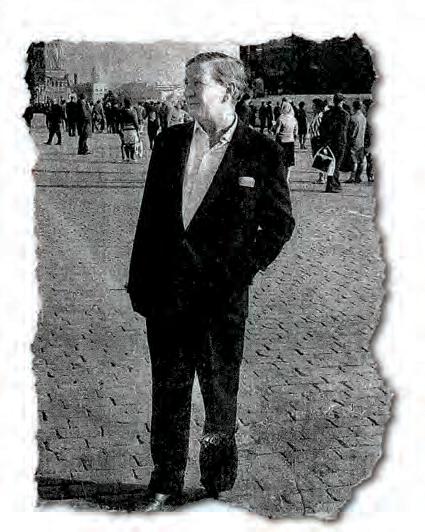
Kim Philby in Red Square in 1967: despite what the Government claimed, not a harmless low-level diplomat after all
The majority were incredibly guarded. Eventually, however, the interviewing process began to pay dividends. The team were struck by how many o cials let slip a loaded comment. [Foreign O ce Minister] Lord Chalfont remarked that Philby was a ‘dangerous man’ and that any further inquiries by the newspaper would ‘help the enemy’. Major General Stewart Menzies, the former head of MI6, stated in a letter: ‘What a blackguard Philby was.’ For characteristically tight-lipped men to feel compelled to say something gave the lie to the idea that Philby had been a harmless low-level diplomat.
The breakthrough arrived when the team was alerted to British Agent by ‘John Whitwell’. Published in 1966 by an independent London publisher, British Agent was the first memoir by an
Classified: Secrecy and the State in Modern Britain by Christopher Moran is published by Cambridge University Press at £25
intelligence o cer describing life in SIS [Secret Intelligence Service, or MI6] between the wars. The team soon discovered the person behind the pseudonym: Leslie Nicholson was an emaciated, alcoholic burnout, living in sheltered accommodation in London’s East End. Keen to exploit the man’s prodigious thirst for alcohol, Phillip Knightley of the Insight team arranged a lunch and plied him with drink. As hoped, the secrets started spilling out. ‘The reason for the flip-flap,’ Nicholson explained, ‘is that Kim was head of our anti-Soviet section.’
Knightley, light-headed from the brandy fumes, sought clarification: ‘Let me get this straight. The man running our secret operations against the Russians after 1944 was a Russian agent himself?’ ‘Precisely,’ confirmed his lunch companion. As head of SIS’s Soviet counter-intelligence directorate, Philby would have had access to the Service’s most prized secrets, including the identities of agents stationed abroad.
With Nicholson’s revelation, Denis Hamilton, chairman of Times Newspapers, gave the researchers unprecedented funds, a ording them the opportunity to scour the world for information. The team spent nearly a month in the United States, cultivating sources from the CIA, FBI and Department of Defense. Lyman Kirkpatrick, a former CIA Executive Director, confirmed that in 1949 Philby had been assigned to the British embassy in Washington as a liaison with the FBI and CIA, a highly sensitive position in which he would have been privy to most US intelligence operations.
With money to burn, the team pulled o a real coup when it paid for John Philby, Kim’s son, to travel to Moscow to interview his father. John not only secured an iconic photograph of Philby standing in Red Square [see previous page], but got from his exiled father the priceless detail that he had been a Soviet agent for the whole of his working life, dating back to 1933.

3 The Spy Who Came in from the Cold by John le Carré (1963). Setting the bar for intelligent spy fiction, le Carré’s yarn centres around a complex and deadly triple blu orchestrated by the British Secret Service against its enemies in East Germany.
4 Bloodmoney by David Ignatius (2011). With astonishing verisimilitude, Ignatius—a Washington Post columnist—serves up a classic raceagainst-time thriller, in which a Pakistani computer expert seeks revenge against the CIA after his family die in a US drone attack.
The answer was Carrie Fisher. (The film was, of course, Star Wars, whose grossing record was overtaken by E.T.) Fisher’s book Shockaholic is published by Simon & Schuster at £7.99. course, by


5 The Geneva Trap by Stella Rimington (2012). The former MI5 Director-General draws on her own past to produce a compelling and believable tale of an unknown enemy using cyber warfare to try to start a new Cold War.
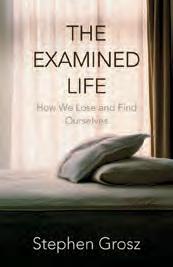
Despite today’s received wisdom, grief is not always something that can be fixed
In The Examined Life, psychoanalyst Stephen Grosz draws on a quarter of a century’s experience to present 31 case studies that are not just jargon-free, but written with real elegance and a strong sense of structure. As a result, several chapters read like powerful short stories, complete with a closing twist. Others are more inconclusive, but even then, in an often revelatory way.
And, while Grosz never forces the very di erent encounters between himself and his clients to fit a single theory, certain recurring themes do emerge, including the inevitability of loss and the importance of facing up to reality. (Many of the best chapters show him gradually identifying what his clients are trying to hide.)
Yet, for all his essentially kindly tone, and refusal to pretend that psychoanalysts have no problems of their own, the man is no pushover. In this section, for example—a more general one than many—he argues that one of the received wisdoms about grief might, in fact, be dangerously foolish…
Alice P began by telling me, ‘I haven’t felt myself for years. I don’t know how to pull myself out of it.’ She told me a bit about her family: her daughters, now in their twenties, had both done well. Then, towards the end of our consultation, Alice sat forward. She told me that 19 years earlier, her third child, Jack, had died unexpectedly. He was three months old. ‘It was a Friday— June 27—just after lunch. I fed Jack and put him down for his nap. When I came back he was dead.’
Alice described a passage from C S Lewis’s A Grief Observed, where Lewis fears that, bit by bit, he is losing the memory of his dead wife. ‘It’s not like that for me,’ Alice said, ‘I remember everything about Jack—the smell of his skin, his smile, everything.’ Keeping absolutely still she said, ‘A couple of days ago there was a dreadful news story about kids killed in a boating accident.

Stephen Grosz was born in Indiana and educated at Berkeley and Oxford. For the past 25 years he has worked as a psychoanalyst, also teaching at University College London. This is his first book
I thought, Jack’s safe from drowning. That’s crazy. I shouldn’t be thinking like that.’
Edmund K, aged 29, has been on antidepressants since he was 19, when his father committed suicide. ‘I shouldn’t have to be on them,’ he said. ‘But every time I start to come o , I’m back where I was then—angry with my dad for killing himself. It’s so stupid. I should’ve had closure years ago.’
What Alice and Edmund have in common is this: they su er more because they’re stuck on the idea of closure. They both expect to make progress, to move through certain stages of grief. And when they don’t, they feel there’s something wrong with them. They su er twice—first from grief and then from a tyranny of shoulds. This way of being leads to self-loathing, despair, depression.
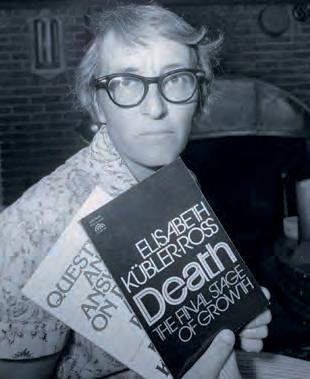
The notion of closure—of having finished with grief—has its roots in the work of Elisabeth Kübler-Ross. In the 1960s Kübler-Ross identified five psychological stages for terminally ill patients: denial, anger, bargaining, depression, and, finally, acceptance. About 25 years ago, she and many bereavement counsellors began to use these same stages to describe the experiences of both the dying and the grieving.
These people suffer more because they’re stuck on the idea of closure
I’ve long thought that Kübler-Ross was wrong. The stages of dying and grieving are wholly di erent. For the person who dies there is an end. The person who mourns goes on living and as long as he does, there is always the possibility of grief. Grief can ebb and then, without warning, resurge. The loss of a child, a loss through suicide—these losses, and many others, can and do cause enduring sorrow.
Nonetheless, closure is what the counselling trade tends to promise: your grief is something that can be fixed. You can recover. You can have closure.
My experience is that closure is an extraordinarily compelling fantasy of mourning. It is the fiction that we can do something to permanently end our sorrow. Closure is the false hope that we can deaden our living grief.
The Examined Life: How We Lose and Find Ourselves by Stephen Grosz is published by Chatto & Windus at £14.99

Best-selling Australian author and comedy writer Kathy Lette has written 11 novels, including Mad Cows and Dead Sexy. Her new short book Love is Blind is out next month—see quickreads.org.uk for details.

I left school at 16, so the only exam I’ve ever passed is my cervical smear test. I’m an autodidact (obviously that’s a word I taught myself). I read all the time and, while I adore those scintillating Brontë sisters and their works on lust, love and loss, it was Austen who made me want to be a writer.
Beneath her humorous veneer, Austen is a barbed commentator on the battle between the sexes. She realised that poetic justice is the only justice in the world, and set about impaling misogynistic enemies on the end of her pen. I only write myself because it’s cheaper than therapy, and writing humorously enables me comically to kneecap the pompous. But no one does that better than Austen.
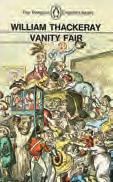
The social satire in this classic novel is so sharp it could shave your legs. Aged 16, I was thrilled by the heroine Becky Sharp. With tonguein-chic and lashings of chutzpah, she was the Madonna of her day, flaunting tradition and challenging sexual mores. But with no vote, no union, no fixed wage, no welfare and no contraception, what options were available to women? It was either prostitution or marriage— often a tautology in early 19th-century Britain. Becky had no choice but to climb the social ladder—lad by lad. The book showed me that a protagonist can be fabulously flawed...like me!

I grew up as a surfie girl in Australia. The men there disproved evolution—they were turning into apes. Women were merely handbags to be draped decoratively over their arms. Fellow Antipodean Greer’s witty 1970 polemic, calling for the end of oppression of women, showed me that a woman is more than a life-support system to a pair of breasts. Women are each other’s Wonderbras—uplifting, supportive, and making each other look bigger and better. ■

















* Entry is open only to residents of the UK, Channel Islands, Isle of Man and Republic of Ireland aged 18 or over. It is not open to employees of Vivat Direct Limited (t/a Reader’s Digest), its subsidiary companies and all other persons associated with the competition.


Put a nought (O) or a cross (X) in each cell so that there are no lines of three (OOOs or XXXs) in any direction.
Beginning with the highlighted letter, follow a continuous path to find 18 salad ingredients or types. The trail passes through each and every letter once and may twist up, down or sideways but never diagonally.

2. Suko Place the numbers 1 to 9 in the spaces, so that the number in each circle is equal to the sum of the four surrounding spaces, and each colour total is correct.

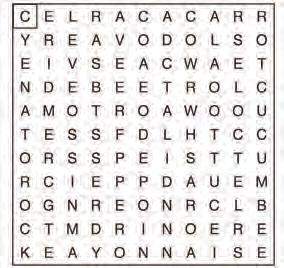


£50 prize question (answer will be published in the February issue)
Wordladder Change one letter at a time (but not the position of any letter) to make a new word—and move from the word at the top of the ladder to the word at the bottom using the exact number of rungs provided.

The first correct answer we pick on January 3 wins £50!* Email excerpts@ readersdigest.co.uk
Answer to December’s prize question:
One solution is: Sack, sank, bank, bans, bays, boys, toys
And the £50 goes to… Helen Power from Berkshire



WIN £70 FOR EVERY READER’S JOKE WE PUBLISH. EMAIL EXCERPTS@ READERSDIGEST.CO.UK OR GO TO FACEBOOK.COM/READERSDIGESTUK


¶ Q: What’s the smallest unit of time?
A: The interval between the tra c light changing to green and the taxi driver behind you honking his horn.
¶ My friends are on Twitter, but I don’t know how to use it. So I carry a megaphone to announce what I’m doing at random times. I shout, “I’m in a library to loan a book!” I now have three followers —two policemen, and one community support o cer. Byron Calloway, Newport
¶ It was the first day of the January sales; the crowd was huge and restless. A small man pushed his way to the front of the line, only to be pushed and punched back. On his second go, the same thing happened.
On his third try, he was knocked to the ground, kicked, and dumped once again at the back. “That does it,” he murmured. “If they hit me one more time, I won’t open the shop!” L B Weinstein, Florida, US



“I wrote this next song when I was four”






¶ A SHORT, SMALL-FRAMED MAN applies for a job as a forester. In order to check him out, the boss asks him to cut down an enormous tree. The man makes light work of it and, astonished, the boss asks, “Where did you learn to cut down trees like that?”
“In the Sahara.”
“But the Sahara’s a desert.”
“It is now.”
Stephen Gee, Chippenham¶ Give a man a fish and he’ll feed himself for a day. Leave him on his own while the football is on, and he’ll definitely watch it in his pants. TV producer Mark Augustyn, by Twitter
¶ It’s amazing to think that before the dictaphone, people had to use parrots to record their messages.
Twitter comedian Moose Allain
My new thesaurus is not only poor, it’s really poor. Very, very poor Comedian
Stephen Grant
¶ A lot of people cry when they chop onions. The trick is not to form an emotional bond.
¶ Did you hear that the Duracell Bunny was arrested? He was charged with battery.
¶ Q: What do you call an alligator in a vest?
A: An investigator.
All three seen on the internet
Seen on the internet

It’s never too late!
Do you love to tell a joke? Wind your mates up with mini-routines? Don’t confi ne your talents to the pub! We’re looking for a budding stand-up, aged 50 or over, to prove that it’s never too late to pursue a comedy career. To enter our competition, perform a short section (maximum two minutes) of your best material to video camera and upload your clip to YouTube. Send a link to your video to excerpts@readersdigest.co.uk by Friday, February 22. The funniest entry will be awarded £250! For full terms and conditions, visit readersdigest.co.uk/ magazine
The “People Who” blog was started by a mysterious anthropologist called Wireless G. He seems to spend most of his time irritated with humanity at large, using his site to poke fun at some of our most inexplicable foibles. We can empathise with one or two...
People who start sentences with the phrase, “I’m not racist, but...”
■ People who just stand there after getting o the escalator
People who dump you and then use photos you took together during your relationship for their online dating profile
■ People who try the locked bathroom door more than once
People whose voice...? Goes up...? At the end of every thought...? So everything they say sounds like a question...?
■ People who say, “Question!” before asking a question
People who think pressing lift buttons repeatedly makes the lift go faster
■ People who hold the door open for you when you’re still 20 yards away, forcing you into an awkward jog of gratitude
People who can’t enjoy the film because it wasn’t exactly the same as the book
■ People who say “correct” instead of “yes”

Helping with spreadsheets

Helping cat friend take a drink
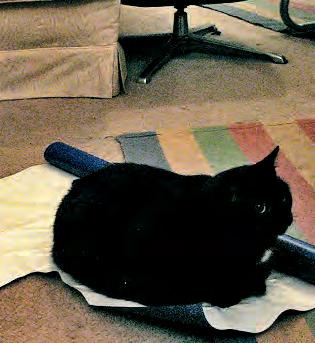
Just helping you wrap those gifts
They’re not in the way. They’re helping. Collated from the internet
Helping you finish your beer

¶ I used to be best mates with Derren Brown a few years ago. We started our own TV show and we had a contract to split the profits equally.
However, I soon decided to give up my part of the deal and pursue my hobby of milking yaks in central Asia. Seen on the internet
¶ I saw that show
50 Things to Do Before You Die
I would have thought that the obvious one was shout for help.
Comedian Jimmy Carr
¶ One Christmas Elisha Otis, the inventor of the elevator, popped in on my great grandfather. He gave everyone a huge lift.
Comedian Milton Jones
¶ Why are there loads of books asking you to find Wally, but none that tell you what it is he’s actually done?
Comedian Gary Delaney CR
Ladies and gentlemen, please welcome Sarah Kendall
FAVOURITE ONE-LINER?
A woman walks into a bar and asks for a double entendre. So the barman gives her one.
BEST JOKE YOU’VE EVER WRITTEN?
There’s a bit I like where I describe a rap music video that I’m pitching to MTV Base, treating the men in the music video the way women get treated in rap videos. So it’s basically me picking up four guys and taking them back to my to my penthouse suite, then getting them to perform obscene acts while I throw money all over them.

5–9
FUNNIEST THING THAT’S EVER HAPPENED TO YOU?
I was in Paris, on the Metro. My bag got caught in the ticket gates as they shut, and I couldn’t get it out. This lovely Parisian woman came over and started pushing my bag through the gate. It popped out, but then the gate closed on her head—the force was so strong that it broke her spectacles! (She was OK.)
FAVOURITE TV SHOW? Arrested Development and 30 Rock. They’re great ensemble casts—every member in both is hilarious, and the plot lines are great. 30 Rock has a political edge, and they manage to pop in some very sly jokes.

FINALLY, WHO’S YOUR COMEDY INSPIRATION?
I’ve always been a massive fan of funny women—family members included. My mum is hilarious, mostly unintentionally; she sometimes drops Eighties lingo in the middle of sentences without realising. So she’ll say, “I had a lovely salsa with my fish. It was delicious to the max!” ■
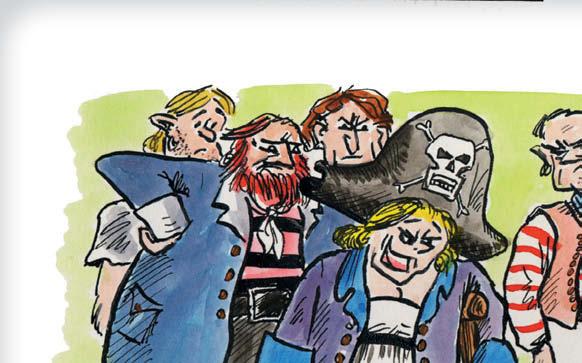

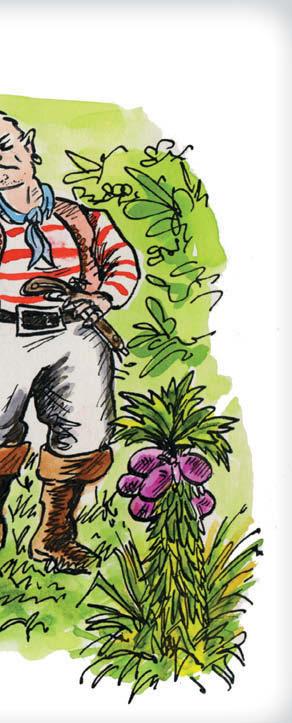
Think of a witty caption for this picture and you could beat the experts at their own game. The three best suggestions will be posted on our website in mid-January alongside an anonymous caption from our professional cartoonist. Visitors can choose their favourite—and if your entry gets the most votes, you’ll receive £100 and a framed copy of the drawing. Submit to captions@ readersdigest.co.uk or the address on page 4 by January 11. Enter and vote online at readersdigest.co.uk/caption. We’ll announce the winner in our March issue. ■
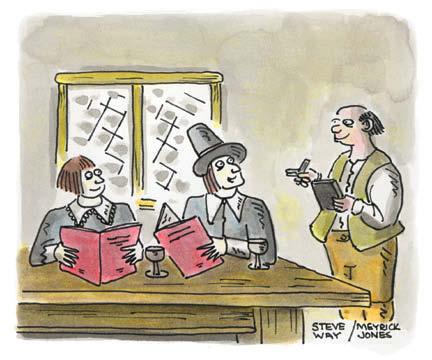
Just when you thought our readers had gained the upper hand, the cartoonists come storming back! Well, squeaking back, actually—Steve Way and Simon Meyrick Jones’s caption, “Well or Ditch?” “No, ditchwater is fine,” secured victory by just a single vote. It’s a setback, but we’re sure you can all rise to the challenge…


► Property or gold? Stock market or antiques? We reveal the top performers over 20 years
► How to boost your creativity —at any age
► How Alex Polizzi would rule the world
PLUS Your best holidays ever! Don’t miss our great ten-page real-life travel special







































